#The bridge! The two protagonists relating to each other
Text
Entropic Float 2 Demo and Kickstarter Launch!
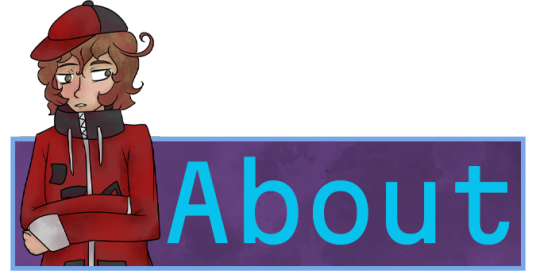
Picture a point-and-click adventure game. Now picture a branching, time-looping ontological mystery visual novel. Entropic Float 2 combines those into its gameplay concept: A point-and-click where you can never solve every puzzle at once. Where you have one key that fits two locks... And the only way to see what's behind the lock you didn't choose is to die, repeat the day, and try something different this time. With only you and your protagonist aware of the loop, seek an answer that earns new information. Through trial and error, solutions and murder... Can you find the way through this new Anomaly?
In early 2021, I started working on a project just for fun. Using the character creator and scene assembly tools of Illusion's Koikatsu, paired with the visual novel engine ren'py, I decided to learn to make a VN. A year and a half, over three hundred thousand words, and quite a bit of pocket money later, I released 'Entropic Float: This World Will Decay And Disappear' for free on steam and itch.io.
Something that was never meant to be more than a fun exploration of a concept grew into a huge endeavor for me, a visual novel as long as any two Umineko episodes combined! I got guest artists, made plenty of art myself, and learned a lot more about coding in ren'py than I ever thought I would. After releasing the game, my friends were proud of me, and I've heard from a lot of people it connected with. It became the basis of what I want to keep doing creatively- Expanding on this world, telling its story, and finding those people it will resonate with.
That brings us to Entropic Float 2: Land Of The Witch. A sequel I've been planning since the first game released a little over a year ago now. It's a game that can't be free (though if you, for any reason, cannot purchase it- I care more about sharing it than I do about making money) and a game I want to create to that standard. There won't be assets made in a character creator or royalty free music this time. I hope to bring the Pine Creek Anomaly to the screen with my own two hands, and a little bit of help from freelancers. I want to make a point-and-click adventure worth paying fifteen dollars for, an artistic experience that constitutes a huge step up from the first game.

A demo is available to download and play from itch.io! Features already reflected in the demo include:
The general structure of the point-and-click gameplay; including travel between maps, item collection and use, and conversations with other characters.
Hand-drawn backgrounds (with minor animations) and talksprites.
Profile screens for each character and a memory-seeking system improved from the first game. Also improved from the first game is exposition being mainly in a linear-locked part of the story so it doesn't need to be repeated in different places so different players don't get confused!
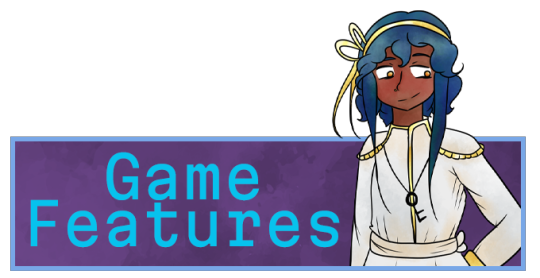
Planned features yet to be implemented include:
Loop Randomization- The demo includes only the very first loop of the story, but in the actual timelooping gameplay, many factors will be randomized between loops. Characters and items will appear and disappear, characters will have different trustworthiness scores, and eventually, the weather will even change and impact puzzles and character behaviors.
Zones- Minigame areas that abstractly inform you more about a character and are locked behind obtaining certain profile notes and memories. The rewards for completing zones will be tools to access additional areas, such as Area 2 waiting beyond the broken bridge.
Characters- Several of EF2's characters don't appear yet in the demo, due to having their introductions tied to maps that aren't accessible in Area 1.
General Improvements- Characters currently only have one talksprite. The preferences page is still in the ren'py default configuration. Some music tracks recycled from the first game aren't the best fit for the situation. These are all things that relate to the current version being a demo. These are all things that will improve sooner if this kickstarter is a success.

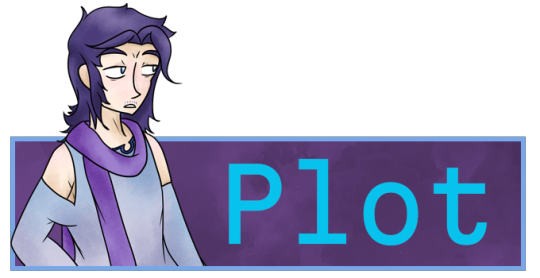
Shortly after handling the Anomalous Clocktower in the Black Rock Desert, Kanatsune Ame was promoted. Now, as an agent of the Wish Task Force at a rank equipped to handle more complex Anomalies, he's received an assignment for another one above his pay grade. Pine Creek, an entire town that was wiped from the map and from all memory several years ago, only to suddenly begin dragging new victims inside within the last few months... Somebody inside this forgotten piece of miserable Americana decided to call out to the world that left it behind, and it's up to you to find out who that could be.
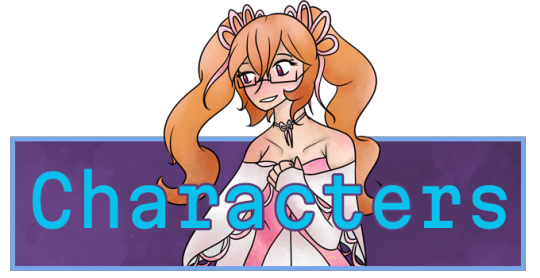
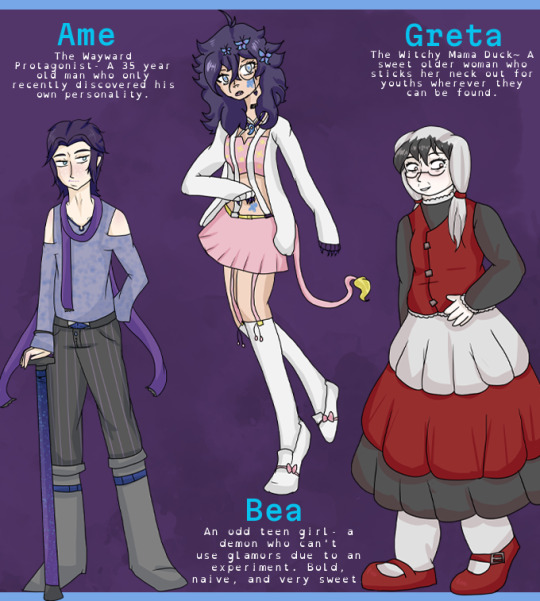
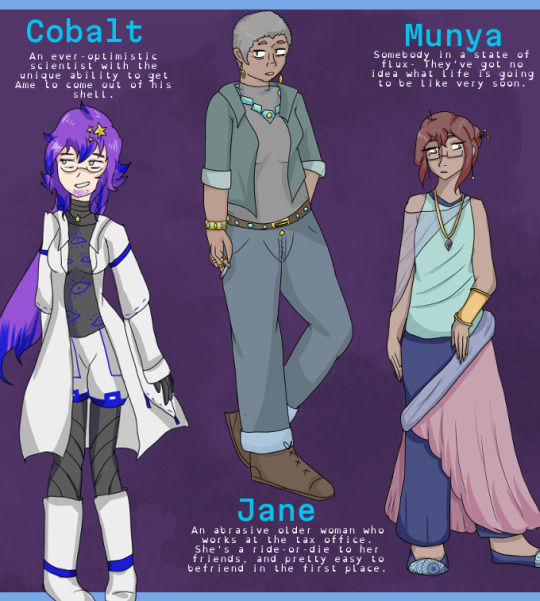
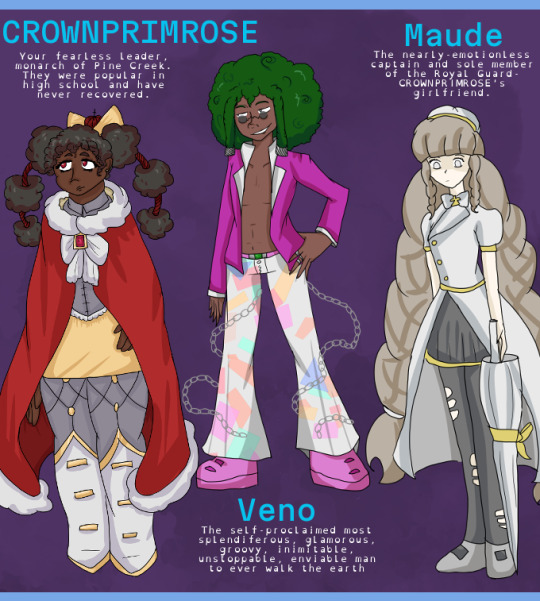
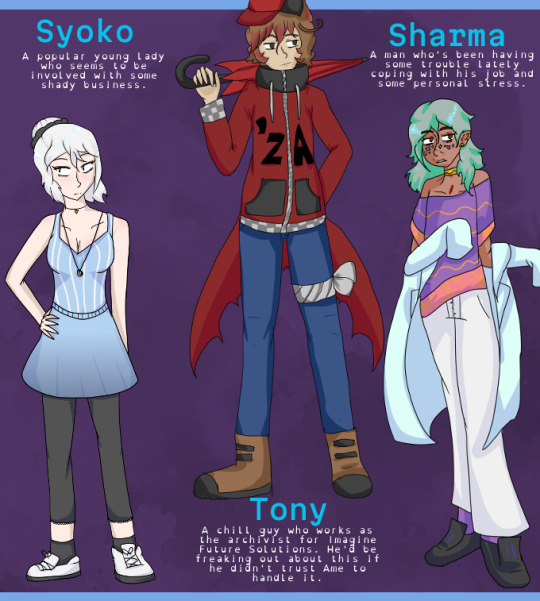
Thank you, as always, for reading!
#entropic float#visual novel#official content#visual novel gamedev#gamedev#indie games#indie gamedev#vndev#entropic float 2: land of the witch#kickstarter#crowdfunding
76 notes
·
View notes
Text
The 9th House Experience Pt.1:
(Come Share My World)
Case Study: Celine
“If there's any kind of magic in this world it must be in the attempt of understanding someone sharing something.” - Celine
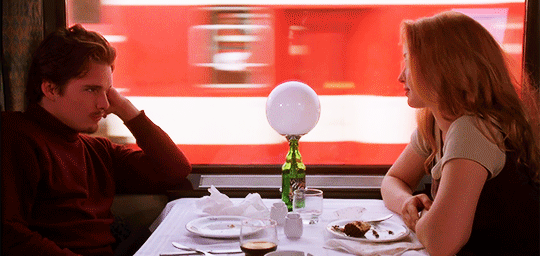
The 9th house is a very interesting house in astrology, sitting between the famous 8th House with its notoriously dark themes of the occult, transformation, ups and downs, death and the depths of sex and the 10th house, the final angular house that is representative of themes such as career, reputation, society and fame. Being wedged in between two extremely popular houses in astrology discourse, often times I find some of the depth of it slips between the cracks, in many ways like the 4th house being relegated strictly to “lighter” topics such as travel, religion and higher-learning. But being the bridge between the murky swamp that is the 8th house and the towering highs of the 10th house, its importance and depth cannot be understated.
The 9th house takes us out of our comfort zone, without it we would never open up and face our fears, and without facing our fears our dreams would never come true.
And most of all the 9th house is where we share ourselves with the world and the world shares itself with us.

Without the 9th house all of our experiences up to the 8th house would be kept solely between our immediate circles and ourselves.
The 9th house is the bridge between our personal worlds and the world at large
In many ways I assume why, in comparison to my first two house and character case studies (Rose DeWitt Bukater from Titanic and the 8th House and Lilo Pelikai from Lilo and Stitch and the 4th House respectively) this is my first case study done on a character that I did not grow up identifying with and loving and a movie that I did not watch until I already familiar with astrology and the same age as the character i’m writing about. But the minute I first finished watching it, the first thing that came to my mind was the 9th house, and the first character to relate it to came from the female protagonist I initially misjudged (a result of my own inexperience with people of other cultures) but came to become a reflection of my own soul.
A soul that is adamant on getting out into the world and letting the world, or at least one small piece of it, back into hers.
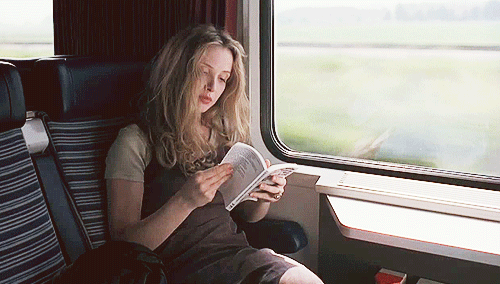
From the very beginning Before Sunrise seems to personify themes of the 9th house, opening with the main characters Celine and Jesse reading books on a train while another couple argues in a foreign language. After Jesse asks if she was able to translate what the couple was arguing about, Celine immediately presents him with a theory of of married couples losing their sense of hearing for each other, which could possibly be the reasoning for the couples’ argument. It is not the first and far from the only time in the movie where Celine expands upon abstract concepts, theories and ideas as an explanation for the world, fitting considering the 9th House rules philosophy.

In the next scene where they move to the dining car, we not only learn that she is traveling back home to Paris to continue her studies (the 9th House representing higher education) but we also get insights into her personality. She expresses her feelings towards her family and father, stating that in her passions to be a number of things (a writer, open a refuge for stray cats etc.) that can be considered abstract (the 9th house representing abstract concepts and ideas) have always been conceptualized into realism by her father who suggests more concrete career fields (a journalist, or veterinarian etc.) for her (the 10th house being 2 spaces from the 9th house, speaking to the tendency of 9th housers to feel forced to put turn their often abstract ideas and aspirations into resourceful, solid, concrete things, or in her words “practical, money making ventures” relative to the sign of Capricorn and the 10th House).
In deeper conversation with Jesse exploring their opinions on death, she admits that despite being a frequent traveller she is “afraid of death 24 hours a day,” (fitting considering the 8th house of death is 12 spaces away from the 9th house, the 12th house being symbolic of fears). In fact, her fear of death is the reason she is on the train in the first place as she could have easily flown to Paris. Despite her fears and the fact that even he acknowledges she could be a a psycho, she accepts Jesse’s invitation to accompany him in an impromptu day-tour of Vienna as the fear of missing out ultimately conquers her fear of death, as it does with many 9th housers.
The excitement of sharing the day with Jesse overtakes her fear of the unknown.
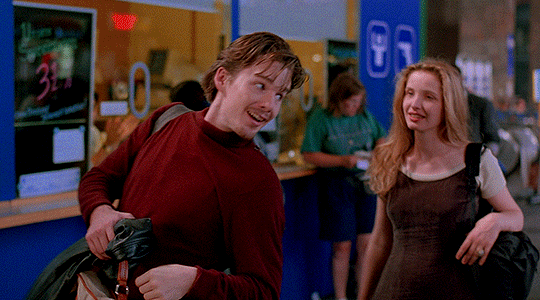
Her adventures with Jesse finally lead them out into Vienna, first taking a bus where where Jesse insists on them having a “Q&A” with each other as they have already gone over introductions. After describing the subject of her first sexual feelings of course abstractly as a “dolphin”, she goes on to answer what she hates. She mentions that she hates men on the street telling her to smile, the lack of concern about war rampaging through cities and towns all around them, the attempts of the media to control the masses, describing it as a “new form of fascism” and she hates the French stereotype being infringed upon her (particularly by Americans) for seemingly normal behavior.
In just that short sequence we are able to see two key 9th house themes in her personality, a concern for the world over especially war (Sagittarius being the sign of war) and her dislike of attempting to be controlled and defined. While 8th housers fight for self-control, control over their emotions and environments, 9th housers fight against control and for self-determination, self-definition. And in that they fight for others, they embrace conflict if it is for the truth as it is she admits it is perhaps her primary usage of her higher education when she says “maybe that’s why I’m still in school, it gives you something to fight about.” Something to be angry about.
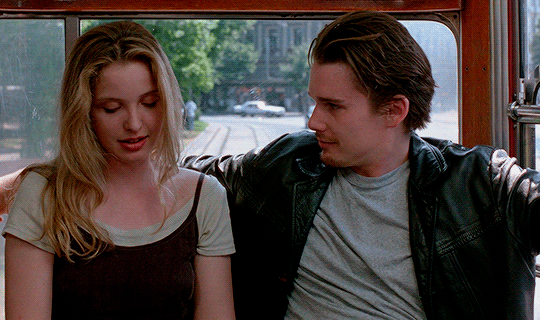
Her fear of death and penchant for self-definition also comes up when she takes Jesse to one of her favorite places she remembers from the last time she visited Vienna, the “Cemetery of the Unknown” made up deceased people that washed up from the sea a century ago. In it, she is especially drawn to the grave of a thirteen year old girl, the same age she was when she first discovered the grave. She says that with a death in which none of your family or friends knew you died “People can invent the best and the worst for you.” The 9th house, coming right after the 8th house of death. exemplifies that death can be a gateway to stories, journeys, even post-mortem.
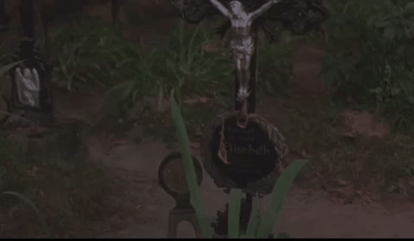
Beyond death, especially compared to Jesse, Celine is a believer.
Most of all, she is a believer in things that aren’t obvious, things that can’t be seen with the naked eye, things that aren’t spelled out easily and that can unfortunately be lost in translation very easily to those who aren’t able to read between the lines and beneath the surface very well.
Many of her beliefs in the movie can be seen directly through 9th house themes, the book she was reading at the beginning (the 9th house being the house of publishing), dissecting and assessing the arguments of foreigners (the 9th house representing foreign people and things). When night time falls her beliefs are expressed through even more 9th house themes. First it is seen by a palm reader who observes that she is “an adventurer, a seeker, she is interested in the power of the woman. In the woman’s deep strength and creativity.” Even despite Jesse’s mocking and continuous skepticism, she finds truth in what the palm reader said.
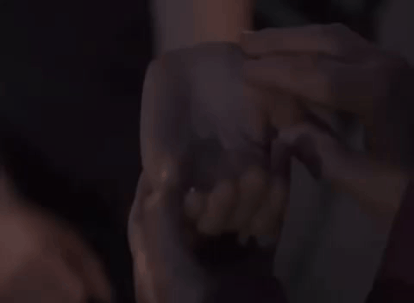
Although she is a believer we find that it can easily be turned around as like many 9th housers she is very easily believed, even when she doesn’t intend to be. In a late-night grunge bar she tells Jesse about her most recent breakup. After the breakup she told her psychiatrist or “shrink” a fictional story she wrote about a woman killing her ex-boyfriend. It turns out that the shrink actually called the police on her because something about the way she presented it made it seem so “believable”, that she was a “homicidal maniac”.
Being a believer and the power of belief can work both in the 9th houser’s favor and against them just as easily.
Finally beyond being an adventurer, a warrior and a dreamer, she is a sharer. She believes in sharing herself with the world and other people sharing themselves with her and each other.

On a surface level this earns 9th housers the reputation of promiscuity under the guise of sharing your body with others. But as with many things with the 9th house, we see that this has depth far beyond the physical as one of the only suspicions Celine does admit to is that feminism was invented by men so that “they could fool around more, free your mind, free your body, sleep with me, you’ll be happy and free as long as I can fuck as much as I want.”
She is a sexual being but her penchant for sharing goes far beyond the physical.
She tells of her love for dancing as a community function in life and something everyone can participate in. In a cathedral (the 9th house coincidentally ruling houses of worship and spiritual places), she admits that although she isn’t very religious she “can’t help but feel for the people coming there lost or in pain, guilt and shame looking for some sort of answer,” and that it is “fascinating how one thing can join so much pain and happiness, so many generations.” The bridge between the 8th and 9th house is articulated perfectly.
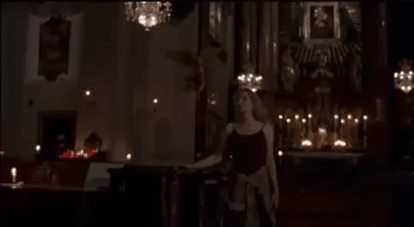
In another scene, in contrast to Jesse’s apprehension to mundanely wasting an entire life on romance, she tells the story of a old man she knew that had “worked and focused on his career his entire life and then at the age of 52 realized how lonely he was, he realized he had never given anything of himself,” another great example of the 9th house being in the blindspot of the 10th house of career.
In the 9th House both pain and pleasure, in all of their forms, are shared as crucial parts of the human experience.
Our individual tales of the human experience are meant to be shared.
In one of her most famous quotes from the movie, Celine says
“If there's any kind of magic in this world it must be in the attempt of understanding someone sharing something.”
Dreams are meant to be shared.
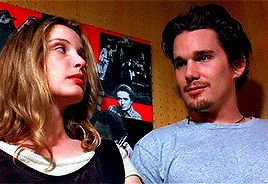
And in one of the final scenes, when dawn has broken and she and Jesse share some of their last moments together before heading back to the train station where she departs, she tells her lover of their short time together,
“Its like our time together is just ours, its like I’m in your dream and you’re in mine.”
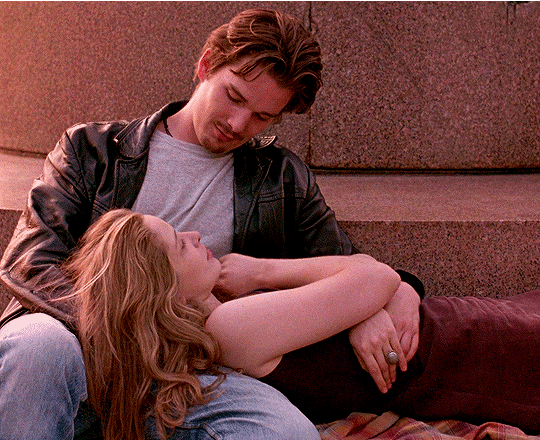
Through various conflicts, adventures, dreams and the many ups and downs of the human experience, in the 9th house we become believers and sharers, we share our world and we invite others to to share their world with us.
The 9th house is where “others” become “us” and the power of “us” can take you around the world in a day.
9th housers are warriors, dreamers, believers, adventurers and sharers, you fill in the spaces between us where God exists, where at its lows, hatred exists and at its best, love exists.
As in the words of Celine herself,
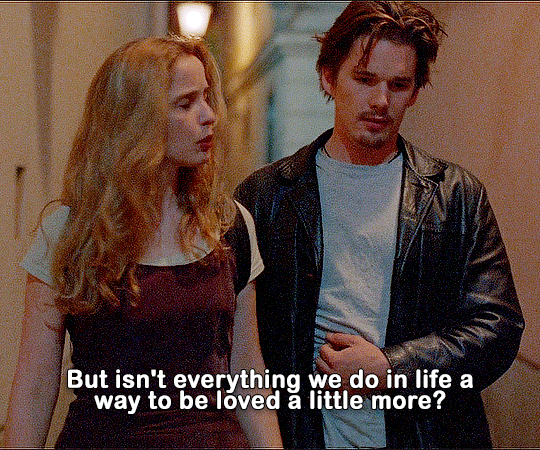
So here's to fights, friends, lovers, adventures, tragedies, fears, dreams, finding a reason to love and show love even more.
And most of all here is to sharing our worlds.
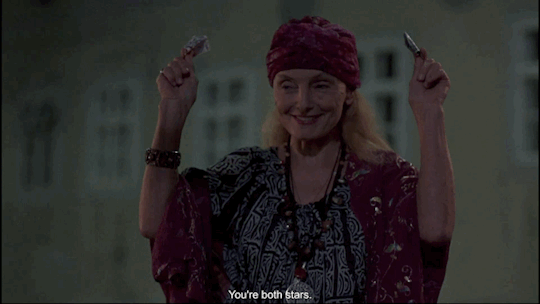
Signed, The Divine Erotic (9th House Venus)
#before sunrise#celine#jesse#character analysis#film analysis#astrology#sidereal astrology#vedic astrology#9th house#9th house venus#9th house placements
67 notes
·
View notes
Text
Essay: Post-Holidays, I see my Uncle's "Strange New Girls" Hate Watch in a Whole New Light.
No that is not a typo, that is actually what he calls SNW. And my macho-loving Kirk-fanboi of an uncle has been hate watching it religiously. The last time he hated a Star Trek show (DIS) he just didn't watch it. So this opposite response to SNW fascinates me. He talks big talk about there being too many women on the Bridge and hates on La'an with a particular vehemence, both because she's permitted in Starfleet despite a direct relation to the augments' leader and because she's a tiny lady running security. (I can't separate the more reasonable perspective from the sexist one, the man is both.)
At first I took his persistent critiques of the SNW crew as a very straightforward anti-women enmity, until Christmas when he came out with the following bomb-shell.
"We just watched Voyager, you know Janeway: Janeway is alright. She's a good captain."
(Color me shocked we had rage-inducing debates about this in my teens and early twenties)
On the one hand, perhaps my uncle has gotten slightly less sexist towards a female captain over the last 30 years? Doubtful considering the way he layers personal criticisms on the female SNW characters.
But on the other, him now enjoying Janeway's show does make me understand his hate and fascination with SNW. It's not about the women on the Bridge at all.
It's about Pike.
I'm sure there are other factors. Janeway's main Bridge crew was almost entirely male. And Voyager was written to try not to offend the sensibilities of men like my uncle (an effort that hasn't worked on him until now). But I also think it's got a lot to do with the two captains' presence on the Bridge, and how each captain is portrayed in their own show.
Janeway makes many more aggressive command choices than Pike, by virtue of personality and situation. Sometimes she makes those choices even against the reservations of male subordinates. She stares down the barrel of death on numerous occasions, unblinking. She's often the protagonist in her own show. She changes the timeline to influence her past self and encourages her to make a daring and selfish choice that is applauded and shown to pay off in a big way.
And notably, while she's the first woman to have center stage in the captain's seat, her femininity and portrayal of gender is what I think is best described as micro-managed (One need only look at the dizzying array of styles the show experiments with for her hairdo). She dresses in a very feminine way off duty, but often displays more "masculine" behaviors, especially on duty. She very rarely cries. Outside of expressing anger, flirtation, and curiosity, she is not often overtly emotional. A special note for flirtation: she gets wide license to be flirtatious with everyone from enemy combatants to her senior staff to even her ship when she's trying to sweet talk it. She avoids talking about her feelings at all costs. She can't cook and that's a running joke. In all the ways that matter, she acts like one would expect a traditionally male captain to act, with just enough feminine concessions sprinkled in to keep her from coming off as "too masculine."
Pike is very diplomatic and much more rule-conscious. He's Starfleet's boy scout. He takes a back seat in many episodes as other characters get to shine. When he is center stage the conflicts he combats are very personal. He stares down the barrel of "death" (as he's referred to his future disability) and flinches. His trip to change time is done to tell his past self to step aside, act selflessly and take a back seat to a fate that terrifies him. He often listens to and makes decisions that align with his (largely female) Bridge crew's recommendations. And while he dresses in a traditionally masculine way on and off duty, emotionally, he's shown to be much more traditionally feminine. He cries over a dead horse (My uncle was particularly aghast at that). He cooks and is shown to take pleasure in it, even using it as a tool of diplomacy. He is a sympathetic counseling ear for many of his crew.
He does not get to flirt with his Bridge crew. When he is shown expressing sexual interest in someone it leads to emotional hurt and command weakness (in Lift Us Up Where Suffering Cannot Reach, he becomes aware of his love-interest's abhorrent ethics only after watching her participate in something horrific, which he is helpless to stop. And when Batel gets into trouble with the Gorn in Hegemony, his fixation on her well-being comes off as somewhat short-sighted, and contributes to command paralysis in the final scene). His very close friendship with Una may border on romantic attachment, but there's nothing sexual about their on screen interactions. And his quest to have her accepted by the Federation is one of the only major emotional decisions he undertakes that is shown to have a majorly positive outcome.
In sum I think Pike is shown to be vulnerable, gentle, and craving of connections in a way that is very human, but one that men are not traditionally supposed to be. The themes of his arc center on standing aside for the benefit of others, accepting future loss of ability and death, making peace with a future that doesn't center around you - all messages about moving from selfishness to selflessness. His lack of sexual incentives and behaviors stands out distinctly from how male protagonists typically get portrayed. He's basically anathema to the masculine ideal my uncle's spent his life trying to embody.
I still don't know what reason drives my uncle to keep watching "Strange New Girls" as religiously as he has. But I do now see his fixation on finding fault with all the women on the Bridge differently. By critiquing them, he is deflecting attention from his discomfort with the man in the center seat.
#personal#pike and masculinity#i continue to be fascinated by uncle's hate watch#i will generously leave his hate for the musical episode out of this analysis.#I suspect he might like Batel more than Pike as a captain if I asked him#It should come as no surprise that he also persists in willful blindness to the presence of K/S in TOS fandom
21 notes
·
View notes
Text

Interpersonal Aftermath, Ben and Patrick Edition
Previously, we talked about the medical and legal and archeological aftermath of Trinity Church. And it was fun! We debated who knows the best lawyer, and the most promising method for drying out the Declaration of Independence.
But now it’s time for the really juicy character stuff—the interpersonal fallout. National Treasure leaves us with four main characters who are now inextricably intertwined in each others’ lives. We know from the final ‘Three months later’ scene how some of these relationships panned out, but even without that, it’s clear that these people have been permanently changed by their adventure. (As any good adventure should do.)
There are two things this article is not going to be about!
It’s not going to be about character arcs, that is, the internal change each character underwent individually as a result of the narrative. Those are topics for another time. (Except for when I say so.)
Aaaaand…this is not going to be about Book of Secrets. (Me, ragging on BoS? Shocking I know. But hear me out!) BoS falls into the all-too-common sequel pitfall of resetting some of the character growth from the first movie in order to tell the same story again. In light of that I don’t think it’s a particularly reliable indicator of how these dynamics would have actually evolved after the events of National Treasure.
Since Ben is our protagonist, he’s positioned in the center of the three other main characters and in relation to all of them (and also Ian and Sadusky, but we’re mainly focusing on the quartet here).
Let's take each pairing one by one and see how they might develop.
Ben and Patrick
Ben’s relationship with his father is pretty central to the entire narrative. The plot could exist without Patrick, but the story of Ben fulfilling their six-generations-long quest wouldn’t function without Patrick as the naysayers who’s been around this block (or John, the now-gone mentor who always believed).
Therefore, a substantial amount of screen time is devoted to their dynamic, and the evolution of their relationship is clear. Over the course of the treasure hunt they go from years of estrangement to reluctant allies to actual allies. Patrick sees that Ben was right about the treasure, and is the first to offer support for his son when the find the empty treasure room. He's the first one to offer to help Ben keep searching, and I personally love this moment. Patrick has gotten what he's wanted for years: for Ben to wake up and realize that he'll never find the treasure. But after everything they've been through after being thrown back into each other's lives, Patrick doesn't want that anymore.
But what happens after that? The Gates boys have been through a lot together over the course of the hunt, but they still have years of damage to repair. Depending on when you think they stopped speaking, Patrick might not know Ben as an adult, and Ben may not have ever really known his father, as young people often don't. Just because they’ve reached an understanding on the whole “you’ve wasted your life on a fool’s errand” matter doesn’t mean the rest of their relationship is instantly repaired. Without the treasure hunt and a literal hostage situation to bring them together, I imagine there are plenty of awkward silences and false starts the next few times Ben and Patrick spend time together.
However, I think they would start spending more time together. Even if it’s forced and awkward at first. The major obstacle that’s been keeping them apart has been resolved (in spectacular fashion). Neither of them has anyone else whom they’re close to, at least not that we see. So this dynamic is about rebuilding bridges that were once burned.
If fact, we just explored what their first post-estrangement Christmas might have been like, and it covers a lot of the same themes: it's awkward until it isn't.
Maybe Ben helps Patrick with some stuff around the house (despite Patrick’s insistence that he’s got it handled.) Ben tries to take an interest in his father’s post-treasure hunting interests. Based on the decor in his house, Patrick is clearly still quite the history buff, so on that subject at least they have common ground. Patrick might not be interested in the splendor of the treasure—I don’t see him being particularly invested in the private jet situation the way Riley is—but he’s beyond proud to tell the story of the Gates family, especially to an audience who, for the first time, cares to hear it.
And after all of the “How’s the treasure cataloguing going?” “When’s the next opening?” “Remember that time when..?” they get to start building a new relationship based on the men they are now, not as the naive kid and embittered wash-up they parted as. And I think that’s pretty neat.
#the national treasure gazette#national treasure#ben gates#patrick gates#I'm trying out shorter articles for a bit; let's see how it goes
7 notes
·
View notes
Text
April 28th: Biological Clock Day
Sci-Fi: In a future world, people can manipulate their biological clock to enhance their productivity, but there's a dark secret behind this technology. Write a story about a protagonist who begins to unravel the truth, discovering the cost of sacrificing natural sleep.
Mystery: A private investigator with chronic insomnia becomes obsessed with solving a series of mysterious sleep-related crimes. As their own sleeplessness worsens, they inch closer to the truth. Will they solve the case before it's too late?
Historical Fiction: Set during the 17th century, explore the practice of segmented sleep. Follow a character who seeks to preserve traditional sleep patterns amid societal pressure to conform to the changing norms of continuous sleep.
Horror: In a remote, sleep-deprived town, residents experience sleep paralysis and share disturbingly similar dreams. Write a chilling tale about the community's efforts to break free from this haunting collective nightmare.
Romantic Comedy: Two people with opposite circadian rhythms find themselves sharing an apartment. Hilarity ensues as they try to compromise on their sleeping habits and adapt to each other's schedules while navigating an unexpected romance.
Fantasy: In a world where dreams and reality intertwine, a character discovers the power to manipulate others' dreams but risks their own sanity in the process. Explore the consequences of tampering with the boundaries between sleep and wakefulness.
Dystopian: Write a story set in a bleak future where the government controls citizens' sleep patterns. A rebel group forms to defy these oppressive measures and regain their freedom to sleep naturally.
Young Adult: A teenager experiences insomnia during a pivotal summer. As they navigate sleepless nights, they forge a deeper connection with a neighbor. Explore the themes of friendship, growth, and the significance of sleep in their journey to adulthood.
Historical Romance: Set in the 19th century, follow a romance between two individuals separated by time zones. They exchange letters and dreams, using a mutual love for stars and the night sky as a bridge between their different circadian rhythms.
Adventure: An explorer embarks on a quest to find a legendary flower said to grant those who find it the ability to forego sleep. As they journey through treacherous lands, they must decide whether the sacrifice is worth the prize.
Psychological Thriller: A character starts receiving cryptic messages in their sleep. These messages lead them on a surreal journey through their own subconscious, uncovering hidden truths and facing their deepest fears.
Contemporary: Write about a person who works night shifts in a quiet, small-town diner. Through the relationships they build with customers and the observations they make during the odd hours, explore the unique charm of life during the night.
Alternate History: Imagine a world where humanity evolved with segmented sleep cycles. Detail the impact on society, daily routines, and how technology and work patterns differ from our reality.
Science Fiction: In the future, humans develop a pill that allows them to go without sleep. Write a story about a character who decides to take the pill, experiencing the wild side effects, including absurd dreams and bizarre encounters.
Journaling: Write about your own circadian rhythm. Are you a night owl or an early bird? How does your natural sleep pattern affect your daily life, and do you embrace it or try to change it?
Journaling: Reflect on a time when you sacrificed sleep for a particular purpose. What motivated you to make that sacrifice, and how did it impact your overall well-being and productivity?
0 notes
Text
Review: The Love Ways new single ‘I’ll See You When’ embodies gritty alt-rock, emphatic indie riffs and an open-ended narrative to unpack

Beginning as a five-piece and crumbling to the ashes of a duo during the pandemic’s fury, the rising phoenix that is The Love Ways find themselves influenced by acts like The Killers, Japandroids, Jimmy Eat World and The Walkmen. With many pre-pandemic tours under their belts, the pair have now turned their efforts to creating in the studio, eager to offer fans a new slice of what the band have to offer. Their most recent singles do this exceptionally, and now gracing everybody with their latest ‘I’ll See You When’ the two-piece are ready to kick back into action and strike while the iron is hot.
A harsh wall of sound hits you right from pressing play on ‘I’ll See You When’ , serving a volatile impact of dominant alternative-rock instrumentals that immediately gets your blood pumping and your adrenaline rising. From thunderous clashing drums to gritty electric guitar strums, this momentary high makes sure you know what you’re getting yourself in for before the opening verse slows to more of ambitiously speeding but paired-back layering of instruments. Carried along by steady tapping drums and an emphatic electric guitar riff that starts more intermittent and grows into a looping addictive slice, this more toned-down verse makes sure that you’re completely gripped on the narrative at hand while the track’s pounding sound pulls you along. Building back into a chorus explosion, the drum beats kick into a storming action before hitting their thunderous peak with a dark electric guitar riff that feels defining of the entire track, encompassing their own hook you can’t get enough of. This ruckus energy continues to thrash along before simmering back down into another atmospheric verse, showcasing both the light and the dark in every ebb and flow of sound weaved into ‘I’ll See You When.’ Their vocalist sings along with a soft but rich depth to his tone, offering the verses more of a spoken-sung tumbling of words before the chorus hoarsely pushes his voice to the max, emotionally soaring through lengthy notes. Just when you think you’ve seen everything ‘I’ll See You When’ has to offer, the bridge dissipates to more of a stripped base of drum beats and a refreshing new riff, progressively collapsing inwards as each instrument atmospherically climbs for one final burst of momentum.
Deliberately complex and mysterious in the story it has to portray, ‘I’ll See You When’ tells a tale that you can’t quite pin down to any one story, instead being built upon by its listeners and their own interpretations of The Love Ways’ vaguely leading lines. Covering themes of self-discovery, introspection, reflection and duality, ‘I’ll See You When’ captures a whirlwind of thoughts and feelings all entangled within loosely conveyed storytelling left for you to depict all on your own. Though it unmistakably has a mass of ways it can be perceived, we found ourselves relating The Love Ways’ words to the unravelling and aftermath of a toxic relationship as the protagonist works their way through letting go. From the opening lyric ‘crossing out the things you never wrote down’ , unsaid words seem to be looping round our protagonist’s head, inferring all the things that they were never told or given closure for and rejecting each one of them for some clarity. In a way left traumatised by what they went through, lines like ‘I can’t remember now or ever’ seem to indicate a depressive regression of their memories, dissociating from reality in a way to cope through the pain. Working through these hardships, they sing ‘set it down, just let it out’, trying to move forward from an obviously scarring experience and encouraging others do the same. As the track closes out with the hard-hitting line ‘a burning house where we can fall asleep’ , it almost seems to end with unanswered questions and an open-ended interpretation of how things have been left. Though the burning flames of a fire are warm and comforting, they’re equally destructive and all-consuming, and as our protagonist falls asleep beside this partner in a home overtaken by a force of unrelenting damage it’s perhaps implied that their never-ending relationship can only ever end in pain.
Check out ‘I’ll See You When’ here to enjoy the tumultuous sound of The Love Ways and their equally intriguing narrative that spills out within!
Written by: Tatiana Whybrow
Photo Credits: Unknown
// This coverage was created via Musosoup, #SustainableCurator.
0 notes
Text
In the Woods
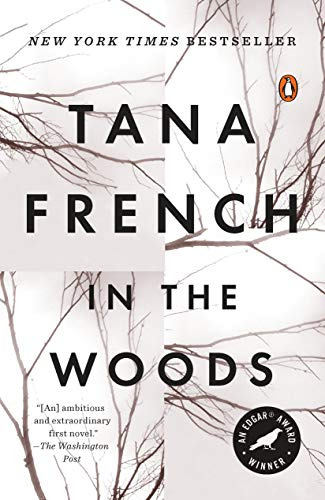
★★★☆☆
Oh my god. The premise of In the Woods is interesting on its own: three children enter the forest, only one is ever seen again, his shoes are covered in blood and he has no memory of what happened. Then twenty years later another child from the same town is found dead on a Bronze-age sacrificial alter, and it appears the two cases might be connected.
This book completely freaked me out. Not that that's hard to do; I'm very easily scared and usually avoid thrillers for that reason; but holy smokes. Fear glued my eyes to the paper, which is why I finished this sucker in two days, and why I stayed awake all of last night, convinced someone would break in and murder me at any given moment. So, judging this book by the emotions it conjures, I'd give it four stars out of five.
And, for the first two thirds of the book, it could have become a five-star book. The beginning was a little shaky, but eventually I stopped thinking of the writing style as pretentious and started appreciating it instead. And, like I mentioned before, the mystery was spot on. I think I was actually shaking during a couple passages, and I loved guessing who was the murderer and what their motive could've been. Everything for the main mystery was set up and explained well, which made it even better.
Enter my issues with the book. Rob, the protagonist, and his best friend and partner, Cassie, were the starring duo of this book in the beginning. I loved their banter, their ease with each other, and their entire dynamic, and best of all there was no romance. But, two thirds in, (view spoiler), which sort of ruined everything. Not because of the romance itself, but because of the way it was handled. Cassie and Rob had felt unshakable before, but afterwords Rob pretty much shut down all Cassie's attempts to bridge the gap, and the worst part? There was no resolution! No apologies, no closure, no conclusion to anyone's character arc. And that was all very frustrating.
And speaking of lack of conclusions, the absolute worst part of this book is that the first mystery, the one where two children went missing, was never solved! Like, if it was just a background thing, that would've been understandable, but literally half the book is spent trying to figure out whether the two murders were related, and evidence suggesting that they could've been connected was found, but then there was no resolution at all. I understand that open ended stories have their literary purpose, but in a murder mystery you expect the detectives to, you know, solve the mystery.
All in all, this could've been a four star book, or even a five star one, had there been any conclusion whatsoever. But alas, In the Woods only leaves me with questions, and not even the good kind. I would not recommend.
#book blog#books and reading#book review#book reviews#booklr#bookblr#in the woods#tana french#dublin murder squad#book ratings#book rating#murder mysteries#murder mystery#thriller#psychological thriller#crime fiction#adult fiction
1 note
·
View note
Text
Part 1: Enter, Ex-SOLDIER! [A Complete Analysis of Final Fantasy VII]
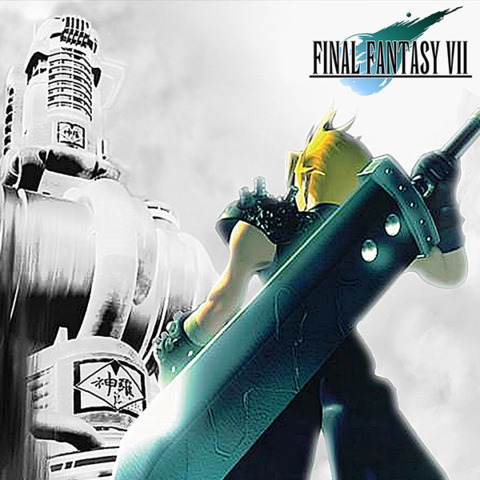
Masterlink here.
Welcome! This is the first post in my chapter-by-chapter analysis of the entire Final Fantasy VII. Each chapter will be primarily based on the original 1997 game, with discussion of the compilation works where relevant – ie. when they pertain to the original game (OG). Aside from a spoiler-warning for the entire FF7 (this is the only warning I’ll give), I want to note a few things before we start.
Firstly, story terms (shout out to DutchDread on YouTube for these most useful descriptions).
People use the words ‘story,’ ‘narrative’ and ‘plot’ interchangeably when referring to ‘story’. FF7 has a complex story with complex plots and narratives that often contrast, so I will be using these terms in their literal sense.
The story itself is the series of events that make up the game.
The narrative is how the events are told – ie. how the writers intend the player to interpret the story. It is the lens through which the player experiences the game; it is the device employed by the writers to twist, trick and play with the player’s emotions. Therefore narrative can subvert, mask or reveal truths.
The plot is the relationship between the events – ie. how the story is pieced together; how the events are related through cause and effect. The narrative can lie, but the plot remains true. In fact, to distract and misdirect the player from the plot is the very reason that the narrative lies. (Keep this in mind, for FF7’s plot and narrative will often tell a very different story.)
Secondly, plot terms.
I will discuss each chapter in three sections which are to be considered in light of the whole of FF7: its external plot (concerned with saving the Planet); its internal plot (concerned with saving Cloud); and its secondary character arcs (the journeys of party members and other characters excluding the main trio).
Yes, I have concluded that FF7 has a main trio. Cloud is, without a doubt, the primary protagonist, integral to both the external and internal plots. In this capacity he is, without a doubt, the hero of the game. But he is not the hero of either the external or internal conflict specifically. These roles (of equal and integral importance) belong to Aerith and Tifa. Aerith is the heroine of the external plot; Tifa is the heroine of the internal plot. Cloud, the primary protagonist, and Sephiroth, the primary antagonist, bridge these two plots – their actions and interactions tipping the courses for better or worse.
It can therefore be said that FF7 is the story of Cloud Strife.
Just as much, FF7 is the story of Aerith Gainsborough.
Undoubtedly, and no less, FF7 is the story of Tifa Lockhart.
Lastly, a note on techniques.
I will be discussing the notions of foils and musical leitmotifs in particular. A foil is a character who contrasts with another and simultaneously highlights the qualities of that other character. Foils can range from heroes & villains to heroes & heroes and villains & villains. DC’s Batman and Joker, for instance, are antithetical foils in what they represent: order and chaos. The Lord of the Rings’ Aragorn and Boromir, though both nobles of Gondor sharing the quest of the Fellowship, are foils in ideals and personality. A leitmotif is a recurring musical phrase (set of notes) that is associated with a particular character, place or idea. It can be as short as the two-note leitmotif of the shark in Jaws. It can evolve like the leitmotif of Star Wars’ Darth Vader.
And now, let us get underway.

Chapter 1: Enter, Ex-SOLDIER!
The External Plot
Aerith is the very first face we see. She will also be the last. Her identical shot at the game's beginning and end frames the external plot.
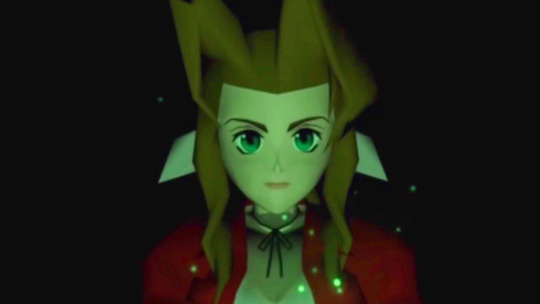
With her is a green glow that matches her eyes and small bubbles rising all around. In the present shot (the opening), these bubbles are revealed to be from a mako pump. In the end shot, these bubbles will be pieces of mako within the Lifestream. Juxtaposed is the mechanical science of Shinra with the nature (literal lifeblood) of the Planet – the main two forces at play within FF7’s theme of ‘life’.
Accompanying Aerith’s face lit by Lifestream imagery is the Lifestream leitmotif heard in the track Opening. With this first shot also being the game’s final shot (pre-credits), this same leitmotif will be the last musical piece heard at the end of The Planet’s Crisis. In both instances, it is in minor key on discordant piano notes, accompanied by one eerily long string note to give a mystical, grand and otherworldly effect.
youtube
Aerith appears even before the main titles, with the mako bubbles morphed from a cinematic pan of space. The stars which cinematically ‘transform’ into mako, are of immense thematic importance. We will learn (under a parallel pan of space in Bugenhagen’s observatory) that when a living being dies they become one with the Lifestream. The flow of spirit energy from which, eventually, new life will form. The stars, as Tifa will later inform us, represent living beings – the loved ones she and Cloud lost in Nibelheim (the already dead), and the lives that she, Cloud and the party are fighting to preserve (the presently living and lives-to-be).
“Do you think the stars can see us? Do you think they know how hard we’re fighting for them?”
Central to the theme of life, as will be aggrandized in Aerith’s journey, is death. What will set Aerith’s death apart from the deaths of characters like Dyne and Seto, is that the player experiences her death personally – we play as Aerith, and she is our friend, our 仲間 with whom we share joys and sufferings. The significance in her entrance here is that, unbeknownst, we are simultaneously looking at the two sides of life: life and death. She is alive in our opening by this mako pump, and she is both dead and alive in consciousness in the ending within the Lifestream.


Immediately following Aerith’s introduction, the external plot is established: the anti-Shinra group, AVALANCHE, is fighting against the Company to stop its consumption of the Planet’s lifeblood – and thus save the Planet. (Later, the means of saving the Planet will change, but saving the Planet will remain the heart of the external plot.)
After the destruction of Mako Reactor 1, the player meets Aerith selling flowers in a technological metropolis where flowers hardly grow; an allusion to her unique relationship with the Planet. Next chapter, Tifa will tell the player that flowers do not grow below the plate. Here Aerith is selling flowers atop the plate where they are shown not to grow.
“Don’t see many flowers around here.”
- Cloud to Aerith atop the Plate
“You almost never see them in the slums.”
- Tifa to Cloud below the Plate.
The only places we will ever see flowers in Midgar – and in abundance at that – are in Aerith’s church and around Aerith’s house. They are distinctly unique to Aerith, just as her relationship with the Planet is distinctly unique.

Aerith’s name will not be learned until Cloud meets her in the church. At present, she is introduced to the player as “Flower Girl”. The strangeness of selling flowers is enforced even further in the Remake, where Aerith is introduced as “Flower Peddler”. While ‘peddling’ means trying to sell something by travelling from place to place, a ‘peddler’ is specifically defined as someone who sells illegal goods. I regard this a wonderfully ironic title, further setting Aerith’s character apart.

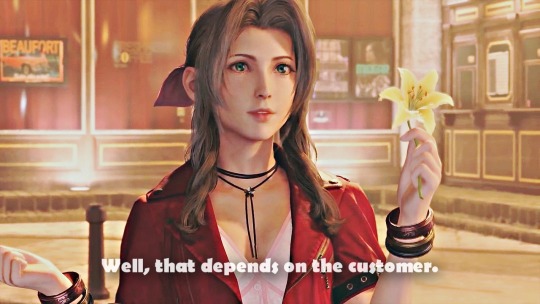
On that note, let us consider her design. Credit to DiGi Valentine (you can find wonderfully in-depth reviews of both Aerith and Tifa’s visual designs on his YouTube channel).
Aerith’s OG graphic design instantly sets her apart from the rest of Midgar – seen even more starkly in that we are presently atop the plate (we’re contrasting her to people well-off as opposed to the poor-clothed slum folk). Compared to everyone else’s plain attire, Aerith instantly stands out as someone who doesn’t belong. But just as importantly, we get a dive into her personality.
At face-value, her long, pearl-pink dress elicits an air of grace, making our Flower Girl appear gentle and good. These qualities are enhanced by the matching pink ribbon in her hair, which adds an additional purity to the character – one of youthful girliness, naively separate from the gigantic world around her. Accompanying the dress and ribbon, however, is a red, short-sleeve crop jacket – which instead of enhancing this grace and naivety, exhibits the exact opposite. Red is a bold and brazen color. Coupled with the 90’s crop-style of the jacket, it speaks strength and vigilance. The loud (and somewhat rebellious) qualities of Aerith’s jacket countervail the soft elements of her dress and ribbon. They are a metaphorized balance of Aerith’s personality. She is gentle and pure, but she is no softie. She has strong confidence in herself.
This strength and confidence is displayed even before the player approaches her. Flower Girl is pushed over in a panicked scramble of street folk, and she picks herself up, dusts herself off, and resumes her flower-peddling. It is a beautiful little display of her capability to hold her own. (Though this will not stop her from allowing Cloud to play her bodyguard later.)

The contrasting qualities of Flower Girl’s outfit are connected in the fact that red and pink are proximate colors; while the dress and jacket are from two different worlds, their colors go together. Moreover, red and pink are the colors that represent love. Mixed together, they create ‘hot pink’ – a color used to communicate playfulness. A beautiful symbol of her love for all life and her jestful, sassy personality.
Moving to Flower Girl’s footwear, we find an even sharper contrast. One would expect that a person who so fashionably marries grace and strength would have stylish footwear to match. Yet here Flower Girl stands in a pair of grimy, commonplace boots. While the dress, jacket and ribbon communicate her nature and personality, these grimy, commonplace boots inform the player of the life she is leading – the life of a girl who has grown up in the slums.
Flower Girl’s boots and hair are the same shade of brown, framing the vibrant personality her outfit presents. In addition to the bright, lively clothing, her hair is a standout feature. And there is another central character who shares this feature. Aerith’s trademark bangs have an almost-identical design to Sephiroth’s, a subtle allusion to her in-every-sense enemy foil. Not only do the pair share similarities with their hair: Sephiroth’s collar and length of armor parallel Aerith’s jacket; his wrist-cuffs parallel her bracelets; his cloak parallels the length of her dress; and his eyes – though mako-induced – are in direct match to Aerith’s.
[Bonus fact: in early stages of the game’s development, Sephiroth and Aerith were intended to be either siblings or former lovers. This is likely a reason the matching hair was kept in their designs.]
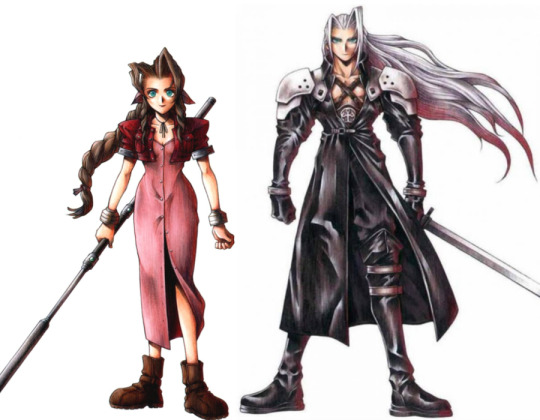
The pair’s bright green eyes further represent their foil-roles in relation to the plot. Aerith’s eyes are green with life, representing her connection with the Planet. Sephiroth, of course, holds a connection too, though his Mako-induced green is not his authentic color. They portray him as the false ‘savior’ he acclaims himself to be, in contrast to the true savior that is Aerith. Aerith and Sephiroth’s traditional stances too are directly antithetical, as seen in their concept art by Tetsuya Nomura above. Aerith’s weapon and hair trail right while Sephiroth’s weapon and hair trail left – like a mirror image. Also note Aerith’s bright, vibrant design against Sephiroth’s dark, monochromatic design; a visual display of life and light against darkness.
There is no FF7 character with a brighter visual design than Aerith – fittingly, for she will be the party’s light. In the Remake, her outfit is much the same if not expanded upon. The jacket reaches her hips rather than waist, and her boots are black yet about as commonplace as the OG brown. The notable difference is her dress. The Remake fits Aerith in a looser, frilly dress, which actually enhances her grace and creates a more deceptive air of naive youthfulness, much like the longer crop jacket further enhances her boldness.

In the Remake, simultaneous to Cloud meeting Aerith, Sephiroth appears. His fighting leitmotif is heard much earlier – after the opening shot as Aerith makes her way down the alley. It will later be heard after his return in the Shinra building when the party battles Jenova Dreamweaver, and then in full during the final boss fight, One-Winged Angel – Rebirth.
youtube
The very moment Aerith locks eyes with Cloud, Sephiroth appears with the line: “You are too weak to save anyone. Not even yourself.” As the agent of Jenova’s will, Sephiroth is the ultimate threat to the Planet, and thus the main antagonist of the external plot. As the one Cloud must overcome inside his very conscience, he is also the main antagonist of the internal plot. Thus, while he is Aerith’s external enemy foil, he is Cloud’s antagonizing internal foil (as well as Tifa’s as we’ll soon see).
“You are too weak to save anyone” foreshadows Aerith’s death and plays on the feeling Cloud attributes most to himself – weakness. “Not even yourself” foreshadows the breaking point in Cloud’s inner struggle, where his identity will shatter as he and Tifa are rifted apart.
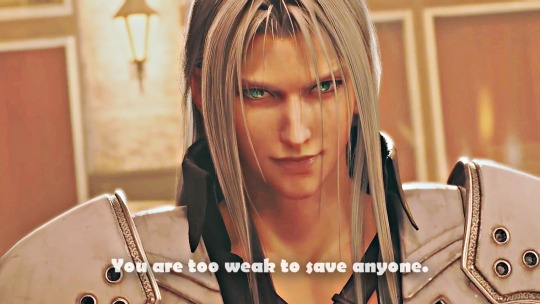
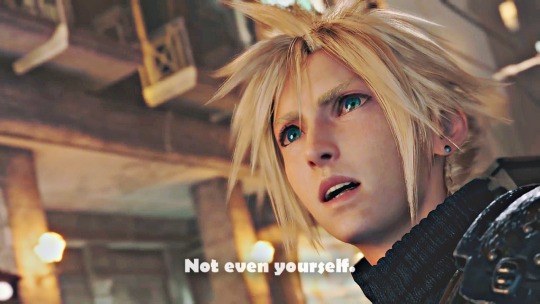
Like Sephiroth, FF7’s secondary antagonist is the secondary antagonist of both its external and internal plots. This antagonist is, of course, Shinra.
While Sephiroth is established as the enemy-foil to both Aerith and Cloud (& Tifa), Shinra will be established as the facilitating ‘background’ enemy to both Aerith (& the Planet) and Cloud (& Tifa), plus Sephiroth himself. In fact, Shinra is the facilitator that has personally impacted the very identity and present life course of every main and secondary character in the game.
In the Japanese OG, when Jessie and Cloud speak on the train, Jessie says:
最高水準の技術の結晶。人間の知と力のしょうちょうね。このミッドガルは…
This literally translates to:
“A crystallization of the highest power. A symbol of humanity’s power and wisdom. That’s what Midgar is.”
Midgar, the symbol for what humanity has achieved (this “power and wisdom” built by Shinra into a technological metropolis), is juxtaposed to the Planet the Company is slowly destroying. In between stands Aerith with her intimate connection to the latter.

If selecting dialogue accordingly, the player has the option to buy one of Aerith’s flowers (an allusion to the player’s role in the external plot, where we participate with Aerith in saving the Planet). Making this clear is the fact that it occurs just after the bombing. The player’s first mission is AVALANCHE’s fight for the Planet (which is a red herring in the means of saving it) – and the fact that this act of buying a flower is optional enforces Aerith as the centerpiece and the player (Cloud, and by extent, AVALANCHE) as her aide. This option is also the first in a series adhering to the ‘affection point’ system we will later discuss.
The flower mechanic will also showcase Aerith as an excellent judge of character. She offers to sell this flower to Cloud for just 1 gil (or, in the Remake, tells him it’s “on the house”). Later outside Sector 6’s Honeybee Inn, Aerith will be eyed by a crowd of lecherous men. To them, the cost of her flowers would be 300 and 500 gil each (as expensive as a high potion and tent respectively). But to Johnny from Sector 7 (who is truly kindhearted), Aerith will freely gift a flower.


The Remake removed the flower-buying option, as well as Cloud’s choice of giving the flower to Tifa or Marlene. Instead, Aerith gifts Cloud a flower which he gives to Tifa. This flower is said (directly in Japanese) to represent ‘reunion’ – another major theme of the game. I will discuss its metaphorical significance in the next chapter.
Before examining the internal plot, I want to briefly consider the soundtrack and how it builds the Shinra/AVALANCHE conflict. In the famed Bombing Mission, a low minor piano ostinato accompanies AVALANCHE’s entrance before the takeover of trombones, tubas, trumpets and horns. Brass continues to dominate with a background of strings – giving a heroic climbing-victory effect as the team fights their way into the reactor.
youtube
Bombing Mission will also play:
if the party chooses to storm the entrance when infiltrating Shinra HQ (at Barret’s – AVALANCHE’s leader’s – suggestion); and
when the party engages Shinra in the final battle to save Midgar at the external climax of Disc 2.
In the Remake, the repeating four-note melody (Extract II above) will be expanded upon and evolved in further AVALANCHE/Shinra fights, including the Scorpion Sentinel boss battle and expressway escape.
Inside the reactor (and subsequent reactors) plays Mako Reactor 1 – a minor melody on synth over a piano & timpani bass – ominous sounds evoking a dystopian setting. This is joined by strings, and later a new metallic chime & synth melody. This new melody is the secondary of the two Shinra leitmotifs – the secondary being fitting, for we are only scratching the surface of Shinra’s world rather than interacting directly with the organization. The main leitmotif will first be heard when we meet President Shinra.
youtube
AVALANCHE escapes the reactor to Hurry! Foregrounded on minor strings, this track will occur in many moments of desperation and escape throughout the game. A sense of urgency & danger is evoked through the use of a ticking clock and a half-step upwards key change (F minor to F# minor in this case).
Lastly, moving away from music, is the theme of the underground – presented here in the heart of a mako reactor. This is a motif that will pop up time and again throughout the story. In fact, the game’s most crucial battles will all be fought in the underground, from Corel Prison to Midgar’s Underground to the depths of the Planet itself. And this holds just as true for the internal plot, climaxing with Cloud and Sephiroth’s final showdown in the Lifestream.
And now, moving on to our man of the hour himself...

The Internal Plot
Cloud’s identity is established by the narrative under the persona of Ex-SOLDIER. “Ex-SOLDIER” leaps off the train and takes out the Shinra guards. Biggs says, “You used to be in SOLDIER, huh?” and only then the player can name himself “Cloud”. Whenever we think Cloud, we are to think Ex-SOLDIER.
Ex-SOLDIER’s first fight teaches us two things: first, that the capital spelling of SOLDIER does not pertain to an ordinary ‘soldier’ (ie. the occupation of the guards we are fighting - called ‘MPs’); and second, that our Ex-SOLDIER is the epitome of strength. The Shinra ‘soldiers’ shoot at Ex-SOLDIER, dealing single-digit HP damage. Ex-SOLDIER decimates each soldier (hundreds of HP damage) in a single blow. He doesn’t even need the impressive Materia equipped in his blade.


Cloud being an “Ex-SOLDIER” is reinforced repeatedly throughout the mission and will continue to be reinforced repeatedly in the chapters that follow. Every time it is reinforced, the reputation of a SOLDIER is simultaneously built up: a SOLDIER has exceptional strength. The theme of ‘strength & weakness’ will play central role in Cloud’s journey and in his relationships.
“What’s with you all of a sudden? That job wasn’t even tough.”
“I guess not… you were in SOLDIER.”
- Cloud and Tifa re the bombing mission (if the “something hard” drink dialogue is chosen)
“If there was anyone from SOLDIER, you wouldn’t be standing here now.”
“Don’t go thinkin’ you so bad jus’ cuz you was in SOLDIER. Yeah, you’re strong. Probably all them guys in SOLDIER are.”
- Cloud and Barret re the bombing mission
Cloud will later tell Aerith in the Sector 6 playground that he was a First Class SOLDIER. The Remake wastes no time acquainting us with this statement, playing off a comical discourse between Barret and Cloud at present:
“What are you, like twenty-something?”
“First Class. Doesn’t go into twenties.”
“I meant your age, not your god-damn rank.”
The focalization of Cloud’s identity on this persona is shown – as well as his insecurities regarding all that he is without it. (A notion we would not even consider at this point, for “Cloud” and “Ex-SOLDIER” are ingrained in our minds as inseparable.) And how about it? He is a proficient Materia-user, can hack through foes with a single sword-strike, and wields the biggest handheld weapon we’ve ever laid eyes on.

After Ex-SOLDIER’s introduction, we simultaneously learn three things: first, he is a mercenary; second, he was a former SOLDIER for Shinra; and third, he has been hired by the anti-Shinra group to bomb one of Shinra’s reactors. Alluded through this is the fact that Shinra is corrupt on the inside (one of its top ‘defenders’ having defected the Company). Not alluded – through his vocal indifference toward it all – is Cloud’s reason for fighting the Company. For now, we are supplied a series of statements that Cloud just wants his money for the job and that he, in reputation and skill, is naught short of a total badass.
Highlighting this perception, of course, is his visual appearance. Cloud’s outfit is a dark purple variant of the classic SOLDIER uniform – purple being the color associated with power, grandeur and ambition. (Purple was especially popular in nobility circles before and during the Middle Ages.) At the same time, Cloud’s clothing showcases him having attributes of a SOLDIER but not being a ‘complete’ SOLDIER. He wears a pauldron over his left shoulder only, as well as an armlet over just his left forearm with a SOLDIER band on his right wrist. (Compare him to the earlier picture of Sephiroth, who wears SOLDIER bands on both wrists.) Cloud’s shoulder pauldron and armlet contain visible screws, which may indicate makeshift repairs during his prior brushes with death.

This ‘half’-SOLDIER design designates two things. Presented by the narrative at face value is Cloud’s desertion of Shinra, as noted by emphasis on his status as Ex-SOLDIER. Beneath the surface, however – not presented by the narrative – is Cloud’s true identity. That he, though striving for the title, was never actually a SOLDIER, having adopted the persona of the man we will learn to be Zack.
Cloud’s physical build is also not what we would expect from a walking embodiment of strength. His muscles – on clear display – are well-toned but rather small, putting his visual appearance at odds with his reputation. Like the ‘half’-SOLDIER design of his outfit, this hints that something is not quite right. Sure, he’s carrying the five-foot-long Buster Sword and will tell us he is physically built like a SOLDIER later on. But we will also learn that Cloud was initially “too weak” to make the program, that he spent four of the last five years in a lab tank, and that he suffered adverse effects due to all the experiments.
“Physically, I’m built like someone in SOLDIER. Hojo’s plan to create a Sephiroth clone wasn’t that difficult. It was just the same procedure they use when creating members of SOLDIER.”
“For better or worse, only the strong can enter SOLDIER. It has nothing to do with the Jenova Reunion. But weak people… like me, get lost in the whole thing.”
Which brings me to that badass-looking, five-foot-long Buster Sword. The noun ‘buster’, coined in the 1830s, was officially recorded as American slang for "anything large or exceptional; a man of great strength.” How absolutely perfectly fitting for Ex-SOLDIER! As Cloud’s default weapon and Zack’s physical legacy, the ‘Buster’ Sword is Cloud’s ‘Zack’-persona metaphorized.
When compared to Sephiroth’s eyes – the green color of mako – Cloud’s are more his original blue. He will be consistently recognized as having the “mako eyes” of a SOLDIER, yet at the same time, they are distinctly ‘Cloud’ – a blend, like his outfit and build, in his ‘half’-SOLDIER design.

There is a character who parallels Cloud’s ‘half’ design – the person who is Cloud’s reason for wanting to become a SOLDIER, the reason for Cloud hiding his true self when he failed to become a SOLDIER, and the reason for Cloud joining the fight for the Planet against Shinra as “Ex-SOLDIER”. This character – who has an arc that mirrors Cloud’s, and is in every sense Cloud’s other half – is Tifa. Tifa, like Cloud, wears two metal guards on her left side: one at the elbow and the other on the tip of her boot. Interestingly, the elbow is positioned between the shoulder and forearm – if one were to put Tifa and Cloud’s armor together, their armor would essentially cover a whole arm. In addition, both characters wear an earring in their left ear. These are allusions to their being ‘half’-selves with their locked up feelings – their right sides being ‘open’, where they rely on each other’s support.
“A sealed up, secret wish… Tender feelings no one can know…”

Now, Tifa is a leftie – as the observant player will note – and Cloud too dons his armor on the left side for drawing his sword. Their leaving the right side bare is also symbolic though, in that Tifa is Cloud’s right hand – his chief supporter, uplifter and rock – just as he is hers.
In the sequel, Advent Children, both characters wear a black sleeveless vest with a high zip collar, a black cape, black boots (Tifa having replaced her trademark red) and a wolf symbol (on Cloud’s badge and Tifa’s ring) – a symbol associated specifically with Cloud. Moreover, the shared wolf motif symbolizes a pack, a family, with Barret and Denzel (Cloud & Tifa’s adopted son) also in possession of one. Tifa’s ring is at center camera-focus when she confronts Cloud about their moving forward and rescuing the kidnapped children. It is also closely framed at the end when Tifa coaxes Denzel toward Cloud to be cured of his Geostigma.
As with the culmination of their love under the Highwind at Disc 2′s end in the OG, Cloud and Tifa’s matching visual designs in Advent Children symbolize their being ‘one whole’. But more on that later.
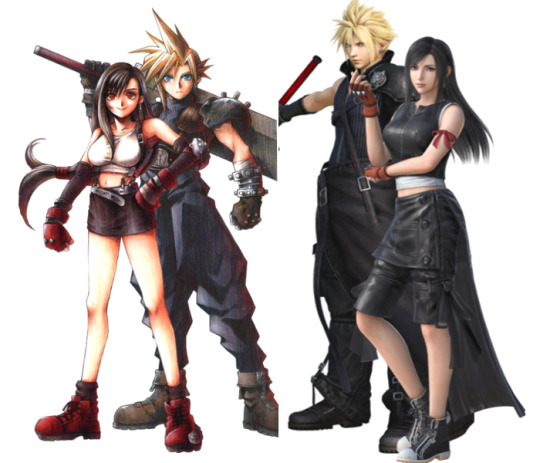
The etymology of Cloud’s name is one of the more obvious. ‘Cloud’ represents obscurity, hiddenness and confusion in addition to ‘gloomy’ or ‘troublesome’ weather – a perfect allusion for Cloud’s suppressed and lost identity. ‘Strife’ refers to his inner turmoil and bitterness toward himself – due to his feelings of weakness and failure.
Much pertaining to Cloud has its etymological roots in Norse mythology. One of his later swords, for instance, is called Ragnarök, named after the Norse apocalypse. Cloud’s bike in Advent Children, Fenrir, is named after the monstrous wolf said to be bound until Ragnarök. The wolf imagery, as aforementioned, reflects Cloud’s devotion to his ‘pack’ and family. It also reflects his wanderings as a ‘lone wolf’ whilst he is lost in his inability to forgive himself for Aerith and Zack’s deaths and his fears of failing Tifa and the kids.
What is most interesting etymologically, to me, is Cloud’s hometown Nibelheim – based on the Nordic place Niflheimr (lit. “mist world”) translated “fog home” in German. Not only is Nibelheim the home of Cloud Strife, but the literal “cloud home” of all of Shinra’s secrets, from the Cetra to the Jenova project to human experimentations to Sephiroth’s origin. But I digress.

Cloud’s first line (aside from stating his name) is to Biggs: “I don’t care what your names are. Once this job’s over, I’m outta here.” Cloud, the Ex-SOLDIER, is established as a hired mercenary. Just prior to this, Barret calls him “newcomer”. In the Japanese version, he calls him 新入り (“shin’iri” – lit. “new recruit”). The localization avoids calling Cloud the equivalent of ルーキー (“rookie”) or 初心者 (“beginner”), which would imply inexperience. Remember, we are to think of Cloud as strong and skilled.
Barret reinforces Cloud as “Ex-SOLDIER” whom he does not trust, to which Cloud is nonchalant. It is presently not clear why Cloud is here. But this interaction reveals two things: first, that Cloud has been hired in desperation on AVALANCHE’s part; and second, that Cloud’s sympathies are not with AVALANCHE or their mission. Cloud repetitively uses the phrase きょうみ ない (lit. “not interested” / “not my problem”), asserting that he is as uninterested in the fate of the Planet as he is in the names of his (temporary) co-workers.
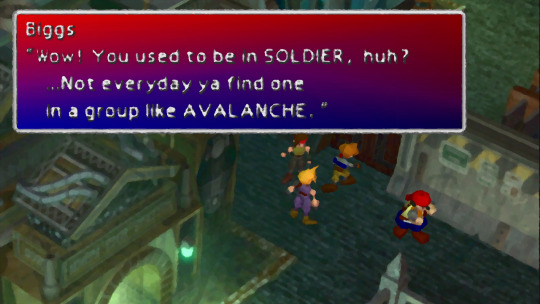
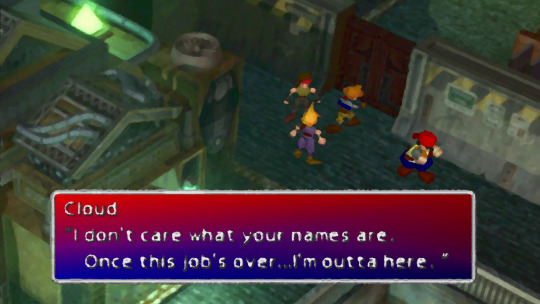
Cloud’s inner voice is heard for the first time when setting the bomb: “This isn’t just a reactor…” This voice of his ‘real’ self – buried in the depths of his own conscience – will continuously be heard during his memory lapses and breakdowns throughout the narrative. This narrative, which consistently reminds us that he is “Ex-SOLDIER”, is prone to masking the truth of the plot: what we see as lapses and breakdowns are actually moments of clarity.
When the bomb is about to blow, Cloud says in English, “Come on, let’s get outta here!” (his trademark ‘strong’ façade is cracked). In Japanese, however, he says さあ、脱出ぁだ (lit. “Well, time to go”). While English Cloud sounds ‘cool’ (and perhaps a little panicked), Japanese Cloud sounds ‘strong’.
Before moving on to secondary arcs, I also want to mention Tifa’s set up in this chapter. The two mentions here occur only in the Remake and I think they are a brilliant addition.
The first is Jessie asking Cloud if he and Tifa are “close”, to which Cloud has a first-person flashback of a young Tifa asking him if he is “ignoring” her. In the Japanese version, she says また 無視した 。 (“Ignored again.”) This introduces a distance – a barrier – between them, and implies that this barrier is on Cloud’s part. They are distant out of Cloud’s doing. Young Tifa calling out to Young Cloud is an allusion to Present Tifa reaching out to Present Cloud, which is the centerpoint of the internal plot. The barrier, which will remain unknown for the majority of the game, is exactly the thing that has been the central focus of this chapter: the Ex-SOLDIER persona.
In addition, the first-person perspective alludes to Tifa being ignored by the player. That is, the narrative will constantly distract the player from what is really going on between Tifa and Cloud.
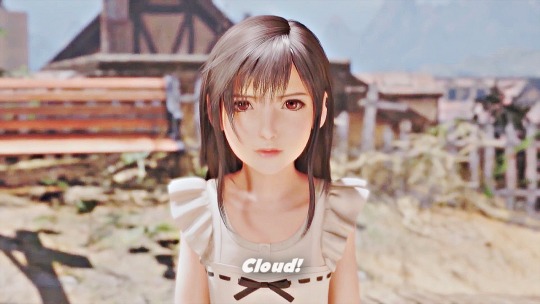

The second mention of Tifa occurs when Barret convinces Cloud to set the bomb: “Prove to me you’re the man Tifa says you are. That you’re one of us.” Tifa is established as Cloud’s connection to AVALANCHE. Barret affirms their closeness questioned by Jessie and proceeds to ‘test’ Cloud, enforcing Tifa as his connection to the group.
Cloud replies that he is “just here for the pay-check” and takes the bomb. His words again enforce that he doesn’t care for AVALANCHE. They reveal nothing on his ‘closeness’ with Tifa however, and the narrative leads the player to assume it is the same in her case, immediately diverting our attention back to the mission.


After the bombing, when Tifa and Cloud speak privately on the way to their apartments, the conversation goes as follows:
“How was it up on the Plate?”
“It was… chaotic.”
“Sorry for dragging you into all this. It was wrong of me to put you in danger like that. I promise I won’t do it again.”
“Danger’s part of the job. Don’t worry about me.”
“I’ll try not to.”
“Always happy to help stick it to Shinra.”
Two things are reinforced here. First is Tifa being Cloud’s connection to AVALANCHE (enforced three times in just one statement of dialogue) in addition to her (three times in that same statement of dialogue) taking personal responsibility for and worrying about Cloud’s safety. Second, is Cloud’s blatant lie – “Always happy to help stick it to Shinra”. On the entire mission, Cloud voiced his indifference to the Shinra/AVALANCHE conflict (in which the Planet hangs in the balance) and his indifference toward “helping” the crew.
After a long pause – which backed with the very next sentence shows that Tifa knows this – we get:
“So, you make nice with everyone?”
“Much as I could, all things considered. Maybe not enough for them.”
“Good. You had me worried. You’re not exactly a people person.”
“I’ll give you that.”
Yes, Cloud. We saw just how far out of your way you went to “make nice”.

The Remake will constantly present Cloud and anyone else as a “me and them” and Cloud and Tifa as a “we”, from shared quests, to battle dialogue, to the rescue of Aerith later in the Shinra Building where Cloud will jokily tell Barret, “Why did we bring you along again?” But again, I digress.
When the player leaves Sector 1, the musical score Heart Of Anxiety is heard – a track closely associated with Cloud. Falling minor chords on the sustained strings melody reflect Cloud’s feelings of isolation & detachment. Accompanying the flute’s loop of this melody is the prelude ostinato on piano. This ostinato only appears before beginning play when the game is booted and on the game-over screen (during the tracks Prelude and Continue respectively).
Framed with these two tracks (Prelude and Continue), the ostinato represents the story aspect of FF7, and its occurrence in Heart Of Anxiety – as associated with Cloud – enforces the centrality of Cloud’s story to the entirety of the game. Also heard in Heart of Anxiety are the final four notes of Sephiroth’s leitmotif, foreshadowing Sephiroth’s literal influence in Cloud’s heart.
youtube
Secondary Arcs
Barret
The narrative introduces Barret as being determined to save the Planet – setting this up as his main goal – yet Barret forces Cloud to set the bomb. Cloud himself (our nonchalant, indifferent Ex-SOLDIER) – for the first time – questions Barret: “Shouldn’t you do it?” As established in Barret’s first line after Cloud’s introduction (“Ex-SOLDIER, huh? I don’t trust ya”), the narrative tells the player here that Barret forces Cloud to set the bomb because he doesn’t trust him (“Gotta make sure you don’t pull anything”). The narrative cleverly masks the plot that has Barret forcing Cloud to set the bomb in order to avoid doing it himself.
In the bombing of Reactor 5, Barret will again have Cloud set the bomb, and the Remake will detail that Tifa – not Barret – is the one carrying the remote detonator. Only the very attentive player will notice that Barret is avoiding accountability – a characteristic that will present itself time and again throughout his journey.
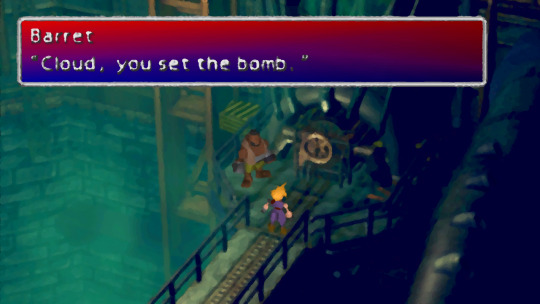
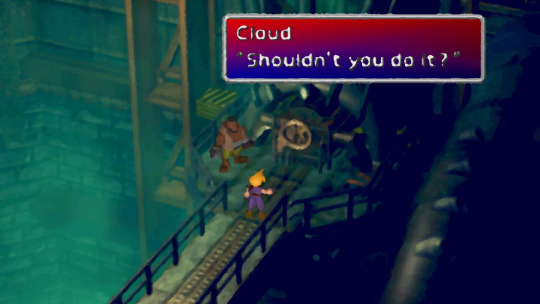
Like with Cloud, the narrative is hiding Barret’s true motives and Barret’s own identity struggle. Like Cloud’s constant reinforcing of “Ex-SOLDIER”, Barret constantly rants about saving the Planet, leading the player to believe that is his motivation and goal. Here are some excerpts just from the OG bombing at present:
“It’s the lifeblood of this planet. But Shinra keeps sucking it out with these weird machines.”
Cloud responds: “I’m not here for a lecture. Let’s just do it.”
“Little by little, the reactors will drain out all the life. Then that’ll be that.”
“The planet’s dyin’, Cloud!”
Later will we learn that this obsession with protecting the Planet is a façade.

Upon his introduction, Barret is established as a respectable leader who bears the burdens of his team. This is demonstrated beautifully during his speech in the Remake after Reactor 1 is destroyed. But there are many examples in the OG, particularly in the Japanese version. Here are two in Barret’s own words:
When Reactor 1 has exploded:
さあ、 引き上げるぞ !
(Saa, hikiageruzo! – lit. “Let’s pull it up!”)
This is a militaristic term, one commanding officers would relay to their subordinates.
On the train, when Biggs wonders if Cloud died:
あの野郎が金ももらわねえでいなくなるわけ ねえ だろ!!
(Ano yarou ga kanemo morawanee de inaku naru wake nee daro!!)
This sentence literally reads, “There’s no way that jerk will disappear without getting his money!!”
This second quote is drastically different from the English version where Barret just says, “No way!!” Barret’s use of slangy verb endings in Japanese – such as もらわねえ (“morawanee”) rather than もらわない (“morawanai”) – also make him sound tougher and cooler (one of the reasons that Barret and Cloud’s personalities clash). But moreover, Barret rejects the idea that Cloud is dead and instead answers Biggs’ question as though he had been asked something along the lines of “Do you think that Cloud ran off and abandoned us?” For all his dislike and distrust of Cloud, he actually cares about him.
Barret’s toughness and intimidation is emphasized by multiple characters throughout the narrative. When Wedge asks about the crew’s money after the mission, an irritated Barret slams a fist and he immediately goes quiet. The slum folk on the train all scatter when he enters the carriage – a recurring reaction as noted by the Shinra employee: “This is why I hate the last train. Hoo boy…” (on the midnight return to Sector 7); and “Hoodlums again. God, don’t I just have all the luck?” (the next morning). When arriving in Seventh Heaven, AVALANCHE’s HQ, Barret storms in and kicks Tifa’s customers out of the bar.

All of this gives the player the impression, “Don’t mess with Barret” and “Barret leads, you follow”. But beneath it all is Barret’s unfitness at being a true leader.
He is unable to provide his followers satisfactory pay:
“I’m going upstairs. I want to talk about my money.”
“Shucks!! …money…”
- Cloud and Barret in Seventh Heaven’s basement
“What about our money? ...Uh, nothin'…sorry.”
- Wedge and Barret on the train
“Uh… ugh… That money’s for Marlene’s schoolin…”
- Barret to Tifa after Cloud demands higher pay for the next bombing
“Yeah, yeah, your money. Ask Tifa. She takes care of all that.”
- Barret to Cloud (Remake)
In every instance, Barret passes off the responsibility to pay Cloud. Cloud, already having figured out he won’t get his pay from Barret, wants to go upstairs to talk to Tifa; Tifa urges Barret to acquiesce to Cloud’s request for more pay; as soon as arriving in Tifa’s bar, Barret passes the responsibility of paying (what they do not have) to Tifa. Later, when they have the money, Barret is the one to pay Cloud.

This pattern will occur with every event of accountability in Barret’s life. When Sector 7 is destroyed by Shinra, Barret will refuse to take his share of the blame:
“…Are you saying it’s our fault? Because AVALANCHE was here? Innocent people lost their lives because of us?”
“No, Tifa! That ain’t it! Hell no!! It ain’t us! It’s the damn Shinra! It’s never been nobody but the Shinra! They’re evil and destroyin’ our planet just to… build their power and line their own damn pockets with gold! If we don’t get rid of them, they’re gonna kill this planet!”
- Tifa and Barret after the Plate fall (OG)
“It was us. We did this.”
“No. You can’t think like that. Whatever came before, it was Shinra who pulled the trigger today. Am I right?”
“…Yeah.”
“Hold onto this. This… anger. Okay?”
- Tifa and Barret after the Plate fall (Remake)
Then, much later when confronted about it by Cait Sith, we get this:
“I been itchin’ to say this to you for a while now! When you blew up the Sec. 1 reactor how many do you think died?”
“…that was for the life of the Planet. Ya gotta expect a few casualties.”
“A few? Whaddya mean ‘a few’? What may be a few to you is everything to those who died… Protect the Planet. Hah! That sure sounds good! And no one will go against you. So you think you can do whatever you want, right?”
“I don’t wanna hear that from no one in Shinra…”
Seeing the pattern here? Barret is confronted with his actions that helped yield negative results; Barret makes excuses and passes the blame. And at the end of the day, the accused party is the only one who looks bad. The Plate was destroyed because Shinra is evil and greedy. Shinra must be stopped or it’ll happen again. Cait Sith worked for Shinra, therefore he has no say.
Here, however, is an additional fact that often goes overlooked: in every one of these instances, Tifa takes the accountability for Barret’s actions.
“Cait Sith… Barret, he knows what he did. What we did in Midgar can’t be forgotten no matter the reason. [Turns to Barret.] Right? We haven’t forgotten, right?”
[Barret refuses to reply.]
Yet, ingrained in our minds from the get-go, is this:

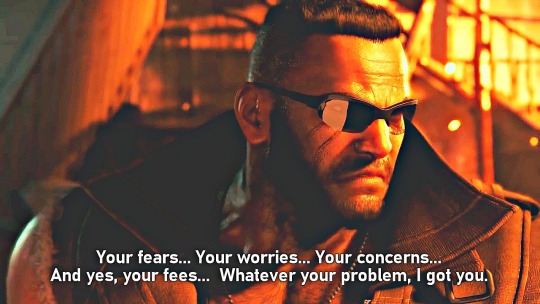
Throughout Barret’s journey, we will see the beautiful unravelling of a very human character – a man full of flaws and weaknesses, who grows into a genuine self-sacrificing comrade. But, for now, let us return to the chapter at hand.
Barret’s visual design, as the narrative enforces, is that of a hardened military man. Contrasting Cloud’s smaller build, he is tall, heavy-set and muscular. Where Cloud’s smaller stature is at odds with his “strength”, Barret’s large and powerful build emphasizes his. Compared to Ex-SOLDIER Cloud – strength in reputation – Barret is the visually strong leader.
In place of Barret’s right arm is a gun – by default, a Gatling Gun. The real-world gatling was the first practical machine gun, adopted by the US army in 1866; “a rapid-fire, crank-driven gun with clustered barrels”. Just like our boisterous, revenge-driven shooter who wears his emotions on his sleeve. Barret will later reveal that he initially had a prosthetic hand after the burning of his hometown, but forsook it for a gun graft when he began his quest for vengeance. In the sequel novel, On the Way to a Smile, an atoning Barret exchanges his gun for a new steel hand. In Advent Children, he has embraced both together – able to transform his hand into a gun and vice versa – representing him having made (at least partial) peace with his past and actions.
Complementing his militaristic leader role, Barret has armor around his waist and left wrist, a tattoo of a skull on his shoulder, dog-tags around his neck, and his hair styled in a crew-cut fashion. Three scars stretch across his cheek, signifying his past brushes with death and showing that he is a survivor. His outfit consists of a dirty brown vest, a pair of green, army-color pants, and big brown boots handy for getting by in the slums.

The Remake makes a few modifications to Barret’s attire. The notable one is that he now wears sunglasses – a prop that the narrative often uses to evoke insights into Barret’s deeper emotions. He first removes his glasses when speaking to Cloud about the tragic lives of the slum-folk. And he removes them whenever conversing with his daughter Marlene – the center force of his journey – whom I will discuss in the next chapter.
___________________
Summary
“Flower Girl” is the first and last character seen, framing the external plot. Paralleled in the identical opening and closing shots, she presents the two sides to the overarching theme of life.
Flower Girl is established to have a uniquely intimate connection to the Planet, standing between the juxtaposed nature of the Planet and science of man (Shinra).
AVALANCHE is introduced as the red herring ‘savior’ of the Planet, the role which will ultimately belong to Flower Girl.
“Ex-SOLDIER” is introduced as our protagonist, the epitome of strength and skill.
Ex-SOLDIER has been hired in desperation on AVALANCHE’s part. He is a mercenary indifferent to the cause.
Barret is set up as the strong and calculating leader of AVALANCHE. Narrative-wise, he is out to save the Planet. Masked is his façade.
#[mine]#analysis#final fantasy vii#cloud strife#aerith gainsborough#barret wallace#tifa lockhart#sephiroth#avalanche#shinra#cloti
74 notes
·
View notes
Text
Why ACOTAR 5 Is (Without a Doubt) Elain’s Book
Warning: This post will be a long one, and will analyze the series as a whole (including ACOSF). As you read it, please consider taking your shipping goggles off, as none of this has anything to do with shipping and everything to do with character development/plot/the overall narrative of the series/good storytelling. Thank you!
Main points:
Elain’s role in the ACOTAR series
Elain’s character evolution throughout the series
The foreshadowing in ACOSF (+ bonus POVs)
The overarching plot
SJM’s own words
The ACOTAR Series and Elain’s Role

We have multiple interviews of SJM saying that Nesta and Elain’s role started off as a fairytale trope: that of the evil sisters. Then, Nesta surprised her when she decided to go after Feyre in ACOTAR, and the rest is history.
The sisters went from being a trope to being an instrumental part of the series. In ACOMAF, they were a link to Feyre’s human life (a final thread that she needed to let go of), as well as a means to an end (first, by being a bridge between the IC and the Queens, and then, as leverage, or weapons that were used against Feyre in Hybern). The final scene in ACOMAF was the catalyst for everything that happened in ACOWAR—and everything that is yet to come—but, most importantly, it also opened the door to two new character arcs/journeys—two new protagonists.
The protagonist exists as a sympathetic device to drive a story. To be effective in this role, they are usually there from the inciting moment to the end.
The similarities between their journey and Feyre’s are astounding: human made into something that she was raised to fear; coming to terms with trauma; letting go of the past; accepting her new condition; and the list goes on and on.
Now, who had more to lose by becoming fae?

And who lost more than anyone else?




Elain lost a future.
She was happy, content, in love.
Then, everything was ripped away from her in the span of a few minutes.
She was turned into something she had been raised to fear, something that her own fiancée had been raised to hate.
And, if that wasn’t enough, she was also forced into a bond neither her, nor Lucien, wanted. Mated to a man who participated, even if unknowingly, in the loss of her life—of her future. A man who did not know her, want her, love her.

This, right here, is good storytelling. It sets the stage for what is to come—for Elain’s future story and character arc.
ACOWAR is centered around repercussions:

For Elain, this book is one of healing, at least on the surface. SJM built the foundation of Elain’s journey, evidenced by:
Elain hitting rock bottom
Erasing any hope of a future with Graysen
Severing the last thread to her human life (with the death of her father)
This book also emphasizes Elain’s vital role in future books by:
Making her powerful (a seer)
Making her instrumental in the war against Hybern (due to her visions)
Having her save both, Nesta and Cassian (the protagonists of ACOSF)
Creating a connection between her and Vassa (and, ultimately, between Lucien, Vassa, and Jurian)
Having her introduce the next big bad (Koschei)
Hinting at her being the only one who can locate the one thing that can kill Koschei (the onyx box)
So, when you add everything that we know from ACOMAF and ACOWAR, what do we have? Potential.
We also have a character whose journey has been building since ACOTAR. The most significant hint is the constant use of the “dirty hands” imagery in reference to Elain. But more on that later.
Once the ACOTAR series wrapped up, we learned that, while Feyre and Rhysand’s journey was over, Sarah had more stories to tell—specifically, Nesta, Elain, and the ICs. As such, ACOFAS had two purposes:
To wrap up Feyre and Rhys’s story.
To introduce the future plot/main conflict and, with it, the next couple.
ACOFAS, however, also served to set up the stage for future protagonists, as well:
We saw some progress in Elain (her keeping busy with gardening and baking, her still having bad days, her friendship with Nuala and Cerridwen, and her slowly finding her place within the IC)—all of this was brought up again in ACOSF.
We got hints about Azriel and Elain’s growing feelings for each other (a storyline that was present throughout ACOSF, and confirmed in Azriel’s Bonus POV).
We learned about Azriel’s estate—Rosehall.
We got Mor’s POV, and learned some new things about her which will probably factor into her future book.
Again, SJM spent time focusing on Elain, fleshing out her character (while still giving Nesta and her journey center stage), which only solidifies the fact that she will be getting her own story soon.
It’s interesting to note that Azriel was not given a POV like Mor, and had very little character development (in comparison to Elain).
Now, let’s look at ACOSF. We have:
New conflicts—with the Queens and Beron
A new villain—Koschei
An overarching plot that connects the conflicts with the villain—the alliance between Koschei, the Queens, and Beron
A secondary, but related, plot—Vassa and, with her, the Band of Exiles (Lucien and Jurian)
Potential weapons—the Made objects
A potential solution—the onyx box
What do all of these have in common?
Elain.
She is directly tied to both, the Queens and Beron (and the Autumn Court). She’s had ties to Koschei since ACOWAR (she was the first to tell the IC about him, after getting visions about him). Her visions, in turn, led to the introduction of Vassa, which created a link between them both (and Lucien, because of their mating bond). She is the only one, apart from Nesta, who can find the Made objects (and a 4th one was introduced in ACOSF). She is also the only one, apart from Nesta, who can Make an object. Finally, she is the only one who can locate the onyx box (an image she’s been seeing since ACOWAR).

As a seer, Elain is arguably the most valuable character in the NC. She has been having visions about both, Koschei and Vassa, since ACOWAR.
Most importantly, however—her journey has been hinted at since ACOMAF:

Her role in future books having already been established, what about Elain as a character, as a protagonist?
Let’s begin by looking at what a character arc is:
While main characters might face big challenges, character arcs have to do with internal, personal change. Characters will find their strengths and weaknesses tested over the course of the story—so that by the time they arrive at the story's end, they are a changed person.
When the protagonist overcomes external obstacles and internal flaws in order to become a better person, it becomes a hero’s journey.
At its core, this arc is made up of three points:
The Goal: Every character needs to have a goal. It might be to fall in love. Or it might be to make as much money as possible. Either way, their journey will be hindered by...
The Lie: A deeply-rooted misconception they have about themselves or the world that keeps them from reaching their true potential. In order to reach their goal, they’ll need to acknowledge and overcome the Lie, by facing…
The Truth: While the character may have their own plans, the positive change arc has its own goal: self-improvement. This is achieved when they learn to reject The Lie and embrace The Truth.
Now, let’s look at what we know about Elain:
The Goal: To defeat Koschei/the Queens/Beron.
The Lie: That she doesn’t have what it takes. That she is not as strong as her sisters. That she is the weak link, too gentle and sweet to get her “hands dirty.”
The Truth: That she is just as powerful AND capable as her sisters, and that she can do anything she puts her mind to (find the 4th object, discover the location of the onyx box, fight against Koschei/the Queens/Beron).
We already see SJM start to break down the Lie in Feysand’s Bonus Chapter:

This is followed by Feyre saying:


So not only is Elain not afraid to get her hands dirty, she’s also not afraid of getting hurt in the process.
ACOSF is filled with moments that hint at Elain becoming just as powerful (if not more so) than her sisters. She has a very important role to play in future books, because she is the only one who can locate Koschei’s box and the 4th object. Her visions have been instrumental in the series so far, and there is a big hint that she might have more than just seer abilities:

Powers. Plural.
It makes sense for Elain’s book to be next. SJM has been scattering crumbs for her story since ACOTAR, and she is the character who would add the most to the plot—the only character who can move the plot forward.
You cannot ignore all the foreshadowing:
= a literary device that writers utilize as a means to indicate or hint to readers something that is to follow or appear later in a story.
Clear foreshadowing in ACOSF (it would take too long to list all the passages in previous books, as well):



These are just a few examples but, for me, the one that gives it away is this passage (that can easily be overlooked) in Feysand’s Bonus POV:

SJM is basically telling us that, once Nesta’s journey ends, Elain’s will begin.
And it makes sense!
This series is about the Archeron sisters. About human women turned fae.

The first three books were about Feyre. The fourth about Nesta. It would not make sense to skip Elain, only to return to her story in the final book. Why?
Because, in order to defeat Koschei, all three sisters need to have reached their full potential. All three need to be healed, and strong, and fully in control of their lives and powers. You cannot cram everything into one book: Elain’s healing journey/character arc, Vassa’s own journey (because there is no way that SJM will NOT write a Swan Lake retelling—just look at her Pinterest board!), finding the 4th object, finding the box, and, ultimatly, defeating Koschei.
Feyre had a whole book to heal—ACOMAF
Nesta had a whole book to heal—ACOSF
Elain will have a whole book to heal, as well.
No other character adds as much value—or has as much untapped potential—than Elain.
Also, there is no way that SJM will postpone telling her story in favor of a male character (Azriel). If you’ve read any of her books, you know that it is always the female characters that eclipse the male characters.
Also, if Elain will become dark or even a villain (temporarily), then this will take place in her own story, and will not be used as a plot device for angsty!Azriel or for another couple to make sense/be pushed together.
If we look at the pattern in ACOTAR, we have:
The first book ends with a happily ever after. The MC has defeated the big bad and has walked off into the sunset with her LI. There are hints about a future conflict, but nothing is fleshed out (in ACOTAR, Feyre’s bargain with Rhys + a potential conflict between the courts and with Hybern).
The second book is all about development (both, character development, in the form of the MC’s healing journey, and plot development). The scene is being set for the final conclusion (the war/battle), and everything that takes place serves to bring the characters closer to the main conflict resolution. The book ends on a false happily ever after (Feysand’s mating bond, having what they need to annul the Cauldron’s powers), followed by a cliffhanger (the sisters turning fae, Feyre returning to the Spring Court).
The last book is centered around defeating the big bad and ends on a happily ever after for (almost) everyone involved. It brings the main players together in a final showdown that ends with good ultimately defeating evil.
If we are to look at this pattern, then:
ACOSF - Ends with a happily ever after (Nesta has healed, reconnected with her sisters, found her place in the IC, and has a family outside the IC—Gwyn, Emerie). She has defeated Briallyn, but the biggest threat—Koschei—has barely made an appearance, and there is no ending in sight.
ACOTAR 5 - Elain’s healing journey. Finding the 4th object. Knowing exactly what has been happening behind the scenes with Beron, the Queens, and Koschei. Finding the 4th object and uncovering the location of Koschei’s onyx box. Cliffhanger: Koschei has been freed/has found a way to free himself.
ACOTAR 6 - The journey to find the onyx box or a way to destroy whatever is inside. The repercussions of Koschei’s freedom. Vassa’s story coming full circle. Now that all three Archeron sisters have reached their full potential, they will most likely join forces/powers to hold off Koschei long enough for Vassa (because she NEEDS to have the killing blow) to finish him off.
This post is already long enough, but here are some honorable mentions that I haven’t spoken about because I wanted this to be a mostly character-driven argument:
The mating bond—Elain needs to either accept it or reject it, and I cannot see this happening in the last book because it would lose its effect (considering that they need to defeat Koschei in this book)
Elriel—The unresolved feelings between them need to be addressed/dealt with.
The Blood Duel—There is no way this isn’t happening. SJM wouldn’t mention it without it playing some sort of role in Elain’s book.
I might make another post (because I still haven’t addressed everything I wanted to), but Elain’s book is (without a doubt) next.
As a reminder: SJM has recently said that writing about characters that are hated/disliked is something that she loves doing. I think it’s safe to assume that, given the recent wave of hatred/dislike towards Elain, we are in for an epic journey.
511 notes
·
View notes
Text
“Why I ship Zutara - since so many are inclined to believe it’s a Zuko fetish”

Is Zuko my favorite animated character of all time? Why yes, yes he is. Do I identify with Katara as a barrier-breaking feminist and woman of color? Yes, yes I do. Is that why I ship them together? No.
Look, when I first watched ATLA, I was 7 years old. I don’t remember shipping anyone, but I didn’t hate that Aang and Katara ended up together. They were cute! It’s whatever.
When I rewatched the show at 13, I still thought Kataang was cute, but I ended the series shipping Zutara, and as the years went by, they rose higher and higher on my list. Now they’re my #1 OTP.
So why do I ship them?

1) They’re two sides of the same coin. Both of them grew up too fast with the loss of their mothers. Both grew up under an elder’s influence. Both of them constantly fought to prove their worth to their peers, and both held resentment toward their fathers. Both spent the entire series improving their bending and incorporating each other’s bending styles into their own.
They have so much in common, and so many shared experiences and important bonding moments (defeating Azula together, Zuko saving her life, confronting Yon Rha together, the cave scene / turning point, their battle at the North Pole...)

2) They’re opposites. Fire and Ice. Sun and Moon. Passionate male energy and the soothing, healing touch of a woman (and her chilling bite). Realism and hopeful idealism. The Blue Spirit and the Painted Lady.
Zuko grew up without a healthy sibling or father relationship. Katara eventually obtained both of these. Zuko lived in an elite world surrounded by people and bending teachers, yet he felt alone. Katara grew up on an ice cube with no bending masters, but she loved her home and family.
The parallels go on and on.
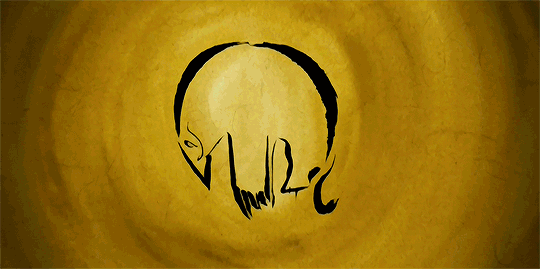
3) Symbolism. They could have embodied the Cave of Two Lovers perfectly: benders separated by cultural divide, a cave to meet in secrecy where outside conflicts are put on hold, allowing them to grow closer, to love one another.
Plus, what better way to bridge two nations with seemingly irreparable tensions than a marriage between lovers? These two went from enemies to partners in crime to friends. Imagine if they’d fallen in love. Imagine a water bender as Fire Lady, and what influence she could have on the Fire Nation’s perceptions of the Water Tribe. Imagine the prejudices she could shed herself, living in this new culture, serving its people.

4) They’re good for each other. Zuko needs someone who can help him shift his nation’s perceptions of the world. He needs someone who can take on responsibilities of her own, rally a crowd, bring hope to his world, and not only become a mother to his children, but his people. He needs a woman who, like his mother, can encourage him to be the best version of himself.
Katara needs to feel useful. She needs to feel like she’s helping people and making a difference. She needs to be more than a wife or a mother. More than a traveling companion. She‘s a caretaker, but she’s also a leader, and she needs a mature man in her life who she can leave alone, unattended for a while. Someone she can speak to about harsh realities. Someone who will not judge her for feeling negative. Someone who will understand her sarcasm, and who will vent with her when she needs it.

5) I have always shipped them for their potential, not necessarily what we were fed in the show. So I understand how others don’t see it. But as a writer, I recognize that this pairing could have been an extremely valuable storytelling tool. Aaron saw that, the actors saw that, but Bryke wanted Kataang, so we got the typical “hero gets the girl” scenario. I get it. I just wish they would have gone the extra mile.
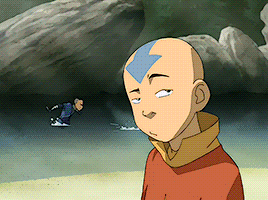
6) I don’t ship Kataang anymore
Aang is 12 years old. He’s a child (and a monk). That’s what makes the series work, why his victory is so powerful. His youthful innocence is a reoccurring theme throughout the series. And yes, he learns to accept many hard truths of the world, but in the end, he chooses mercy and idealism. As an adult, I can’t see him as anything but a child. And I don’t ship children. I definitely don’t want to see them make out with anyone 😷
Katara acts like his mother for most of the series. She’s his caretaker first and foremost. And it’s clear she loves him, but she’s not even sure how she feels about him several episodes from the finale of the series. I’m not about to act like their relationship wasn’t romantically coded, but it felt forced at the end. It felt like they set Katara up to be his mother more than his partner. It’s regressive to her feminist arc (and don’t get me started on Korra’s depiction of her!)
And yeah. I did not find 12 year olds attractive when I was looking forward to my first year of high school. If I had the choice between Aang and Zuko at her age, you bet your ass I’m swooning over the prince of the Fire Nation. 🤷🏻♀️

7) I really don’t ship Maiko. I love Mai as a character (gray characters are always fun). But her relationship with Zuko formed off-screen (never a good choice for a romance arc) and she was only ever regressive to Zuko’s character. She was never going to help him grow, to be a selfless leader, to consider the importance of other nations or the lower class (she jokes about ordering servants around for fun, big yikes). She couldn’t be a positive influence on Zuko until she had an enlightened journey of her own, which she didn’t get - her only arc revolved around Azula and her love for her boyfriend. She was a source of constant negativity and pessimim. That’s the last thing a leader of a war-torn nation needs.

So yeah. I’m not trying to convince anyone to ship my ship. I’m simply explaining why I love these two so much (since so many of you think it’s a bad boy fetish), and why I reject the pairings the show left us with.
I think Zutara would have created a stronger narrative for a near-perfect show, a better romance, and a more relatable protagonist, and no one will ever change my mind about that.
2K notes
·
View notes
Note
You talk a lot about how the Digimon are born from the kids own souls, would you be interested into describing how the digimon partners reflect their humans' personalities?
Oh man, I love this topic! (You’ll have to forgive me in that my desire to do justice for it is why it ended up taking me this long to answer it.)
The part about the Digimon literally being part of the kids’ souls comes directly from official (it’s been mentioned several times, not only in what I just linked). This was never stated outright in the original Adventure or 02, and it took until Kizuna to really shove the link between the partner and the human’s inner self in your face and make it a huge part of the actual story, but fans had been catching onto it long before that, and even without reading what the staff had said. Kizuna throws a bit of a nail in this because it’s said to be a bit lore-noncompliant, but considering how much of the background lore it still goes out of its way to adhere to, and the fact it still does match the fundamental concept of “human heart = Digimon partner” regardless of detailed minutiae, we can still apply and analyze this concept with no problem, especially since Adventure and 02 always walked the line between sci-fi and fantasy, and there is undoubtedly a spiritual element to them no matter how you look at it.
(My personal comfort zone in analyzing Adventure and 02 comes moreso from a human behavior and mentality perspective, which is also why my meta on this blog tends to focus more on the human drama aspects of Adventure and 02 and especially the latter’s story being so heavily about human relationships, but if you’re interested in said spiritual elements, I heavily recommend @analyzingadventure‘s very comprehensive meta on Adventure background lore and themes, which also covers similar territory in detail. We’re different people, so our takes on it probably differ in some respects, but that’s the beauty of having different perspectives, after all.)
In any case, back to your question. I think it would be best to break this down piece-by-piece with the Adventure and 02 kids in detail, so more is under the cut!
...Well, okay, before we continue, I do want to touch on something briefly, and it’s regarding the fact that “evolution” in this series is generally a metaphor for human growth. That counts for when everyone gets their evolutions, but it also counts as a metaphor overall -- after all, Adventure is about self-assertion and pushing oneself as far as possible (the major evolution gimmick being tied to Crests), whereas 02 is about cultivating differing aspects of yourself and applying it to how you form relationships with others (the major evolution gimmick being tied to Digimentals and ultimately Jogress). The human self is quite a flexible thing, and the Digimon themselves quite often change personalities as they evolve. (I touched on this briefly in my discussion of honorfiics and first-person pronouns earlier, but in Japanese, the Digimon will often even change personalities and speech patterns as they evolve.) This also leads to a few other potential observations (not really corroborated by official, just my personal view of it):
Speaking from a meta perspective, the fact that only the “front protagonists” end up getting the highest level forms is pretty obviously so they don’t have to spend toy budget on allocating it to everyone, but from an in-story perspective, Adventure episode 50 adds an implication that not reaching as high of a form may also have to do with how inherently attuned one is to combat (Jou says that he believes that Gomamon will never reach Ultimate because he doesn’t have the sort of strength Taichi and Yamato do, and it contributes to his conclusion that his skills are more meaningfully applied as a healer instead of as a fighter). Of course, none of the Adventure or 02 cast is necessarily the belligerent type that inherently likes fighting in itself, but of course certain ones are less emotionally drained or more attuned to it, so you might be able to see a rough pattern there. (Again, I’m not going to sugarcoat how this still has a lot of dismaying issues on the meta level, but the difference between “how much this sucks on a meta level” and “whether this at least tracks in-story” is a common theme on this blog.) In a franchise sense, Digimon were of course conceptualized as fighting monsters, but within the narrative of Adventure, it probably stands to reason that having a manifested part of your soul or inner self shouldn’t necessarily mean they have to be fighting things all of the time unless it’s necessary.
It’s very often been pointed out that the 02 cast is at a sort of “combat disadvantage” compared to their seniors (well, and Takeru and Hikari, anyway) because their highest forms require two people/Digimon to be in play, so their overall combat power is rather low. My impression is that this is by design (and it’s a subversion of the usual expectation of shounen anime sequels where the sequel will often power creep everything to make the new guard outdo the first). That the 02 team is inherently dependent on each other for support, and to a degree far more than their seniors, is rather baked into its narrative, and moreover, from an in-story perspective, the 02 group doesn’t seem like the type to really care about being outflanked by their seniors (on the contrary, they’d probably take that as more proof that their seniors are amazing). Moreover, the forms you see their Digimon in most of the time tend towards the smaller Baby-level forms instead of the Child-level ones, and while this is partially due to plot logistics about being in the real world (and, admittedly, kind of inconsistently applied), it gives you a much stronger impression of the 02 kids and their partners in general being people who aren’t that individually imposing or strong and get more mileage out of flexibility and variety (see: the Digimentals and the huge number of lower-level forms the kids have access to).
With this kind of metaphor, I caution against taking it too literally as a 1:1 thing (especially since official has been generally quiet about it and there isn’t much in the series text itself to corroborate this), but I do think there is certainly some kind of relevance that’s worth thinking about.
Many people, including the official notes I just linked, refer to there being some Digimon partners that are "like-minded” with their partner, and some that are “opposite” in personality. This is roughly true, but I find this to be a very simplified description of the concept; it’s more like all Digimon partners are a reflection of the less easily exposed part of their human partner (and, most pertinently, the part that would allow them to express themselves in ways they wouldn’t normally), it’s just that the kids with more straightforward or less extreme personalities don’t have as much to hide or cover up in the first place, and so their partners come off as more “like-minded”. Even Urawa Megumi, voice of Iori and Armadimon (arguably one of the pairs of partners that seem “opposing” in personality), stated that she didn’t personally feel like the two characters are all that different, since humans have different sides to them, and Armadimon is functionally an expression of the side of Iori that isn’t apparent.
Because the Adventure narrative has the Digimon partners be linked to human mentality, this leads to the side effect that you won’t have a Digimon partner who ever truly denies the human partner (barring external factors like Evil Ring-induced brainwashing), which is something producer Seki Hiromi was quite insistent about. That said, this is a very Adventure and 02-specific thing, since other series go more into different angles about how one would approach partnership when this factor is not in play; half of Tamers’s drama regarding partners comes from the fact they are not necessarily mentally linked all of the time, and need to find a way to build a relationship by bridging that gap, and so non-Adventure universe entries are more freely able to explore the concepts of a Digimon partner more consciously entering conflict with their human partner. Well, that’s the beauty of having a multi-entry franchise, after all.
Taichi and Agumon
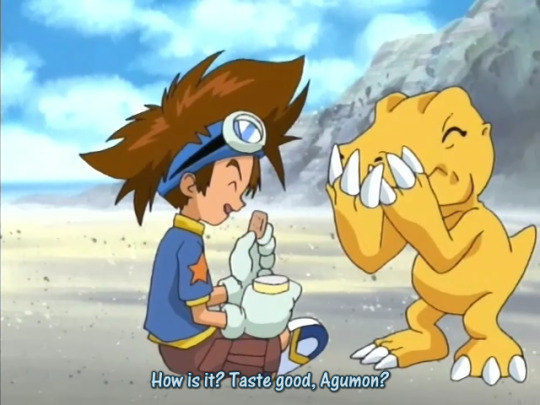
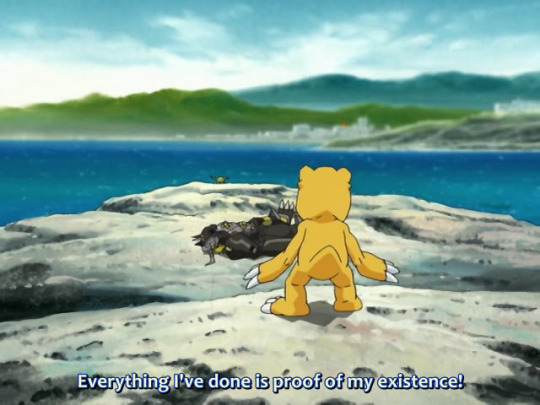
Taichi and Agumon immediately jump to mind as the first among the “like-minded” pairs, especially since the series shows them so often in sync and chilling together. Taichi himself is a straightforward person, so it stands to reason that his straightforward personality would also lend to Agumon coming off as being rather much like him.
However, there is one slight difference between the two, and it’s that Agumon has a somewhat stronger sense of “easygoing chill” than Taichi does, right down to using the more polite boku first-person pronoun in contrast to Taichi’s more assertive ore. He also lacks Taichi’s penchant for mild insensitivity -- in fact, very unlike Taichi, he has an incredible amount of emotional insight (02 spends quite a bit of time in 02 episodes 32 and 46 to showing off Agumon as someone who makes up for all of his lack of intellectual understanding with emotional and borderline poetic insight). And, really, while Taichi is a bit surface-insensitive, and while he seems to be impulsive, he actually is a conscientious person and is trying his best in his own way, and he isn’t the kind of person who cares about societal things like seniority, and he demonstrates multiple times that he’s easygoing and chill, and so you can say that’s a part of Taichi as well. Remembering that a Digimon partner’s presence helps their own human partner grow, Agumon being so openly friendly helps Taichi maintain good relations with others without running afoul of them.
One of Agumon’s most famous traits is that he likes food, which is not actually something that was in the original Adventure or 02 all that much but has been somewhat exaggerated since. That said, back in Adventure, while it was established that all Digimon regularly need food in order to maintain their evolutions, Agumon would usually be the first to complain “I’m hungry,” and whenever they did get food, Agumon would be one of the most prominently enjoying it. Food is, after all, one of the simplest and most universal of pleasures, and there’s a lot of visual framing of Taichi chowing down just as ravenously as Agumon is -- so, honestly, he probably got it from him.
Taichi also speaks a bit about his pain of being separated from Agumon in the space between Adventure and 02, and he directly refers to Agumon as “the other me”. The word “partner” was not actually used very much in the original Adventure or 02, and Taichi is not able to fully elucidate the sentiment of Agumon’s connection to his own self, but he still understands this much and why the loss cuts him so deeply, and by the time we get to Kizuna, it’s presumably why he uses similar language in his thesis proposal to refer to him. (I already covered the circumstances of Agumon’s relationship to Taichi’s existential crisis in Kizuna and how it led to their separation earlier, so I will omit it here for the sake of avoiding redundancy.)
Yamato and Gabumon

This might surprise some people to hear, but I would also pin this as one of the more ostensibly “like-minded” pairs. Gabumon is shy on the surface, but turns out to be quite passionate -- he uses the same assertive ore as Yamato, in contrast to Agumon’s boku, and he demonstrates his capacity for passion and action in that he’s arguably one of the most assertive in the cast. Note his taking initiative against Yamato’s frostbite in Adventure episode 9, or declaring his intent to stay with Yamato even if it means going against the others in Adventure episode 44, or singlehandedly dragging Yamato out of the hole of darkness in Adventure episode 51.
And, of course, Yamato himself is someone who initially seems a little awkward or detached around everyone, but is actually very passionate, so that’s all the same. And because Gabumon himself is so open about communicating with the otherwise closed-in Yamato, Yamato is able to express himself better over the course of Adventure.
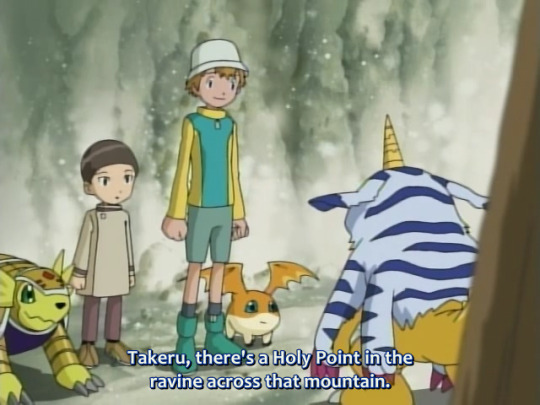
Funny thing about that “shyness”, too -- the idea of Gabumon being particularly shy isn’t present in 02 much at all (we don’t get to see him very much, so it’s hard to say whether it’s completely gone, but it’s at least gone enough for the duration of his appearances). Which is funny, considering: guess who else stopped being shy and became naturally outgoing in 02? Yeah, so, as much as you might hear people (even official!) claim that the Digimon are static while their partners change, that’s not completely true -- the Digimon themselves develop in personality in the same way their human partners do. It’s just more subtle and less drastic, since they’re representing an abstract single part of their personality rather than being an exact match.
Sora and Piyomon
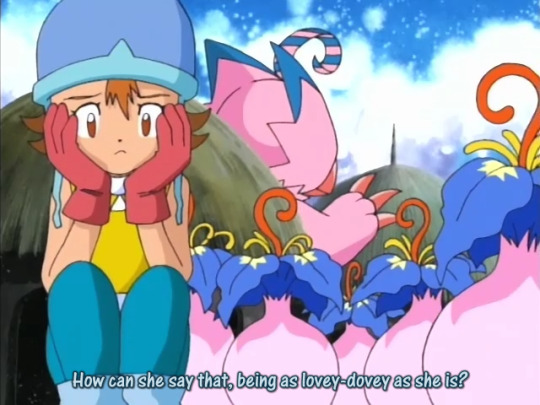
Sora and Piyomon have an interesting relationship in that they’re the only one where their relationship started off on a note of conflict -- mainly in that Sora was very put off by Piyomon at first and even looked down condescendingly on her (well, only for the duration of a single episode). In fact, Sora’s own surface behavior is very different from the kind and caring Sora we know -- Sora dislikes associating with the clingy and affectionate Piyomon for being “mushy”, and even declares that she doesn’t want to “take responsibility” for lugging her around.
Of course, Sora’s character arc later revolves around the fact that she has abysmally bad self-awareness and doesn’t even realize that she has a compulsive sense of responsibility to others. So Sora is affectionate and loving -- she just puts up a front of trying to act a little above that (well, at least, during this part of the series) and doesn’t even see herself as someone capable of being like that (again, purely during this part of the series).
Piyomon is also interesting in that she has one of the most dramatic personality shifts even as early as Child to Adult, where she suddenly switches from the casual atashi to watashi (sometimes even kono watashi, which is super regal), and becomes incredibly dignified and regal even as Birdramon, and you can certainly see why Sora immediately started taking her seriously thereafter. It also begs a lot to think about, considering Sora’s very convoluted character and the many layers of herself that even she isn’t consciously aware of.
The way Piyomon helped Sora shift her own mentality is pretty directly handed to you on a plate in Adventure episode 26 -- because Piyomon played the role of Sora in the metaphor of Sora’s behavior towards Piyomon correlated to Toshiko’s behavior towards Sora, Sora was able to re-adjust her position relative to her family and consider her both someone capable of love, and someone who is loved.
Koushirou and Tentomon
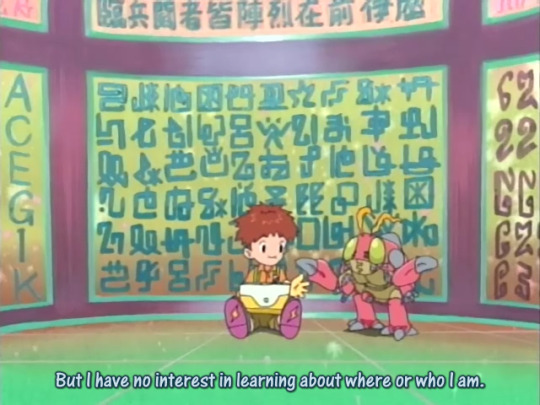
Koushirou and Tentomon are another pair that initially seem like they’re opposing types, with Koushirou being constantly curious and Tentomon being comparatively simple-minded, but the first key to figuring out where the similarity is ends up being a bit deceptive -- Tentomon says in Adventure episode 5 that he’s not particularly interested in himself. And, certainly, Koushirou is interested in Tentomon, but he, too, is not interested in himself -- in fact, he considers himself to be a topic he’d rather avoid instead of looking into everything else.
As far as language goes, while Tentomon does also use the stereotypically easygoing Kansai dialect, he also specifically uses the polite form, mirroring Koushirou’s own perpetual use of polite language. But unlike Koushirou, who uses it to keep distance from others, Tentomon is in fact very sociable, and is even portrayed as a Digimon who’s conscientious of others and “takes care” of them. And because Tentomon is so openly friendly, he manages to coax Koushirou out of his shell and allow him to think about more complicated things related to his own position in the world that he’d been avoiding.
As Koushirou’s character arc proceeds, we learn that he’s polite not only out of distance but also because he really is a very kind person, and moreover that he does eventually want to open up to others. And the payoff for this eventually comes in 02...

...when he ends up becoming one of the most visible members of the older Adventure cast to appear in the series, checking in on the younger kids and developing into someone capable of organizing and managing people. Hmm, seems familiar.
Mimi and Palmon

This one’s an easy one. Mimi is possibly the most straightforward person in the original Adventure cast -- well, that’s the point of her Crest after all -- and so Palmon is almost exactly like her, being a cheerful type who loves being cute. Any contrast between them is only really apparent in the very early episodes of the series, and that’s not even a contrast in theory as much as it’s just something that might intrigue audiences at first when Mimi spent a lot of those episodes complaining, but that’s also mostly because she was heavily under stress, and otherwise Mimi has always been kind and cheerful and indulgent in being cute.
Perhaps the only real difference is that Palmon, being a plant, is more willing to get involved with dirt and other things that Mimi ostensibly would rather not, but as the series progresses, Mimi manages to gain a higher sense of tolerance and get past her initial sense of materialism (which is something she’d had the capacity for the whole time).
Jou and Gomamon

Of the Adventure pairs, this one is probably the one that seems like the biggest contrast on its face, with the overly high-strung and constantly stressed Jou, and the more playful and relaxed Gomamon.
In the end, Jou is someone who’s defined by his desire to support others, and even admits at the end of the series that he’s better suited for a support role than for fighting, and that there’s nothing wrong with that as long as he continues to channel his desire to help people in a way he’s most comfortable with. So, in the end, he’s not actually an inherently aggressive type. And, meanwhile, Gomamon is the kind who’s constantly looking out for Jou, to the point of knowing (such as in Adventure episode 7) when he’s about to do something phenomenally stupid and minding him so that nothing bad happens to him, and so, this is probably why they’re ultimately able to settle down and end the series eye-to-eye (or perhaps hand-to-hand).
And, again, recall that Digimon partners generally reflect a part that’s vital to their own human partner’s growth; considering that Jou is most certainly one of the more extreme personalities in this cast, you get the feeling that he probably needs someone this chill to keep his massive stress tendencies in check.
Takeru and Patamon

Takeru and Patamon are an interesting case largely due to the two of them being so present for a whole two series. In Adventure, both of them seem to be largely like-minded, being playful, innocent, and childish -- although Patamon is more open about expressing the childishness that Takeru keeps trying to cover up. Patamon being roughly on the same playing field (no pun intended) as Takeru means that Takeru has someone he’s willing to be open with and let himself loose a little (such as in Adventure episode 12), because for the first half of the series, he’s almost entirely in the presence of elders and stifling himself for the sake of being “well-behaved”, and it starts his long journey of being able to understand his position and his actual sense of emotions over the course of Adventure and 02.
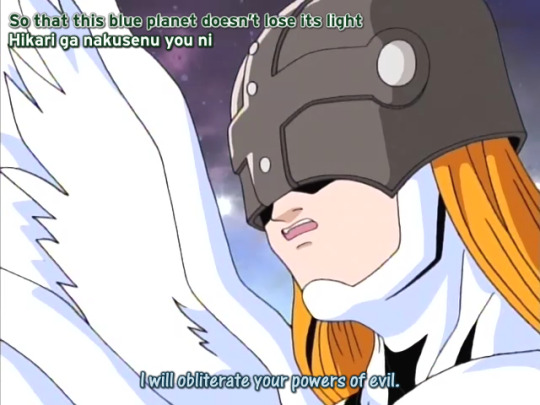
Patamon also has a striking personality change upon evolving, becoming the regal and dignified Angemon, and, interestingly, his appearances have a very “knight templar” vibe where he takes a no-compromise stance against dark forces and states that he’ll condemn all of them to oblivion. This is a stance that’s unnervingly similar to Takeru’s own no-compromise stance against the darkness in 02, and it’s interesting in that Takeru himself had been advocating for pacifism in Adventure episode 12, but this incident traumatized him enough to start taking a position that more resembled Angemon’s.
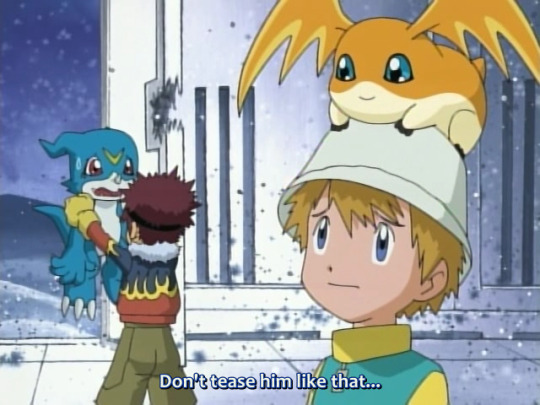
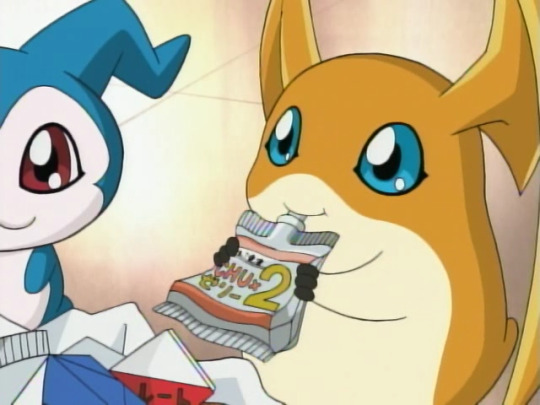
As we go into 02, Takeru’s contrast with Patamon initially seems like an increased mismatch, since Patamon is still ostensibly childish and playful while Takeru is ostensibly more mature. But for one, Takeru’s character arc is about the fact that he’s still pretending he’s more in control of his emotions than he actually is, and in some way you can also glean that there’s a sort of naivete present in his character that he keeps covering up with confident smiles. Patamon, for his part, does actually seem to have adopted a bit of a mentor role to the other Digimon, and we also learn that he’s capable of deliberately trolling people instead of just being generically playful -- much like Takeru himself, who’s a bit evasive and not entirely honest.
We do actually see Patamon reach HolyAngemon in 02 episode 34, but it doesn’t work out well, and while this is partially for plot mechanic reasons, it also says a lot that the “knight templar” stance that both Takeru and HolyAngemon have, with the full depth of no-compromise, isn’t going anywhere, and in the end, something more effective is only possible when Shakkoumon appears in 02 episodes 36-37 -- that is, Takeru is only able to better move on with Iori’s support.
Hikari and Tailmon
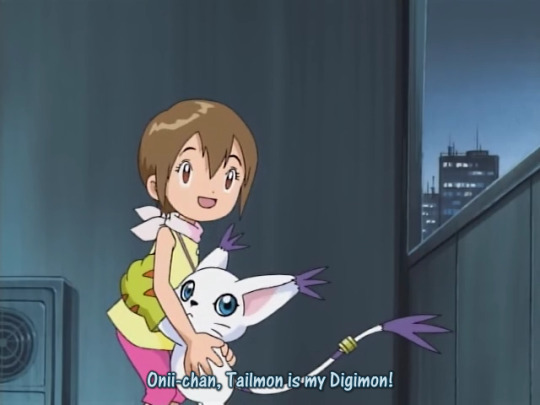
Hikari is the only of the Tokyo Chosen Children to have a Digimon who “defaults” to Adult instead of Child or lower, and it means that Tailmon herself comes with a certain amount of maturity -- on top of having been become a bit hardened due to her experiences being isolated. This is an ostensible contrast to the more pure-hearted and innocent Hikari, but note that Hikari’s own will can be pretty assertive when it comes down to it. On top of that, as much as Tailmon is a bit standoffish, Hikari is also “emotionally isolated” -- she has trouble vocalizing her negative feelings, and it’s difficult for anyone in Adventure or the first half of 02 to truly connect with her internal thoughts. Recalling that the Digimon partner reflects a side of the human partner that’s less easily exposed and allows the human partner to grow in ways they wouldn’t before, Tailmon’s sheer presence gives Hikari a route to action in ways she probably wouldn’t have beforehand.

In 02, Hikari becomes a little more mischievous and playful, and Tailmon also becomes a bit more willing to indulge (she even switches first-person pronouns in sync with Hikari, going from the more polite watashi to the more casual atashi). Both of them are now more able to enjoy themselves more openly. That said, Tailmon still has a certain degree of stuffy personal pride (she snarks at everyone quite easily for fussing over snacks in 02 episode 3), and Hikari herself remains emotionally elusive and repressive at the start of this series.
Tailmon evolves temporarily to Angewomon in 02 episode 13, which is the first time anyone (in this case, Takeru) makes some degree of headway to reaching out to her and allowing her to open up a bit more, but it’s not until 02 episode 31 when Hikari is fully reached out to via Miyako, which marks the first appearance of Silphymon.
Daisuke and V-mon

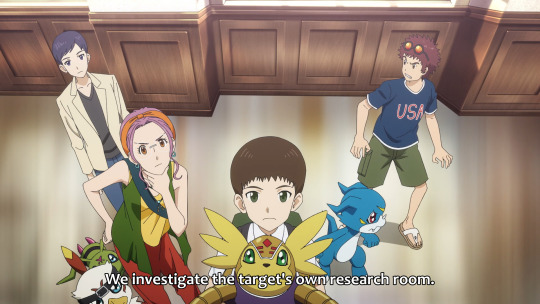
Now here’s a very like-minded pair, even more so than Taichi and Agumon -- and, after all, Daisuke is simple-minded, so painfully simple-minded that he’s practically incapable of hiding anything, and so V-mon is almost exactly like him, down to using the same ore pronoun and being feisty and mischievous (a point is also made that he plays soccer with Daisuke, something that Agumon didn’t necessarily do with Taichi), and, heck, in a rare show of Digimon-Digimon crushes, has a crush on Tailmon in the exact same way Daisuke has on Hikari. (By the time we get to Kizuna and its higher animation budget, a lot of attention is paid to having even their body language mirror each other.)
There is only one real functional difference between the two in disposition, and it’s that V-mon is very straightforward, friendly, and kind, without being prone to getting angry or spiteful at anyone, and in the end, it’s indicative of the fact that Daisuke’s tendency to lash out defensively at everyone is just a front -- at his core, he’s friendly, supportive, and kind. Daisuke’s experiences and banter with V-mon contribute to him getting the sort of validation he needed without having to worry about being on edge or lash out defensively, and because of that, he was able to form a healthier and more supportive relationship with the rest of the group.
Miyako and Hawkmon
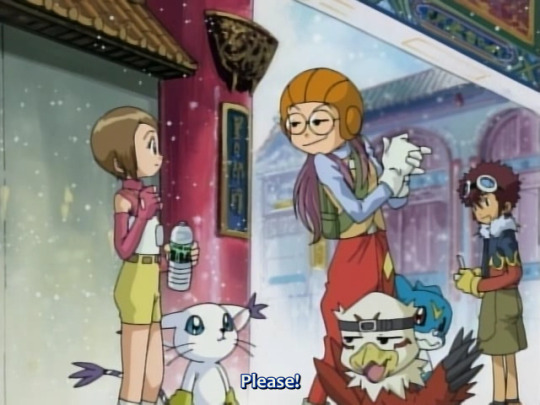
This one seems to be a contrast right off the bat -- Miyako is bubbly, over-the-top, and rather messy and lacking in restraint, whereas Hawkmon is formal, graceful, and polite. But Hawkmon’s most prominent trait is his absolute loyalty and devotion to Miyako -- he’s very often referred to by both official staff and fans as her “knight” -- and is constantly minding her to protect her and make sure she doesn’t go over her head (most prominently, 02 episode 18). And as far as Miyako’s relationship to others goes -- she’s also devotedly loyal to everyone she loves and is constantly going out of her way to help others, and her character arc in itself is about the fact she wants to do her best to reach out to people and help emotionally support them in the best way she can, and Hawkmon managing to channel that to its utmost extent to Miyako in turn (in a very “who watches the watchman?” sense) allows her to regain her bearings and have better control over herself in the aftermath of 02 episode 18.
On top of that, as the series proceeds, it turns out that Hawkmon also shares Miyako’s penchant for dramatic theatrics and being a bit over his head -- even if he seemingly has himself more together than Miyako does, he’s not completely above it all...
Miyako is also the franchise’s first example of a female character with a masculine Digimon partner, and while Miyako herself openly identifies with and indulges in all things hyper-feminine, she also has zero issue engaging in more masculine-associated things as they suit her -- most prominently her Digital World outfit, and the fact she often displays a rather aggressive go-getter and hot-blooded/in-your-face personality that would not be out of place on a male shounen hero in a more conventional show. (Although, as much as these have generally been on the thread of “less visible aspects”, it’s not like this was that less visible of an aspect of her to begin with...)
Iori and Armadimon
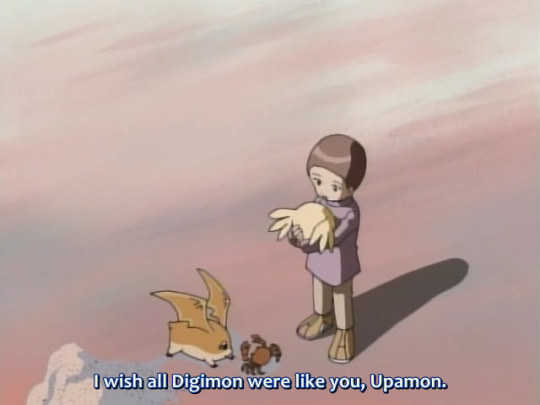
Iori and Armadimon hold the honor of being the only pair in the Tokyo Chosen Children to be voiced by the same voice actress (Urawa Megumi), driving the parallel down even further. And while their surface temperaments seem different, with Iori being rather uptight and strict on himself while Armadimon is laid-back, carefree, and even somewhat assertive, they’re not that different -- Armadimon is basically the curious, impressionable, somewhat childish spirit that Iori would be if he weren’t constantly holding himself back. (There’s a lot to be said about Submarimon going out of his way to take Iori for a ride in 02 episode 16 so that Iori can finally properly enjoy himself for once.)
Iori takes a lot of very stubborn, no-compromise positions over the course of 02, but Armadimon asking just the right kinds of questions allows him to “snap out of it” and be a little more receptive to considering alternatives, or at least taking into account more emotionally-oriented issues he’s dealing with. You can say that Armadimon (especially as Upamon) softening Iori up a bit -- since Iori will never be cold or unforgiving towards his partner, no matter what -- serves as a precursor to Iori starting to question the limitations of his black-and-white view of morality, which allows him to successfully break through to Takeru and fill out the rest of his character arc.
Ken and Wormmon
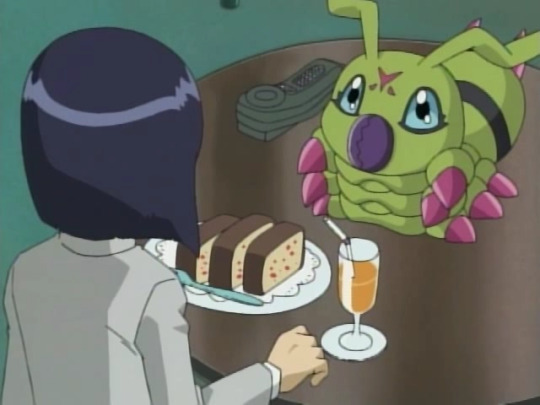
Considering how much of the plot revolved around this one, this one almost goes entirely without saying! During Ken’s stint as the Kaiser, Wormmon represents the heart that Ken’s not entirely willing to leave behind -- and, also, the affection that he’s still craving from his family. The Kaiser going practically out of his way to deny Wormmon yet paradoxically keeping him around is basically his attitude towards his own “weak” and naturally kindhearted self. Notably, recall that the principle of “a Digimon will never deny their partner” applies here -- Wormmon’s “betrayal” of the Kaiser isn’t really any kind of denial, since he was doing it mainly for Ken’s own sake, and, more symbolically, it’s Ken reaching his own limit and coming to realize that this path isn’t what he really wants.
Wormmon is unusually clingy to his own partner over the course of 02, and it’s vital to Ken needing to learn to love himself and also getting important validation that he needs, especially during the critical point in time during 02 episodes 23-30 when he’s still not sure how to approach the rest of the group -- Wormmon gives him someone to talk to honestly and openly, giving him a proper springboard to sort out his complicated feelings about the others and himself. You can say also that as Ken becomes more open and straightforward over the course of the latter half of 02, he, in turn, becomes much more shameless about showing affection and opening his own heart.
Wallace, Gumimon, and Chocomon
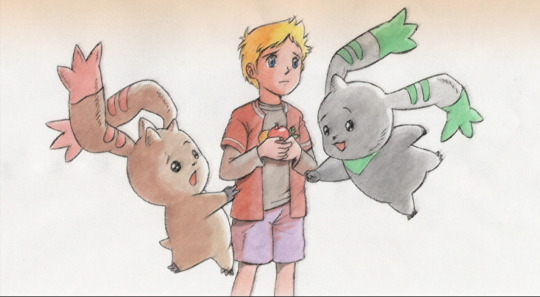
Bonus round!
While it’s hard to fully apply Hurricane Touchdown to this theory (by official admission, it wasn’t properly cross-referenced with the original Adventure/02 series lore, and trying to correlate all of the evolutions in this movie to something metaphorical will give you a headache), Wallace’s two partners still fit very neatly into this overall theory of Digimon partners as a part of the self. Wallace is a character with very sharp duality, trying to be a flirt who asserts himself as a vagrant who’s about to “become an adult”, yet still feels an obligation to keep calling his mom and is engaging in increasingly self-destructive behavior.
Most pertinently, Gumimon and Chocomon represent the two stances Wallace is torn between: wanting to “return to the past” (Chocomon) because he’s still hung up on having lost Chocomon and is convinced that he can make everything just like it was before, and “being able to productively move on” (Gumimon). For most of the early parts of the movie, Wallace is stuck on Chocomon’s mentality of fixating on the past, and Gumimon isn’t even remotely subtle when he draws an explicit parallel between the two (saying that Chocomon didn’t like the heat, followed by offering to give Wallace shade as a hat). But once the conflict escalates and Wallace realizes just how deep in denial Chocomon is, to the point of being destructive to himself and others, Wallace comes to embrace Gumimon’s stance of practicality and moving on. In the end, the ultimate conclusion is reached, and Wallace is forced to fully accept that latter stance when Chocomon dies, but the movie’s ending (and Kizuna) provide an extra option: allowing the past to come back, but in a new form and treading new territory instead of trying to make it “the way it was before”.
#digimon#digimon adventure#digimon adventure 02#digimon adventure last evolution kizuna#kizuna spoilers#qwertyshuman#shihameta#shiha's ask box
200 notes
·
View notes
Text
My Top Ten Overlooked Movies With Female Leads In No Particular Order
Note: When you see this emoji (⚠️) I will be talking about things people may find triggering, which are spoilery more often then not. I mention things that I think may count as triggers so that people with them will be aware before going in to watch any of these.
Edited: 3/16/21
Hanna (2011)
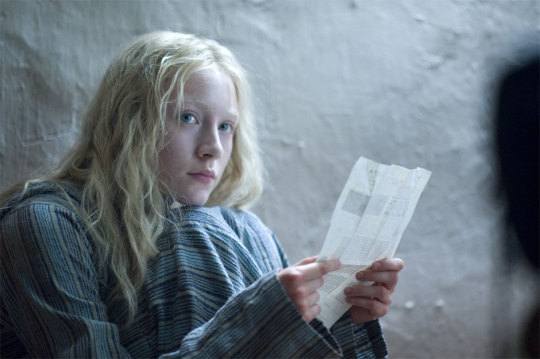
So, before I get into why you should watch this movie, I just want to take a moment to say why it's near and dear to my heart. Growing up as a queer kid in the early 2000s, seeing portrayals of people like or similar to myself on anything was rare at best. It was mostly in more "adult" movies or shows that my parents would occasionally let me watch with them that I'd see any lgbtq+ rep at all. Often times they were either walking stereotypes, designed to be buried, evil, or all three.
Then here comes this PG-13 action thriller with a wonderfully written main female lead who, at the time, was close to my age, and who got to kiss another girl (her very first friend, Sophie) on screen in an extremely tender and heartwarming scene. To say the least, it was a life changing moment for me personally.
Now that I've gotten that out of the way, Hanna is a suspenseful movie about a child super-soldier named, you guessed it, Hanna (played by Saoirse Ronan) and her adoptive (?) father Erik Heller (played by Eric Bana) exiting the snowy and isolated wilderness of their home and taking on the shadowy CIA operative, Marissa Wiegler (played by Cate Blanchette) who wants Erik dead and Hanna for herself for mysterious reasons.
It also has an amazing soundtrack by the Chemical Brothers, great action scenes, and it has an over arching fairytale motif, which I'm always a sucker for.
⚠️ Mild blood effects, some painful looking strikes, various character deaths, and child endangerment all feature in this film. However, given its PG-13 rating, a majority of viewers are presumably able to handle this one. Still, be aware of these going in.
Sidenote: It's recently gotten a TV adaptation on Amazon TV, although I have not watched it, and do not know if Hanna and Sophie's romantic/semi-romantic relationship has transferred over.
A Simple Favor

A Simple Favor is a "black-comedy mystery thriller" centered entirely around the relationship between two mothers, the reclusive, rich, mysterious, and regal Emily (played by Blake Lively), and the local recently widowed but plucky mommy blogger, Stephanie (played by Anna Kendrick). When Emily suddenly goes missing, Stephanie takes it upon herself to find out what happened to her new best friend.
It's a fantastic and entertaining movie throughout, with fun, flawed and interesting characters. The relationship between the two female leads is also implied to be at least somewhat romantic in nature, and they even share a kiss.
⚠️ The only major warnings I can think of is that the movie contains an instance of incest and one of the main plotlines revolves around child abuse, although both of these potentially triggering topics are not connected to each other, so there is thankfully no csa going on.
Edit: I legitimately forgot there was drug use in this movie until now. So, yeah, if that's a trigger, be careful of that.
I Am Mother
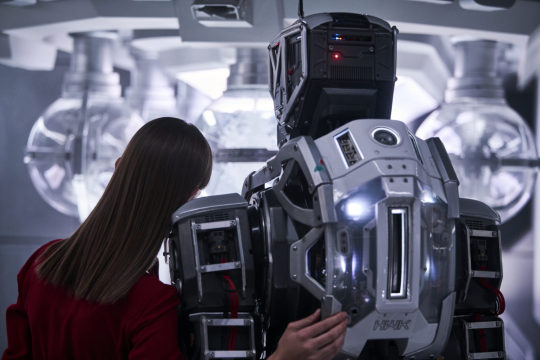
I became mildly obsessed with this movie when it came out. I Am Mother is a sci-fi film that centers entirely around a cast of two woman, and a female-adjacent robot who is brought to life on screen with absolutely amazing practical effects.
The plot is such, after an extinction-level event, a lone robot known only as Mother tasks herself with replenishing the human race via artifical means. She begins with the film's main protagonist, Daughter. Years go by as Mother raises her human child and the two prepare for Daughter's first sibling (a brother) to be born. However, on Daughter's 16th birthday, the arrival of an outsider known only as Woman shakes Daughter's entire world view. She begins to question Mother's very nature, as well as what's really going on outside the bunker she and her caretaker call home.
⚠️ This movie features child endangerment and reference to child death.
Lilo and Stitch
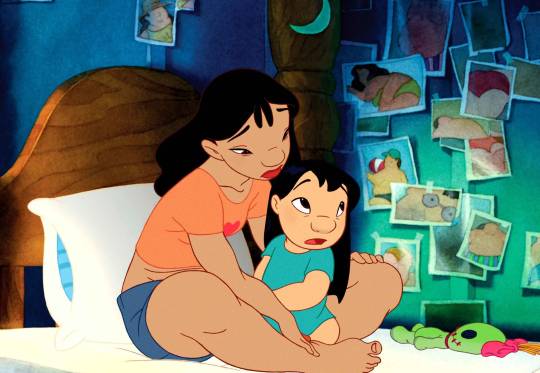
When I decided to add a single Disney film to this list I initially thought it was going to be hard but almost immediately my brain went to Lilo and Stitch, and specifically about the relationship between Lilo and Nani.
On the surface, this film is about a lonely little girl accidentally adopting a fugitive alien creature as a "dog," but underneath that the story is also about two orphaned sisters and the older sister's attempts to not let social services tear them apart by stepping up as the younger sister's primary guardian. Despite its seemingly goofy premise, Lilo and Stitch has a very emotional and thoughtful center. It's little wonder how this movie managed to spawn an entire franchise.
Despite the franchise it spawned (or possibly because of it), I often find that Lilo and Stitch is overlooked and many people only remember it for the "little girl adopts an alien as a pet" portion of its plot, and I very rarely see it on people's top 10 Disney lists.
⚠️ This movie could be potentially triggering to people who were separated from their siblings or other family members due to social service intervention. There's also a bit of child endangerment, including a scene where Lilo and Stitch both almost drown.
Nausicaä and the Valley of the Wind
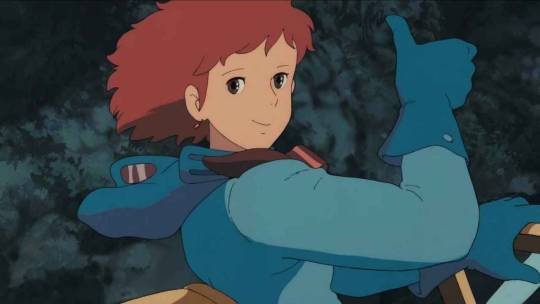
Unlike the above entry, I did struggle a little bit with picking a single Studio Ghibli film. Most media of the Ghibli catalogue have strong, well-written, unique, and interesting female leads so selecting just one seemed like quite the task.
However, I eventually settled on this particular film. In recent months, Princess Nausicaä has become my absolute favorite Ghibli protagonist and I'm absolutely enchanted by the world she lives in.
Set in a post-apocalyptic world overun by giant insects and under threat of a toxic forest and its poisoness spores, Nausicaä must try to protect the Valley of the Wind from invaders as she also tries to understand the science behind the toxic forest and attempts to bridge the gap between the insects and the humans.
For those who have never seen the film, I think Nausicaä's personality can best be described as being similar to OT Luke Skywalker. Both are caring, compassionate, and gentle souls who are able to see the best in nearly anyone or anything. She's an absolutely enthralling protagonist and after rewatching the film again for the first time in well over a decade she has easily become one of my all time favorite protagonists.
Whenever I see people talk about Ghibli films, they rarely mention this one, and when they do mention it, it's often in passing. In my opinion it's a must watch.
⚠️ This movie contains some blood, and the folks who either don't like insects or who have entomophobia may not appreciate the giant bugs running about throughout the movie. (Although most insects do not directly relate to real life bugs, and are fantasy creatures).
A Silent Voice

A Silent Voice is an animated movie adaptation of a manga of the same name. While I've never had the pleasure to read the manga, the movie is phenomenal. It covers topics such a bullying, living in the world with a disability, the desire for atonement, social anxiety, and depression in a well thought out manner that ties itself together through the progression of the relationship between its two leads, Shoya and Shouko. It's also beautifully animated. Although very popular among anime viewers, I've noticed that it's often overlooked by people who watch little to no anime. So I suppose this is me urging non-anime viewers to give this film a chance.
⚠️ As mentioned above, the movie deals with bullying, anxiety, and depression (with this last one including suicidal thoughts and behaviour). If discussion of those topics are triggering to you, than you may want to proceed with caution or skip this movie all together.
In This Corner of The World
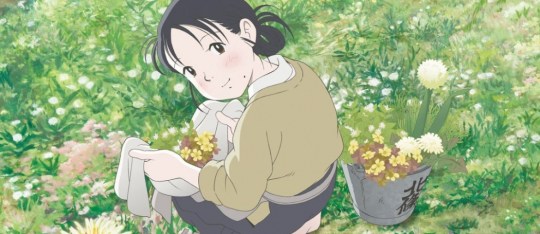
Another manga adaptation, this one taking place during WWII-era Japan. In This Corner of The World follows the life of a civilian Japanese woman, Suzu Urano, as she navigates simply living and her new marriage as the wartime invades nearly all aspects of everyday life. I think this movie is a good representation of what it must be like to be living as civilian in a country at war where the fight is sometimes fought on one's own soil. It was also an interesting look into pre-50s Japanese culture in my opinion. It's also beautifully animated featuring an art style I don't see often.
Despite it being well known among anime fans, I never really see it be brought up, even among said anime fans themselves.
Side note: I've seen many WWII dramas centering around civilians but they've almost always been about American or UK civilians. This was the first movie I'd seen that features the perspective of a Japanese civilain.
⚠️ Features the death of a child and limb loss. There's also a disturbing scene featuring a victim of one of the atomic bombs near the end.
Wolf Children: Ame and Yuki
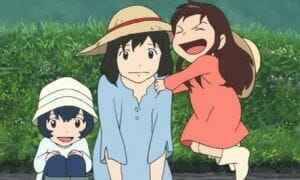
This film follows Hana, a Japan-native woman who fell in love with a magical shape-shifting wolf-man, and her trials with raising their children, who can also magically shape-shift into wolves, on her own. It's a very heartfelt movie about a mother's love and the struggles of doing right by your children when you have limited resources to actively guide and care for them. All the characters feel unique and alive in my opinion. Also, the animation is so good that my sister and I initially mistook it for a Ghibli film.
Again, like the previous two anime entries, I don't see it ever brought up outside of anime circles.
⚠️ There's some child endangerment present in the film, although none of it is the fault of Hana as far as I can remember.
Roman Holiday
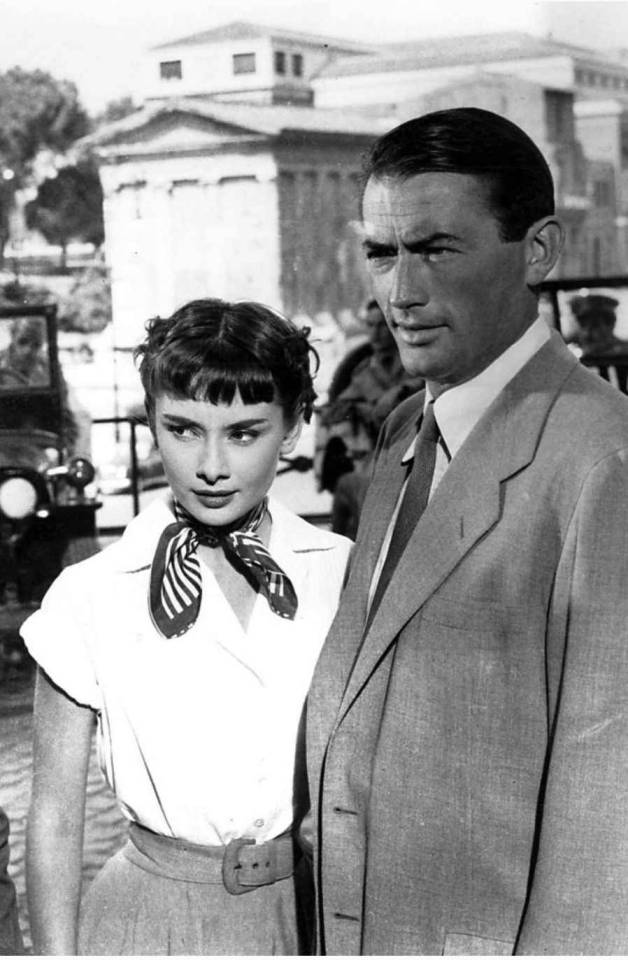
Roman Holiday is about the fictional Princess Ann (played by Audrey Hepburn), who while on a whirlwind tour of Europe, finally reaches her breaking point over having her entire life be one big schedule and all her words and actions being rehearsed. In the spur of the moment, she runs away in hopes of experiencing what life is like for other women. Unfortunately, she was previously given a sedative, meaning she doesn't get too far before it takes effect. Fortunately, she is found by the kind reporter Joe Bradley (played by Gregory Peck). Believing her to be drunk and unable to get an address from her (because she has none) he ends up taking her home for safety's sake and allows her to sleep off her suppose drunken stupor. The next day, he realizes who she is, and decides to take her on a fun sight seeing trip across Rome in hopes of getting the big scoop. Along the way, they begin to fall for each other.
This is my favorite black and white, old romance film. I think the relationship between the main characters is absolutely beautiful and I have a lot of fun watching it.
⚠️ I'm not entirely sure what kind of warning this film would need. However, it was released in 1953, so values dissonance will probably be at play for many viewers to at least some extent. For example, early in the film Ann is given sedation drugs by her doctor for her behavior, something that is very unlikely to happen today. Also, Mr Bradley deciding to take Ann home to keep her safe rather than call the police or an ambulance is a very pre-90s decision in my opinion.
#hanna 2011#a simple favor#i am mother#lilo and stitch#nausicaä of the valley of the wind#a silent voice#in this corner of the world#wolf chilren ame and yuki#wolf children#roman holiday#black and white film#anime#disney#studio ghibli#movie recs#top 10
177 notes
·
View notes
Text
In Defense of Teenagers:
Ok so. There seems to be a general consensus that Teenagers doesn’t fit on the black parade or that it ruins the trajectory of the album or that the song order of bp needs to be changed to fit the b-sides and drop Teenagers, or it should have just been a single- basically any option other than its inclusion between Sleep and Disenchanted would have been better. now, i’m not here to tell anyone that they’re wrong- i just want to offer an alternative perspective because i truly believe Teenagers is right where it belongs and that its inclusion on that album is, in my opinion, completely necessary to the album’s narrative arc. I want to focus on the way Teenagers builds into the foundation of the Concept Record, the way it bridges the gap between Sleep and Disenchanted so as not to delegitimize Disenchanted’s impact, and the fact that no other available material fits into the struggle the Patient endures at the end of the narrative (sorry this got LONG here’s a read more)
So, before we get into the meat of Teenager’s narrative significance, i wanted to briefly mention the way it makes Black Parade a more cohesive whole in relation to the material it is mimicking. Like Black Parade as an album is structured very differently from Pink Floyd’s The Wall- but it takes a lot of the same beats and recontextualizes them for a new purpose. Both records use war and relationship troubles and school and drugs to create an atmosphere that leads to disillusionment. In The Wall, this is quite literally the protagonist, Pink, building up “bricks in the wall” that isolates him from the rest of society and lead to a downward spiral into cynicism and hate. But Black Parade uses the same tools that The Wall does to say something different- things, specifically the actions you've made or the trauma you've endured, haunts you and makes your life seem insignificant in the face of what happens to you and those regrets are what causes the Patient to fall into a cycle of damnation and cynicism. This is representative of the Patient's descent through the afterlife- each new "layer" of the Patient's exploration is equivalent to a brick in The Wall's metaphor. Additionally, in this new context, this song in particular takes The Wall’s discussions of adolescence and the vice-grip control older generations attempt to force on teens and the disillusionment with the future and retells it from a new perspective- both literally in the fact the song is now more reflective of the 2000s post-9/11 and post-columbine culture, but its also literally from the perspective of the Patient as an adult. Teenagers, as a result, becomes a necessary piece of that puzzle- it is the refraction of Another Brick in the Wall repurposed to mean something new entirely- it’s no longer about kids being forced into complacency by a cruel education system from their own perspective (the children’s choir allows them to speak for themselves) but about the ways in which adults see those kids and why they decide to enact actions similar to those within The Wall. I mean even the imagery used in the song’s music video is purposely almost plagiarizing The Wall- it feeds into a separate analysis of the video and song outside the narrative as well- which i don’t have time right now to get into, its just very interesting that the band is bodily removed from their instruments at the end of the video and the teenagers in the audience have rendered them incapacitated (“they’re looking for a rockstar to kill” anyone?) it's the metaphorical tearing down of the wall from a completely different perspective. Anyway, the work Teenagers does for the narrative is it fits the album into the Concept Record Cinematic Universe- it is a piece that evokes the material it is influenced by to build off of the old to create the new- without it, the connections to The Wall would still be there, sure, but it wouldn’t be as complete- you cannot recontextualize the album without the foundation of Teenagers.
Teenagers is also, at its core, a subtle subversion of genre- using the blueprint of a specific kind of song to center the song within the timeline/narrative. In this case, the same way I Don’t Love You mimics and exaggerates the emotive and plaintive 80s rock ballad, Teenagers twists the classic rock of a bygone era to specifically call back on the stadium rock anthem. Black Parade, on the whole, does this quite frequently- most of its songs take pre-existing genre cues and subverts them in ways that play off of the expected tapestry of a concept record to create individual sounding songs that seamlessly transition into one another yet remain entirely separate. It maintains their presence as scenes in a larger tapestry- specifically the fabric of the Black Parade being a morality play. This serves two purposes, it allows for this exaggeration of genre to become a motif within the work (see mama, cancer, house of wolves, i don’t love you, wttbp -> they all play with a different, varied song type/structure that is distinct from each other) and it plays off of existing genre-stereotypes in ways that contribute to the songs overall function. I Don’t Love You, for example, undermines the fundamental purposes of sappy power ballads- to express one of the two dualities of love songs: the cheesy unconditional “i will love you forever” types or the plaintive, melancholic end-of-relationship song by instead focusing on the complexity of a not-quite-finished relationship. The ballad then shifts from an expression of love to one of human loss- and the loss is less about the individual speaking, but moreso about what the other character has become - it’s a mourning not for the relationship, but for the person themselves, who they used to be in a way. It shifts from the one-dimensional view of what a ballad can achieve and instead infuses the anger, the resignation, the drama, the transformation- it humanizes a very stock genre full of platitudes and uses our expectations to create something more interesting. Similarly, Teenagers takes a tired genre and utilizes the working mechanisms of its typical song structure to subvert and repurpose those into commentary- its literally a stadium rock song that devolves into a chant. Looking at the loud drumbeat that resonates in your chest, the all together now as a command that lures the listener into singing along, the addition of more chorus vocals at the end like a crowd is shouting along, the screaming and the solo on after another like the song is falling apart a little bit, all of these elements build into a song literally meant to be infectious and replicated by the audience. Herein lies one of the songs many interpretations- humans can be easily influenced by the media they consume, the perspectives they are fed. What happens when the view that we have of adolescence is cloaked in mistrust and violence? This aspect of the song is less about the band reconciling teenagers being moved to committing acts of violence and more in analyzing how an audience can be persuaded into believing the erroneous view of teens as fundamentally destructive- are you not repeating the chorus? do teenagers not “scare the shit out of you”? Obviously the band doesn’t want you to believe this but it does what you to think about why this perspective is so common. It's a cultural subliminal message that is present in songs and tv and books that we simply do not question- it is a chant we cannot help but join in on. Teenagers is a replication of that process, but is clearly just subversive enough (both as a piece of genre and just as a song in general terms) that the listener knows its commentary and not itself propagating that viewpoint. Every song on Black Parade does this kind of “genre-bending” to make a point in some way or another, so it's a significant reason Teenagers fits into the albums cohesion.
But,Teenagers isn’t just important to the album in its sound- it lyrically parallels Disenchanted in a way that effectively moves on from Sleep without losing the album’s emotional momentum. Sleep, conceptually and lyrically, is a very heavy track- its influence from the Dune soundtrack’s Final Dream turn a cinematic, swelling piece of instrumentation into an oppressive blanket of noise that bears down on the listener and the lyrics are referential to the patient believing themselves to be irredeemable and monstrous. It's also inspired directly from Gerard’s vivid and violent night terrors during his stay at the paramour- including a recording of Gerard’s recollection of those dreams, that mentions being choked, seeing loved ones die, burning alive, etc. To transition directly from such a dark, personal subject into a reflective acoustic number about the narrator’s adolescence would be tonally inappropriate and almost laughable- it would stop the progression in its tracks, while also doing a disservice to Disenchanted. Having a break is necessary! And it's even more appropriate for that break to be a song about teenagers considering Disenchanted is so nostalgic. Additionally, Teenagers brings up a really interesting narrative thread about the Patient becoming disenchanted with the youth that then directly transitions into a song about him losing faith in his values and sense of self- they are directly correlated conceptually. Looking deeper, Disenchanted is a punk song. sort of. more specifically, it is the foundation of a punk song that becomes a ballad through narrative framing- it takes punk cliches (running from the cops, the crowds, the imagery of guillotining traitorous rich celebrities) and turns them wistful and sad because the Patient is looking back at something they no longer understand or identify with, it allows the narrative to illustrate how the Patient feels like their life was worthless and didn’t amount to much and they’re just another stupid punk kid who grew up and didn’t achieve anything. and you can’t get to this point from Sleep because it would weaken Disenchanted’s impact, make it seem insignificant and petulant in the face of Sleep’s heavy and grand sorrow. Lyrically, you need Teenagers to bridge the gap between the war metaphors and the visualizations of hell and the all-encompassing nature of cancer in order to redirect the focus to the Patient and limit the scope of the narrative at the end of the album. Teenagers, within the story, then functions as the Patient reflecting on the nature of youth and, in the wake of Mama’s “we all go to hell” rhetoric, comes to the conclusion that teenagers are wholly violent, easily manipulated, and unsympathetic. It's another step in the Patient removing his own agency and viewing his life as predestined at the same time it allows the “plot” to focus back on the more nostalgic and mundane aspects of the patient’s life. Doing so makes Famous Last Words so much more significant because it forces the Patient to reconcile with his past before he can move forward (whether that's living or dying its still applicable). so, Teenagers is very important to the overall “plot” of Black Parade- it is fundamentally necessary for the pieces to fit together.
Another larger aspect of Teenagers' importance is that it introduces the fate versus free will internal debate central to the ending fourth of the record. The song lays the foundation for this thematic idea by being about the fated violence of the youth and how they cannot help but to respond to their world with anger and cruelty. This realization about adolescence by the Patient leads to him perceiving his own youth as destructive and worthless and in following the themes of guilt/regret and damnation it's this violence that began his path to hell or his current state of suffering. In that vein, Teenagers leads into the idea that your life is predetermined or that there is a destiny that we all have (in the Patient’s case its the absence of a future, or “a lifelong wait for a hospital stay”) and no matter what, you cannot fight that. While Mama gives a blanket statement about how "we all go to hell", Disenchanted centers the Patient's specific destiny by saying his whole life has led up to his illness and, looking further, there is the implication that life before that was retrospectively pointless. So, as previously mentioned, Disenchanted begins, structurally and lyrically, as a punk song- this sort of expression of youthful existence that, in any other song or under another faster instrumentation, would fit on some basement demo from 1986. But it doesn't stay that way, instead it actively subverts the genre it's cliches are lifted from- thinking specifically about “we ran from the cops” and the “roar of the crowd” that is juxtaposed with the change in structure or theme. Namely, punk songs (speaking generally here) aren’t wistful because there isn't really a sense of legacy in punk music. There's history yes, but most songs are about the immediacy of emotion, not existential questioning. The retrospective nature and the shift into a ballad structure are elements reflective of a change in the main character brought on by the disillusionment present in teenagers from a punk kid to a dying young man looking back on the banality of youth and the hypocrisy, the trauma and the lack of agency. It's so much easier to think that nothing matters and the perspective makes it so much easier to give up.
This build from Teenagers into Disenchanted regarding the Patient's fate allows Famous Last Words to become an even stronger end because it's in direct opposition to that perspective. Famous Last Words is a song that screams fuck fate and fuck the past- the only thing that matters is moving forward. The image of the Patient keeping on whether he’s walking into the afterlife or continuing to stay alive as long as possible becomes something difficult, something he had to fight to achieve - he had to struggle to find a new understanding. That he can't be "afraid to keep living" or "going home" and that these are concrete actions, a use of free will. And that free will is very specifically defiant. Regardless of how you view the Patient's end, he makes the conscious decision to accept the present and move forward. We are not fated to die alone, nor is life worthless. Black Parade proves that the opposite is true, that we must grow to accept the value of life, and it's so much stronger having the Patient actively reject nihilism and apathy. Ultimately, Teenagers introduces the main thread of the final songs and without it, those songs would be narrative incomplete.
So, Teenagers has a valued place on the album sonically and within the narrative whole, that much is clear. But another reason that the album order of Sleep, Teenagers and Disenchanted is important is that none of the other material written for the album comes close to filling its place. In this case, I am going to be specifically talking about the b-sides since the demos are incomplete and we have no idea what the final version would have sounded like (but I would contend they don’t fit either). Beginning with the easiest song to discard from the narrative- My Way Home Is Through You has its moments in the lyrics but it's completely out of place musically- plus the tone is a little too hopeful for this point in the album which does not gel with Disenchanted’s hopelessness. It's also incongruent with the album since Disenchanted is effective as the only “punk” song on a record that plays with and explores genre and having this come before it would ruin the previously mentioned motif of each of the songs being individual and unique in form. Also, it really adds nothing to the fate vs free will theme- meaning its placement would weaken the disenchanted/flw combo ending. Moving forward, Kill All Your Friends seems to fit, considering its cynicism and nostalgia, but the bridge (“you’ll never get me alive, you’ll never take me alive, do what it takes to survive and I'm still here") doesn’t fit the Patient’s slow decent into apathy at all and contradicts Disenchanted’s loss of faith in the idea of living- it's too hopeful and centers survival and resilience in a way that makes it an ineffective substitute for Teenagers as a bridge song. And finally, Heaven Help Us is too religiously centered- it would refocus the fate vs free will discussion in the context of god/angels when that isn’t a theme in the album up to this point (hell is the grounded point of the album- the protagonist has already accepted their fate by Mama- having a reconciliation with a lack of faith or the absence of God seems completely out of left field when its just not an established part of the narrative) Black Parade is actually one of the mcr albums with the least references to god/angels in the heavenly religious sense- more centered around the human struggle against determinism: the usage of damnation is Catholic inspired but divorced from the division of hell vs heaven and is instead about guilt and worthiness and agency. The presence of angels or god or any divinity would simply weaken the narrative by expanding the album's focus outside its own limitations. Also, the Patient isn't ever a martyred figure, if anything he is purposely pathetic. Including any comparison of the Patient to Christ ("give you all the nails you need") or a saint unravels the key feature of the Patient's character: that he is insignificant. His insignificance and his struggles with his past actions make him a character who must find the strength to live through the guilt and pain to prove that everyone is worthy of life. The overarching purpose of Black Parade is emphasizing that no matter what we've done and how dirty we feel, we can move forward and either accept our afterlife or we can find value in being alive. Because of this contradiction, Heaven Help Us destroys the central theme of the entire album if it is included. With all of this in mind, it seems to me that the b-sides are their own nebulous thing- they don’t tonally fit on Black Parade (though I do think they fit together and are interconnected thematically) but any of them would break the flow since they seem angrier and gritter in a way that is noticeably absent and would be at odds with from a lot of Parade’s resignation. They also just do not complete the narrative, they are simple not as good as Teenagers at bringing all the pieces together.
If I still haven’t convinced you, a bonus reason Teenagers is a valuable memeber of the Black Parade tracklist, Ray was the only one who believed in the song- he called it genius (x) so listen to mr chemical romance himself telling you the song is Good and Important :)
anyway now you should, at the very least respect teenagers based on a couple thematic ideas expressed here, if not also understand why it’s imperative to black parade as an album, as well as the narrative itself. <3
#here she is. my teenagers manifesto. months in the making :')#this is the equivalent of getting on my biggest soapbox and screaming for hours please enjoy <33#my posts#mcr assigned reading#my chemical romance#mcr#black parade
227 notes
·
View notes
Text
Smoke & Mirrors - part 4
Neil x Reader
Chapter 4: Save me
(see chapter 3, 2, 1)
summary: what’s gonna happen if we lock them together for some time...?
warnings: some violence, language and other explicit things, 18+
author’s note: 4,8k words, just because I thought I needed to add more plot to it because you wanted 2 shorter chapters instead of a longer one. Who’s laughing now?
Reading this may cause a slight whiplash. Sorry, not sorry.
song for this chapter: Aimee Mann - Save me
Anyway, enjoy and let me know what you think, please?

----
The Protagonist’s eyes darted at Ives.
“And what did she say?”
“Short answer? Nunya,” Ives shrugged, closing the door behind him.
Wheeler giggled and TP looked at her in confusion.
“Long answer,” continued Ives, joining the other two by the coffee machine, “is that as long as they're doing their job, it doesn’t matter who they are fucking in their free time.”
“And are they?”
“What, fucking? I thought we’ve already--”
“No, doing their job,” TP pinched the bridge of his nose and sighed. “I have a mission for them, but it requires locking them together for a significant amount of time.”
Wheeler took a sip from her cup. “If they don’t bond, they’ll bone, and I’d say it’s better than killing each other.”
Ives snorted, clearly amused, but TP hid his face in his palms and groaned lightly.
“Was that your plan all along?”
Wheeler gave them an innocent smile. “Wasn’t yours?” she asked, and as she caught the exchange of looks, her eyes lit up. “You’re welcome.”
-----
You found the car parked near the front door and you had to admit - that grey-ish sedan was the dullest, most ordinary vehicle you’d seen in a while. And that’s why it was perfect.
Neil tossed you the keys and proceeded to load your bags into the trunk. You went to check the GPS setting. The total route was calculated for a little over 5 hours, which gave you enough time to go over the details of the assignment at least once on the way there.
As your mission partner took the passenger seat, you handed him the tablet with all the documents loaded up and ready to go. He nodded, fortunately sparing you the small talk and unnecessary comments, and started reading through them out loud as you followed the GPS directions to your destination.
What you didn’t expect was an almost insultingly short length of reports from the previous stakeout teams, and even a slightly more detailed operation brief was not enough to keep you occupied for too long. Exhausting all the work-related topics, you tensed, suddenly uncomfortable in the silence between the two of you. Especially since you caught Neil’s stare, because if his furrowed brows could be any indication, you had a feeling he might start asking way too many questions any minute now.
As the radio crackled again, you groaned in frustration. There were still two hours left of traveling through the middle of nowhere, and you’d appreciate any distraction that wouldn’t make you want to drive into the nearest tree. Unlike talking to your partner.
Neil opened the glove compartment and searched through its contents. He found a thick CD case and started flipping through pages curiously. With the corner of your eye, you saw a grin lighting his face when he finally picked one.
As you heard the familiar piano notes, your knuckles on the steering wheel turned white. Oh, fuck no.
You glared at Neil, who was gently swaying his head, eyes closed, fighting himself to keep a straight face. When the lyrics started, he pressed his palms to his chest right over his heart and looked at you as he mouthed the words.
//When I was young
I never needed anyone
And making love was just for fun
Those days are gone//
You gritted your teeth and focused back on the road, trying to keep in check the rising anger already boiling the blood in your veins, as Neil was clearly feeling the song more and more with every line.
Well, at least this time he wasn’t--...
And then just as the chorus was about to hit, Neil mimicked the opening drum sequence and spread his arms wide, singing along:
//All by myself
Don't wanna be
All by myself
Anymore//
“If you don’t change that fucking song in the next 10 seconds, be ready to walk all the way to the city--...”
“Come on, it’s a classic!” he complained, the biggest smile not leaving his face even for a moment.
You smacked your tongue, finding your most casual voice, “...and I’m not gonna be bothered with pulling over.”
Neil turned down the volume so the music was barely audible, and while it was not what you’d asked him to do, he didn’t give you a chance to scold him.
“I bet you’ve spent at least one evening listening to that song with a big box of ice cream on your lap,” he smirked, closely watching your reaction to his words.
You could feel your ears burning. Fucking hell, you really hated his guts.
“No,” you scoffed, but even you were not convinced by the sound of that. Judging by Neil’s expression, neither was he. You winced and groaned, ”...shut up!”
“Nothing to be ashamed of,” - he shrugged - “been there, done that.”
“Of course you have,” you couldn’t help but snicker at the image planted in your head.
The blue eyes studied you for a while longer before focusing back at the view outside the window. Meanwhile, the song ended, getting replaced by an instrumental track. You turned the volume up and for the next minute or two, you drove in silence.
When you heard a light chuckle, you glanced at Neil again. There was something peculiar in the look on his face, a soft gaze in contrast to a knowing grin.
You sighed.
“Do I wanna know what you’re grinning about now?”
Neil raised a brow and his lips parted in an even wider smile.
“Probably not.”
You shook your head, drawing a long breath, wondering how you were going to survive the next forty-something hours together. You could just hope that being at the actual location and starting the real work was going to make it easier.
Grounding yourself, you stared into the darkness stepping back under the car’s headlights as dusk slowly turned into night. You noticed a faint glow of city lights reflecting in the clouds over the horizon and you relaxed slowly, tuning out anything other than the road ahead.
Just as the CD player jumped back to the first song again and you switched to a local radio station, now clear of static, you realized your companion had been unusually quiet for the last half an hour. You looked at the passenger seat only to find Neil deep in his sleep and your heart started beating a little faster. Suddenly, everything about the sight seemed endearing - the peaceful face under the ruffled blonde hair, the slightly open mouth almost hidden behind the turned-up collar of the dark navy jacket, the way he wrapped his arms around himself in a little self-hug…
Your lips curled into a fond smile and as your chest clenched painfully, you turned the radio down, wishing you could do the same thing to your feelings just as easily.
-----------
The second you pulled over in the alley at the back of the abandoned hotel, two figures emerged from the door and rushed in your direction. You recognized the fellow agents and jumped out of the car to make the exchange as smooth as possible.
“Ten-minute window until the patrol comes back,” you said to a short brunette, taking your bags out of the trunk and passing her the car keys.
“Got it,” she nodded, handing you the room key in return. “Our report should be ready before we reach HQ, I will send it to you ASAP.”
“If I didn’t know any better, I’d think that the lack of an easy escape plan is intentional,” said Neil as he grabbed one of the bags and looked around.
“But it is,” you shrugged, walking into the building and heading to the nearest staircase. “No loose ends. You’re either good enough to make it out undiscovered and alive, or you get revealed and --...”
“...and then even having the cavalry on call is not going to make a difference, I get it,’ he sighed, matching your two-steps-at-once pace up the stairs, “Can’t say I like it, though.”
“So let’s try not to do anything stupid so we don’t get caught, shall we?”
A corner of your lips twitched as you heard him scoff at your remark, but to your surprise, he didn’t take the bait. Huh.
When you reached the room, you turned the lock and looked around, taking mental note of the location of every piece of equipment left by the previous team - two cameras, night vision binoculars, and a parabolic microphone placed by the windows. Some parts of the blinds on the windows were broken, others were missing, but the remaining parts still provided a decent cover from the curious eyes peeking up from street level. Other than that, the room was exactly what you would expect from a stakeout location - peeled-off wallpapers of an undefined color, a small table with an electric kettle, a couple of chairs, a mini-fridge, and a mattress.
As you went to check the last few minutes registered by the camera, Neil started unpacking the supplies. Seeing nothing interesting on the feed, you grabbed one of the water bottles he’d just put on the table and took a seat by the window, your usual first-hour-of-stakeout enthusiasm fending off the tiredness you felt after the long drive.
Neil took a laptop and sat on a chair at the other window, alternating glancing outside and typing in a message to TP with a quick update on your situation.
Your main objective was to observe the building on the other side of the street, especially one loft that was suspected to be a meeting place for one of the smuggling cells’ bosses. Snapping photos of the vehicles pulling over, of the visitors, and reporting any odd activity straight ahead. The usual. But it was past midnight already and your targets were having a pretty quiet night, apparently.
As Neil finished filing in the paperwork, he stretched his arms and groaned.
“Tea?”
You rubbed your eyes, a sudden wave of sleepiness flooded your brain as soon as you lost focus on the mission.
“Yes, please, there should be a box with a green one somewhere.”
“Ah, pity, I don’t know how well it’s gonna mix with the biscuits,” said Neil in a ridiculous posh accent, making you facepalm in response.
Partially, to hide an amused smile.
You really were that tired, huh?
“I take my tea with no sugar, no biscuits, and no snarky comments, thanks,” you huffed as your eyes followed him to the table.
“I, too, don’t like talking over a cuppa.”
“What did I just say--” you groaned, smacking your thigh in frustration.
Neil giggled and rolled his eyes, now lit by a playful twinkle. “All right, one ‘green tea no bullshit’ coming right up.”
“Thank you,” you sighed, glancing up to the ceiling as if it was supposed to help with the alarming level of annoyance in your system.
Less than two hours on-site and you already wanted to strangle him.
Among other things.
And before you could stop your tired brain, it brought up a memory of that karaoke night.
His hands roaming through your body. The sound of a belt buckle hitting the floor. Your frantic gasp when you felt him inside you. His firm grip on your hips. The heart racing in your chest. Your longing body pressing itself into him even further. His uneven breath on your neck. The quickening pace of his thrusts. Your eyes squeezing shut. His muffled moan when you tugged at his hair. The cold wall against your cheek. Your fingers interlocked. His arm wrapped around you tightly. The things whispered into your ear---
“Your tea.”
“Hmm?” you mumbled, blinking rapidly and focusing your gaze on a thermal cup in front of your face. “Oh, thanks.”
Neil studied your expression curiously, a sly grin hiding in the corner of his mouth.
“Pleasant daydream?”
“Maybe,” you sent him a smug smile and raised a brow.
His lips parted slightly at the implication. Drinking his tea, he schooled his features and sat back on the chair.
You spent the next moments enjoying the hot beverages, the silence becoming more comfortable with every sip you took. But as the time went by and you ran out of tea, the peacefulness turned into boredom.
Finally, Neil shuffled in his seat and turned your way.
"We should play a game."
Even though it sounded tempting, you didn’t trust those roguish sparks in his eyes.
“We already had a chance to play ‘yellow car’,” - you shrugged - “not my fault you chose a nap instead.”
His puzzled face gave you a hint he didn’t get the reference. Pity.
“I was thinking about some sort of...questions game,” he said and cleared his throat, shifting in his chair again. "To get to know each other better."
"Why?" you stared at him with your mouth open, suddenly taken aback.
He gave you a half-smile. "Don't you think it's weird that the only thing I know about you is all the ways to turn you on and piss you off?"
"Wouldn't be so confident about that ‘all’ part…" you huffed and lost a train of thought as you spotted the familiar flare in his gaze.
"You’re sure you wanna challenge me like that right now?"
A cold shiver ran down your spine at the way his voice got lower. You gritted your teeth as your mind started racing to find a way out of the dangerous waters.
"Aren't you a master of multitasking?" you teased, batting your eyelashes.
"And aren't you scared of having an actual conversation?" Neil narrowed his eyes and grimaced slightly.
"Fine!” you fumed as you tossed your hands in the air in defeat. “Why don’t you get straight to the point because I have a weird feeling you have a very specific question in mind."
A silence that dropped after your words was heavy and you realized you’d made a mistake.
"Actually, I do,” he said, tilting his head and locking his gaze on you. “What's up with you and kissing?"
...shit, walked right into that one, huh?
You pulled one leg up on the chair, glancing outside the window to avoid the blue eyes boring into you. "It's nothing."
“Didn’t look like nothing to me.”
Sighing, you rested the chin on your knee and wrapped your arms around it, as if that little bit of comfort was enough to make the conversation easier. Your ears were burning, your heart pounded heavily in the clenched chest, and it all was only adding to your frustration. Because it really was nothing. Or maybe it should have been, and that was the issue.
“If you don’t wanna talk about it--”
Your eyes darted at Neil only to meet his soft look. A shadow of concern on his face wasn’t helping, but you were grateful that he was willing to give you a way out.
Although at that moment, you felt you owed him an explanation.
“No, it’s just that it’s a bit silly,” you said, wincing. “I’m gonna tell you, but if you laugh, I will murder you in your sleep.”
Neil smiled lightly in encouragement.
“Got it.”
So you took a deep breath and squeezed the first word past the lump in your throat.
“It’s just that kissing to me was always something… special,” you cringed, fully aware that you sounded like a flustered teenager. “Like it really meant something. Do you know where I’m going with this?”
Neil’s brows knitted together.
“I think so, yeah.”
“Good,” you sighed, forcing yourself to breathe again. “And some time ago, I made a mistake and opened up too soon, burning myself. Fuck, it’s pathetic, I know, I just…” you hesitated and looked away, feeling the rising panic. You were exposing yourself, again. “...maybe I’m just wired that way and we should leave it at that. And never talk about it again,” your voice was hollow, the result of your brain’s desperate attempts to keep your emotions bottled up, just to keep you safe.
And after what felt like forever--
“Okay.”
You shot him a thankful look, too overwhelmed to say anything.
Neil got up, moving his shoulders in small circles to get rid of the stiffness. As he walked by you on his way to the bathroom, he patted your arm lightly. Reassuringly. The tip of your nose tingled and you bit the inside of your cheek, cursing a sudden wave of softness clouding your mind.
A few minutes passed and Neil was back. He fell on the chair heavily, slowly massaging his temples with the tips of his fingers. Catching a question in your stare, he shook his head and grinned.
“What?” you asked, squinting suspiciously.
Neil chuckled, leaning back and spreading his legs. “Trying to figure you out is giving me a headache.”
You rolled your eyes and scoffed, focusing on the view outside the window.
“Who we are and who we need to be to survive are two different things, you know.”
“So it’s all an act?”
You looked back at him, suddenly perplexed. “What is?”
“This,” he gestured vaguely in your direction and shrugged. “Or rather your usual behavior.”
You snorted. “Oh, I am a real ray of sunshine, but somehow being around you makes my inner bitch jump out,” you teased, meeting his amused gaze. A corner of your lips curled and you exhaled slowly. “I don’t know, after some time you learn life is easier that way, and at one point the line blurs,” you stopped for a second and frowned, wondering what had gotten into you tonight. “Does it make any sense to you?”
Something new tainted Neil’s features as he looked away, smiling sadly.
“You have no idea.”
Just as you opened your mouth to ask what was wrong, the blue eyes darted back at you.
“I’ll take the first shift, already had my nap after all,” the little laugh escaping his mouth felt forced. “You must be exhausted. Try to get some sleep.”
Oh you were exhausted, all right. But all of the sudden it felt as if he wanted to get rid of you and you couldn’t help feeling a bit hurt by that. There was something in his presence that gave you a hint that it wasn’t the best idea to pressure him about it now, and you slumped your shoulders, nodding.
“Thank you,” you said quietly, getting up. All that held-back fatigue was going to hit you in full force any minute now, and you really wanted to be laid down by then.
A few moments in the bathroom and you were back in the room again in more comfortable clothes. You rolled out a sleeping bag on the mattress and slipped into it, covering your mouth as you let out a small yawn.
“Wake me up if anything happens or you need me to take over, will you?”
Neil shot you a quick look from his chair.
“Sure thing,” he gave you a weak smile. “Goodnight.”
“‘Night,” you mumbled.
You curled up and closed your eyes, hoping the heaviness you felt in your chest would be gone by the morning.
--------
It took your still half-asleep brain a moment to remember where you were and what was going on. You looked around as much as you could without moving your body to avoid revealing that you were no longer asleep. Oh right, the stakeout.
You noticed Neil sitting on the floor by the only floor-to-ceiling window near the corner of the room, looking outside. The early morning light seeping through the blinds was reflecting in the disheveled blonde hair, a fitting addition to his overall tired appearance. It seemed like he’d spent most of the night working through whatever bothered him after your last talk, but he seemed more at peace now. You studied him in a little moment of sleep-deprived self-indulgence, musing over the dark quarter zip pullover, those absurdly long legs in khaki pants--...
Okay, enough. You sat up, rubbing your face.
“How’s the mattress?”
Hearing Neil’s raspy voice made you quite tempted to invite him over to check for himself.
“Passable,” you replied instead, stretching your arms and wriggling out of your sleeping bag. You nodded at the cameras. “Anything?”
“Not really. One visitor, already on the list,” he said as his eyes followed you around the room.
“All right,” you sighed, flipping the switch on the kettle. “I need coffee, you want some?”
“No, thank you, but if you could pass me a bottle of water--”
You grabbed one and tossed it to him, heading to the bathroom.
When you finally looked and felt like a decent human being again, you went back to finish making coffee. As you walked to the windows with the thermal cup in your hands, you caught Neil’s resigned stare. You sat down on the floor in front of him, leaning your shoulder against the wall. A glimpse of internal battle clouded his features and you tilted your head, waiting for him to speak up first.
“I didn’t want this,” he blurted out, and when nothing else followed the statement, you cleared your throat.
“You have to be more specific, I’m afraid.”
Neil clenched his jaw. You noticed a hint of frustration in his eyes, but then his shoulders dropped and he let out a nervous chuckle, fastening his gaze on the view outside the window.
“I wanted to do things by the book. When TP recruited me… I thought I’d be just another field agent and I was okay with that,” he sighed and grimaced. “But he insisted on fast-tracking me, even when I told him it wasn’t fair to the rest of you.” Neil shook his head slowly and a corner of his lips twitched. “He promised me one of his best agents’ help on the way though. Imagine my surprise when the agent in question kept snarling at me and shoving me around instead.”
When Neil looked back at you, you realized the meaning behind his words and your mind went blank. You stared into the blue eyes with your mouth open, trying to process everything you’d just heard and its implications.
“You’ve got to be kidding me,” you breathed out, feeling light-headed.
“Why?”
“Nobody told you…?” you asked, but his confused expression was his only answer. And you simply couldn’t believe that he hadn’t known all this time. “I’d been working my ass off for that position,” you huffed, studying his reaction to your words closely. “And then you showed up.”
Neil’s face dropped as he finally connected all the dots. “Fuck...I had no idea, I’m sorry.”
Seeing his sincere look, you sighed, raking fingers through your hair. Fucking hell, what a mess. The impossible mix of emotions swirled inside you and you giggled hysterically, suddenly finding the whole situation absolutely hilarious.
“And I had no idea I was supposed to babysit you,” you said as you stretched your legs, positioning them alongside Neil’s.
“Thought we were having a moment here,” he scoffed, smiling lightly.
You smirked and tapped his thigh with your foot.
“Think again.”
Neil tapped you back, stifling a chuckle. “You’re insufferable.”
“Too bad you can’t do anything about that now, huh,” you teased, wiggling your brows as you nibbled at your bottom lip.
The blue eyes lit up. “Just you wait till we finish the job,” he said slowly and placed a hand on your ankle.
But before you could respond, you heard a phone alert and Neil jumped at his feet.
He read the message quickly.
“Seems like we are about to see some action after all,” he said, pressing the phone to his ear. You downed your coffee and joined Neil by the table.
“Hold on, I’m gonna put you on speaker… okay, now”
“Hope you two are rested,” TP’s voice filled the room. “We intercepted a phone call. Our target is expecting a delivery in the next hour or so. Significant enough that from this moment on, the mission objective changes.” You exchanged looks with Neil, knowing well what was coming next. You walked back to the windows to keep an eye on the street. “We have a chance to prevent this shipment from spreading to different sellers. I’m sending the cavalry your way. But you’ll need to assess the situation as it progresses.”
“Means we might have to engage early, got it.”
“It’s your call, Neil. And as we have enough intel now… no loose ends. Good luck.” said TP and hung up.
Neil tossed the phone on the table and dashed to the bags to prep the equipment. You noticed movement in the loft across the street and snapped a few pictures before looking back at your partner.
“Are you good to go? You haven’t slept tonight.”
He glanced at you and gave you a smug smile.
“How nice of you to worry about me.”
You could feel the usual annoyance mixed with a new emotion, but maybe you were just glad to be back on familiar waters.
“Nah, I’m worried about the mission,” you snorted. “Especially if we may end up going in there alone.”
“I’m okay. How does it look out there?”
You looked outside again and tensed as a van appeared at the end of the street. “We’ve got company.”
Neil changed you by the window and you rushed to get ready.
-------
After clearing the back entrance, you found yourselves in the underground garage.
Splitting up, you took down the guards one by one without raising any alarms.
Neil checked the van and then you both made your way upstairs. You knew there were at least five more people in the loft, but you had to rely on the element of surprise because the cavalry was still on their way.
As you got to the door, you cocked your pistol and met Neil’s determined stare. You nodded.
Bursting through the door, your instincts kicked in, allowing you to put a bullet into two men before they had a chance to realize what was going on. In the next second all hell broke loose. You knew one thing - you somehow underestimated the numbers. And just as you thought that maybe you got lucky and got every last of them, someone grabbed you from behind and you felt something cold and sharp pressed against your neck. Fuck.
You dug your fingers into the arm wrapped around your shoulders, but a stinging pain made you stop any further attempts at breaking free. The blood pounded in your ears and everything seemed to slow down.
You noticed Neil standing in front of you with a gun pointed right next to your head.
He secured a grip on his pistol and the man holding you yelled something at him, but you didn’t listen, focusing completely on the blue eyes, now filled with a silent question, looking straight into yours.
You let out a shaky breath and blinked slowly.
A gunshot echoed through the room.
The pressure on your neck lowered and you heard a thud of a body fitting the floor behind you.
Neil lowered his gun.
You stared at each other for what seemed like forever.
“Nice shot,” you said, composing yourself first.
He gave you a weak smile, and just as he opened his mouth to say something, your comms filled with a familiar voice.
“We’ve missed all the fun, eh?”
------
Neither of you said anything on the way back to the HQ, not counting the short answers to the questions asked by Ives, but even he gave up after a while seeing you weren’t in the mood for talking.
You got your duffel bag out of the trunk and looked around. Neil was standing at the bottom of the stairs leading to the building, talking on the phone. You walked up to him slowly, waiting for him to finish the conversation.
“Do they need us to get in to file a report?”
“No, I convinced TP to give us the rest of the day off,” he said, hiding the phone in the pocket of his jacket. “We can do that first thing tomorrow, I’m just gonna drop the equipment now.”
“Great, thanks.”
You couldn’t wait to get back to your apartment. You tossed the bag on your arm and smiled at the thought of a long hot shower and crashing in your own bed.
There was just one thing you needed to do first.
Neil took a step towards the building and without thinking too much about it, you reached out for his hand.
“Neil…?”
He stopped and turned around, puzzled. His eyes dropped to your joined hands and slowly moved up to your face.
You gave him a nervous smile.
“Thank you.”
His features softened and he squeezed your hand gently.
“Don’t mention it.”
And then he smirked.
...of course.
“Guess that makes us even.”
(next chapter->)
#neil tenet x reader#neil tenet#neil tenet fanfiction#tenet#robert pattinson#tenet fanfiction#the protagonist tenet#ives tenet#wheeler tenet#neil tenet imagine#neil x reader#smoke & mirrors#tags hate me
115 notes
·
View notes
Note
would u. i dunno. perhaps articulate some thots on toh infinity train au 😳 if u can
HM. i will do my best. but...i dont really know how to organize my thoughts.
i guess i should probably just start with the characters and go from there, huh. also in this particular au these characters don’t actually take the place of tulip, lake, jesse, grace, etc- i think they’re all just there under different circumstances.
Luz
okay so we’ll start with Luz because. she’s the main character, y’know. very important. i think the catalyst that brings her to the train is her mother signing her up for Reality Check summer camp because as a creative it’s just! disheartening to have someone you love tell you that you’re not going to make it in this world if you don’t conform to what everyone else wants. so of course when a huge mysterious locomotive suddenly pulls up to the bus stop you KNOW luz gets on, no hesitation. after all, isn’t that something right out of a sci-fi adventure novel?
unlike tulip, luz is THRILLED to find herself on some unknowable train where each car is a new adventure just waiting to happen, where there are always new friends to make, new places to see, and tons of puzzles to solve? she’s made to feel like the protagonist right out one of her fave animes.
also, really important to note that her number is probably tied to how she relates to the other passengers on the train. i feel like there’s an overarching theme in the show about how luz is going through a lot of firsts when it comes to interpersonal relationships, especially friendships, so i wanted to keep that going in this au- i imagine her number goes up when she finds her friends tapes and convinces them to watch with her because this is obviously the easiest and most straightforward way to get to know them! (luz poppin that bad boy into a vcr player: this mama is ready for trauma!)
realized how wordy this is going to be LOL
Eda
hough so this is a human au also (i assume? infinity train world really do be existing in some limbo state of reality where your reflection can just up and ditch you). i see her as a jack of all trades, master of none type, with a lean towards perfumes and handmade soaps that she sells at fairs or farmers markets and also pickpocketing. i think she sees something that reminds her of the life she used to have/would have had before lilith [redacted because i do not know what she DID yet but on GOD we will have canon continuity] and that drives her to get on the next train headed anywhere.
her number is tied to how much she allows herself to open up; the more she uses her salesman cover to keep others at arms length, the higher her number goes, which is why it’s so important for her to team up with King and Luz; they help her open up and be more honest with herself.
King
king is actually a denizen of the train in this au; i love him too much to turn him into a real ass dog, so i wont. eda meets him in a car full of plush toys, which he refers to lovingly as his army of the damned. i almost want to hold off on writing up any more for him because i know there’s more to king’s character than meets the eye. still torn between eda trying to bring him off the train with her or having him realize that the whole TRAIN is HIS KINGDOM, and all its passengers loyal peons who need their mighty rulers HELP, for without him they would PERISH.
for now though eda sees him and is immediately like get over here (reaching emoji)
Willow
willow is a tough one for me because in all honesty having your longtime friend tell you out of the blue that they can’t be friends with you anymore would be enough to send me packing to the train, but with willow i think it’s less about amity and more about how the fallout between them affects her social and academic success. the frustration reaches a tipping point that has her running out of the classroom and finding the train.
and yes, willow is a very sensible, bright girl, but she was also SO ready to trick the principle and steal from the emperor for her friend so i don’t think getting on a mystery train is wholly out of the question for her, y’know?
There’s a lot about repression in the way willow deals with things generally, so her number is tied to passivity. the more she allows others to infringe on her personal boundaries to keep them placated, the higher her number goes. when she stands up for herself to others (sometimes even her friends!) the number goes up. willow x agency and clear limitations is my otp
Gus
gus was actually a SUPER easy one for me we know so much about him from the episodes he’s been in; he’s an overachiever, he’s passionate about what he loves, he’s a natural showman, and he is constantly pushing himself to be the best that he can be, all the time. the hustle doesn’t STOP for gus, and i...i...(tears up)
anyways, i think the thing that draws him to the train is getting suddenly ousted from the club he formed at school. he’s young, and having everyone you had assumed were your friends turn their back on you and throw you out of the space that you CREATED FOR THEM would be shocking to anyone, but it broke gus’ heart clean in two. after he’d picked his bag and himself up off the hallway floor, he’d left the building in a daze, not even realizing as he boarded the train door that had suddenly opened up in front of him until it was too late.
i’m actually going to go so far as to say that gus would likely be the one MOST interested in the truth of the train- he’d be asking the tough questions, like what is the purpose of the train? who made it and its technology? where does it exist that it can be both at his school and also speeding across a barren desert landscape at the same time? How does it create sentient lifeforms? the train helps him discover a new passion; journalism. he finds a journal that speaks to him as a friend and advisor in one of the trains, and he takes careful note of everything that happens to and around him. by the time he meets up with willow, he’s got so many ideas and theories that the other girl would have never thought to consider until that very moment.
idk what his number relates to because he’s perfect the way he is but if i had to take a shot in the dark it probably has something to do with finding somewhere he feels he can belong, as well as being able to mourn and let go of the people he’d considered his friends before he’d gotten on the train.
sorry this is so long i just have a lot of . gus feelings.
Amity ( + Edric + Emira )
lumping these whites together
okay so nobody wants to hear me talk about blight angst there are 800 posts about blight angst, so long story short the three siblings run away, get into an argument with each other, amity ditches them for the train while they’re asleep, and the twins panic and chase after her, determined to find her because in the end they’re all they’ve got.
‘next stop: amity blight’
i think it’d be a cool journey to see the three of them going from ‘we need to be together out of necessity’ to ‘we need to be together because we love each other, and that genuine support structure will pull us through when everything else fails.’ but in order for that to happen they all have to have their own journey, so at some point edric and emira finally get into a spat and that’s enough to get edric and emira stuck on opposite ends of a retracting bridge. send that mans to the BACK of the train.
emira: my greatest fear is being stuck with edric forever
emira: (gets separated from edric)
emira: haha wait please say psyche
amity’s number is definitely tied to her fear of failure, of not being enough for the people she holds closest to her- in this case her siblings, and then lilith, and then luz when they finally meet. when she acts without concern for what the people around her think and when she sticks up for what she knows is right, even when the majority is against her, her number goes down.
for ed and em im...i don’t want to think about their feelings because they’re supposed to be clowns but i am forced to consider that they may be jealous of their sisters independence. also separating them means they both have to take responsibility for all their own actions and choices, which is probably pretty new for the twins.
Lilith
im out of energy actually znzzzsnsz uh. estranged sister who sees something that reminds her of the relationship she used to have and she’s not actually as over it as she thought so the train....she..hghrg
193 notes
·
View notes
Photo

Chapter 47 is extremely important since it lays ground for major developments&storylines in Season 2, therefore I've decided to write a very detailed analysis, dissecting every gesture, every look and every hidden meaning.
Painter of the Night is a work of visual art which tells a story via imagery, thus the visual component constitues the most important part of it. It stems from the fact that there is limited space for dialogues. Not only does it allow Byeonduck to make most of it with her extraordinary artistic talent, it also makes each sentence that much more poignant and important. Nothing is redudant, every word counts and is loaded with ambiguity, every sigh and pause hold a meaning, and even the silence resonates and speaks volumes. All this is even more crucial when the story takes place in an era where each piece of clothing, a person’s hairstyle or the place where they stood or sat in a room also revealed their place in society; and even more so, when both its protagonists are people who have difficulties expressing their true feelings and intention by words. The time Seungho and Nakyum spend in the master’s chamber in the morning almost seems mundane, but as always, first impressions are deceiving. They don’t talk much, yet their whole communication is loaded with meaning. And remember, communication is much more than mere words or their literal meaning. It doesn’t lead to anything sexual, still the air trembles with the attraction between them.
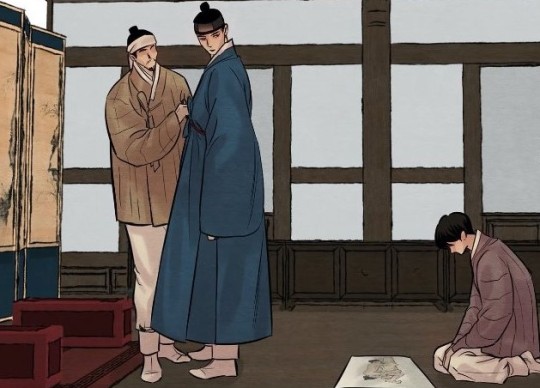
The crux of the issue is the social divide which separates Seungho and Nakyum I mentioned previously. During the whole scene the dynamic between the two men keeps constantly changing together with their literal positions in the room which symbolize their actual positions in the Joseon society and how those positions start to shift due to the feelings they have for each other. Seungho is almost unconsciously trying to bridge that divide by treating Nakyum more and more as his equal. It isn’t a deliberate behaviour on his part but instinctive. He sees the painter as his lover, therefore he treats him as his lover because, gradually, Nakyum’s social standing has ceased to matter to him. In the beginning, he had called him a lowborn very often, demeaning him, but he used it less and less until he almost stopped completely. The last time being when he got frustrated after Nakyum basically asked him to have rebound sex with him because Inhun had called him a prostitute. Thus, the ever-changing dynamic in this scene is the result of the nobleman trying to overcome the chasm which separates them and keeps him from being close to his young lover.
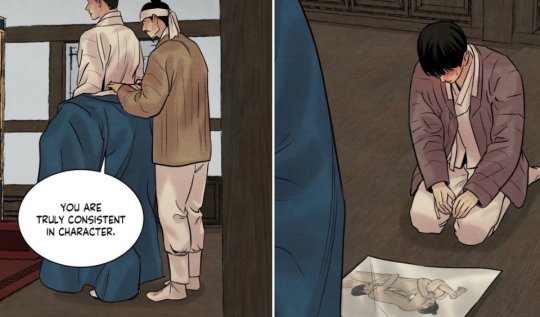
To start with, there is the mere fact that Nakyum is present during Seungho’s daily dressing ritual which is a deeply private and intimate affair usually only wives had the privilege and right to attend. However, a wife would never kneel in a position of subjugation on the hard floor at the far side of the room with her eyes lowered to the ground. And Seungho won’t have it because he is always observing Nakyum and never takes his eyes off him, noticing everything about him, including the painter’s blushing cheeks and the quiver of his lashes. So he starts to woo Nakyum even though it’s still only morning.
First, he lowkey informs him that he doesn’t fuck anyone else, basically telling him “I have only you. You are the only one for me.” in his own way, and then he proceeds to actually ADMIT that HE LOVES NAKYUM’S BLUSHES, he loves when Nakyum blushes because of him. He genuinely tries to put into words his appreciation and affection and show them to Nakyum, albeit clumsily. At first glance, it might seem as his typical, teasing remark but it’s not. In fact, it sounds like a shy but intimate and sincere confession.
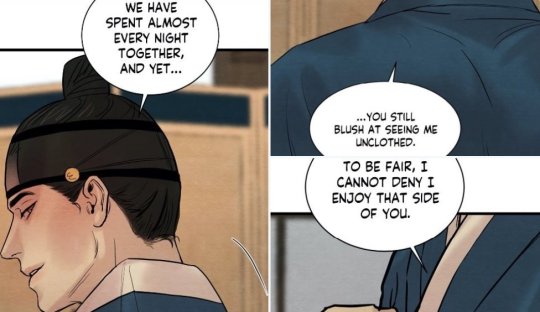
We don’t see Seungho’s face when he admits he likes seeing Nakyum blush, only his robe, and together with the split second when he ponders Nakyum’s question about his kindness, IT IS THE ONLY TIME SEUNGHO LOOKS AWAY FROM NAKYUM, other than that Seungho never takes his eyes off him. During these two fleeting moments he reveals his vulnerablity while, at the same time, trying to hide it by turning his back to Nakyum so the painter wouldn’t notice it. I love how Byeonduck doesn’t show his expressions to the readers during these moments, but still gives them visual clues to uncover the truth if they read between the lines and notice Seungho’s body language. It’s not about discovering the visible but about seeing the invisible, what is hidden in plain sight. The same narrative means is used to show Nakyum’s reaction to Seungho’s explanation why he’s been so kind to him: we only see his chin, never his eyes or facial expression in that moment.

Of course Seungho immediately guesses that Nakyum hasn’t eaten yet, because at this point he knows him that much, and moves fast to remedy the mistake, because he already cares about him that much.
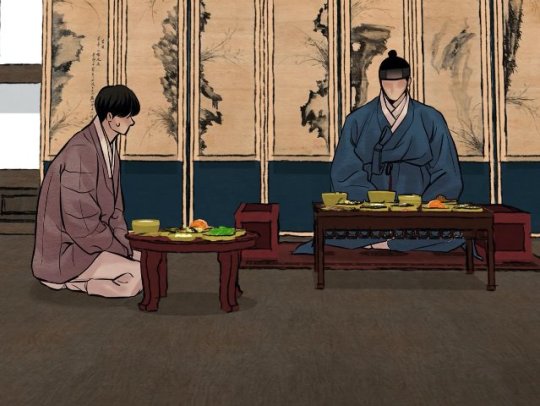
Talking about bridging the divide, when Seungho orders Nakyum’s meal to be brought along with his, he’s doing exactly that. Commoners don’t eat while sitting next to noblemen. It’s simply not done but that’s exactly what’s Nakyum doing now. At Seungho’s bidding, he moves from his kneeling position on the other side of the room to the nobleman’s side, making the distance between them smaller both literally and figeratively. He is sitting next to Seungho as his equal on a place which is reserved for honored guests, wives or family members.
What follows might be one of the most interesting pieces of dialogue in the entire chapter 47. Once again, we don’t see Seungho’s face, only the table with food which makes it appear as a mere small talk or an off-handed comment, but it isn’t. Being a manhwa, Painter of the Night lacks the acoustic mode therefore the reader has no way of finding out the tone, intonation or timbre of the character’s voice unless they see his facial expression. However, Byeonduck deliberately doesn’t show it to us at very particular moments. Those moments are rare but by hiding the facial expression, she paradoxically brings readers closer to the characters because suddenly, for a brief moment, they feel exactly like her characters: in those moments, the readers have no idea what is going thorough Seungho’s mind and what he really feels, in those moments they are at a loss, or misunderstanding or left guessing just like Nakyum is during the whole scene. In those moments, the readers are not all-knowing and can relate to Nakyum because they feel the same.

So when Seungho mentions the erotic painting, and you don’t take the red herring and dismiss it as his usual teasing, you suddenly realize there is a double meaning to his sentence. First, the noble never really ordered Nakyum to come to him with his paintings in the morning. Is it possible that the blushing Nakyum actually used that painting as an excuse to see Seungho? Especially after being so needy the previous night? He himself admits that he can’t go anywhere without him and it’s not like he has any friends in the Yoon household he could talk to. His answer clearly pleases the noble, thus his satisfied smirk. However, more imporantly, it shows that SEUNGHO WANTS FROM NAKYUM MORE THAN HIS BODY and is making a genuine, if inept effort, to tell him. He is basically saying:”I know you think of me as some sex-crazed maniac/deviant and I don’t deny I’m horny and crazy about your ass, but I am not a beast who wants to fuck you all the time. Even I crave closeness and affection and I want more from you than your painting and your body. So much more.”

When his food turns inedible and Nakyum turns to leave to take his meal in the kitchen, he isn’t trying to use it as an excuse to leave but does it out of consideration so he wouldn’t disturb the nobleman farther during his breakfast. However, judging from his slightly pained expression and instant reaction, it seems Seungho misunderstands Nakyum’s consideration for an unwillingness to spend time with him. The person he considers his lover is trying to leave him and it seems he would rather share his meal with servants in a dirty kitchen than spend time with him. That’s how he probably perceives it. There is also Nakyum’s reaction which is really telling. Previously, he would be scared and skittish if Seungho asked him a question like that, plus, he used to be noticebly uncomfortable in his presence. However, now, he is blushing and bashful but he doesn’t look frightened or uncomfortable. If anything, it’s as if he’s gained a shy confidence and learned to speak his mind with Seungho.

And then comes another shift as Seungho takes more steps to bridge the divide between him and Nakyum. Not only does he openly agree with Nakyum that he has never been a servant, he even admits that he himself DOES NOT CONSIDER HIM A SERVANT = “You’re not a servant. The servants are unworthy of you. You don’t belong in my kitchen. Your place is by my side.”
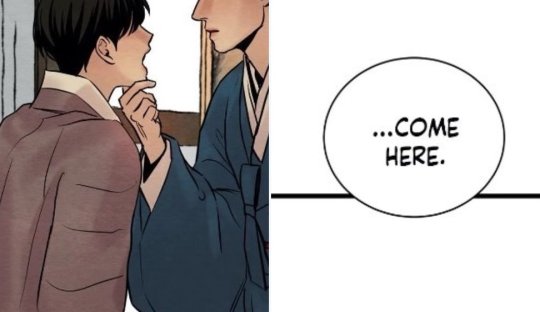
Following this interaction, Seungho suddenly says:”...come HERE.” What does the word “here” mean here? – “Come CLOSER. Come TO ME.” So once again, the distance that sepates them grows smaller, or rather, Seungho makes it smaller, reduces it until he can touch Nakyum and there is finallly no distance between them at all.

Some pictures are worth more than a thousand words. Seungho has used to claim that all he wanted from Nakyum were his paintings and sex, but now the gorgeous explicit painting of them copulating is left forgotten on the floor. Seungho doesn’t even spare it a glance, all his attention and thoughts belong to the real man in front of him. There is no ulterior sexual motive in the way he touches him or worries about his well-being. Thus, Seungho’s explanation that he keeps Nakyum to have sex with him and then portray it on canvas is the lamest excuse ever. And these open exhibits of physical affection and closeness that doesn’t lead to anything sexual have been appearing more and more.

This one image both showing them making love and their real selves completely lost in a world of their own perfectly illustrates all the dichotomy, nuance, emotions and complex issues that lie just below the surface. If the audience read Painter of the Night superficially, they will only see the “filthy” erotic painting, that is, only one dimension of the story and then they will disregard it as a whole, just like the servant who only sees the surface of the painting but not its beauty and feelings behind it, much less the growing love between its author and his master.

I already wrote I long piece about the way Seungho pampers Nakyum and goes out of his way to make sure that he isn’t injured, so I’m skipping this part. However, what no one talked about is how Seungho gives his place at the table to Nakyum because the significance of the gesture is huge, even more so in Joseon society where every piece of furniture and clothing denoted a person’s status and worth. That seat was reserved only for the master of the house and not even wives got to sit there. So once again Seungho makes the distance between him and Nakyum smaller as he gives Nakyum a privileged position, literally making him his equal by seating him on his place.
And it really is the sight of Nakyum being treated as Seungho’s equal rather than the erotic painting itself which causes the servant to dislike Nakyum so much. The painting is only a trigger. Because in the servant’s POV, here is a lowborn boy who is considered by the society even more lowly than himself but is treated better than noble wives. Nakyum has been elevated to a high position but he is left kneeling by his feet, collecting trash from the floor.

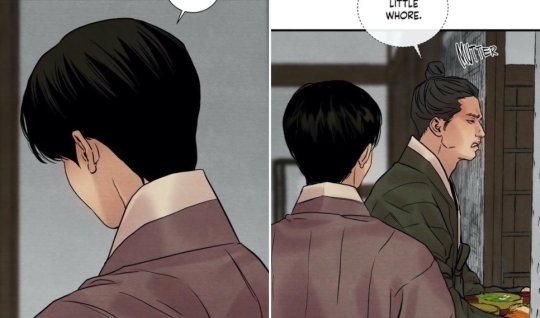
When Seungho tells Nakyum to leave it to the servant and eat, he basically publicly claims Nakyum as his equal and makes a distinction between him and the servant. It almost feels as if he were doing it on purpose, to show the servants what Nakyum’s position is, the same way he did when he ordered the kitchen maid that Nakyum was not to eat in the kitchen.
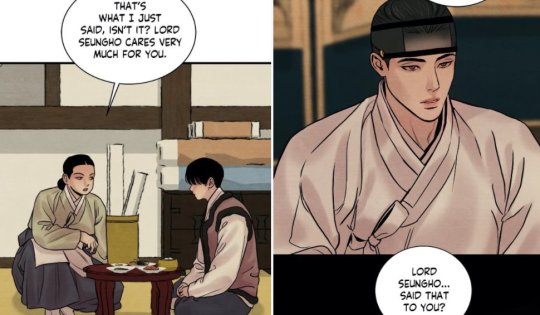
People often describe the servant as homophobic but that’s 99,9% of Joseon society. What is much more imporant here is that he is envious and bigoted. Because the main issue isn’t so much about the fact that Nakyum has been having gay sex with Seungho, but that he is a lowborn AND he actually does have any sex with SH since in that era having extramarrital sex was considered amoral. The truth is that had NK been a woman, the servant would have reacted the same. Also, if NK were a nobleman, the servant would never dare to even look him in the eyes, much less insult him in such a manner. So this really shows that one of the main obstacles which separates Seungho and Nakyum is the social divide between them.
And from them two, it’s Seungho who has the necessary means and power to bridge that gap and offer his hand to Nakyum, whereas Nakyum needs to have the courage and confidence to take that hand, hold it tight and never let go.

232 notes
·
View notes